This brief discusses the experiences of early career Black, Latina, and Afro Latina women in the trades. The COVID crisis has put a spotlight on the concentration of Black, Latina, and Afro-Latina women in low-wage jobs, including in many essential healthcare and retail jobs. The skilled construction trades have given many women an alternative to the poorly paid jobs in the service sector that many had to turn to before finding the trades. Skilled construction trades provide opportunities to build careers that are both challenging and fulfilling, pay a family sustaining wage with benefits, and can be accessed through ‘learn as you earn’ apprenticeships.
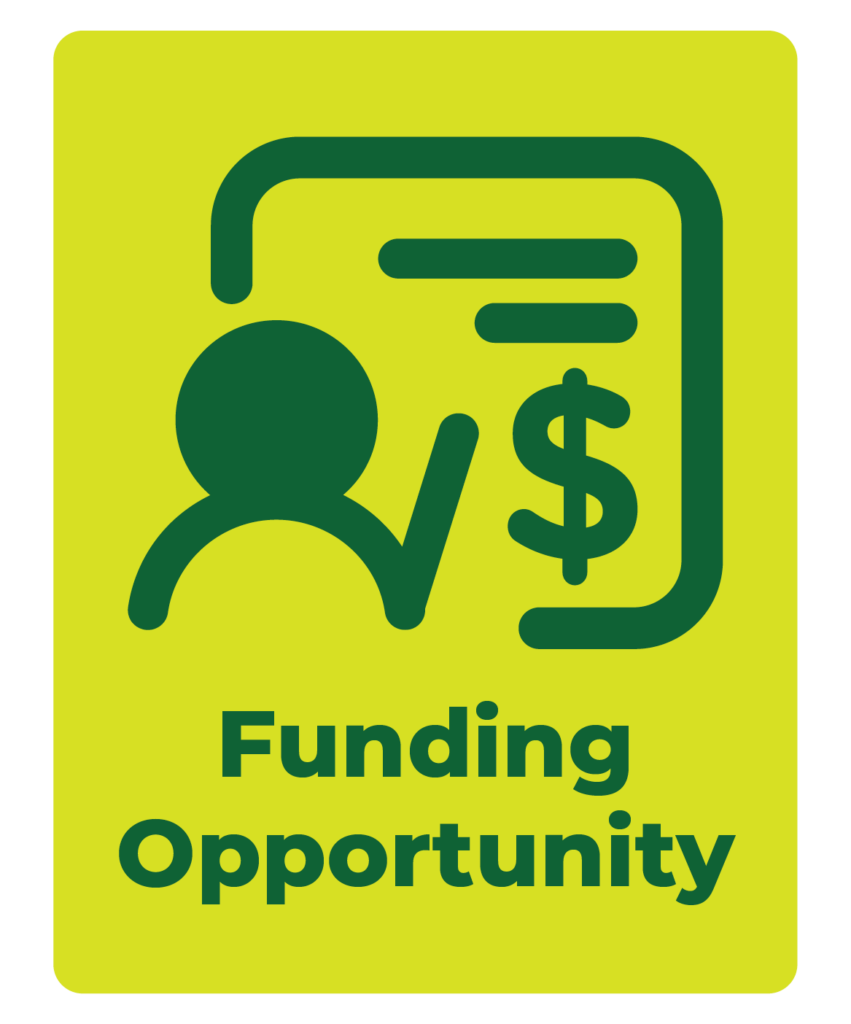
Future Ready Apprenticeship Center
Administering Agency: CareerWise
Closing Date for Applications: Friday, March 20, 2026
Funding Range: $200,00o per state
Geographic Scope: National
Description: With funding from the U.S. Department of Labor, CareerWise is launching the Future Ready Apprenticeship Center (the Center) in collaboration with the Colorado Department of Labor and Employment (CDLE) to support states in building state-level capacity to expand access to high-quality Registered Apprenticeships for youth aged 16-24. Selected states will receive customized consulting (intensive technical assistance), peer learning opportunities, and a total of $200,000 over 31 months (June 2026 – December 2028) to develop, implement and improve state plans that create systemic change in their ecosystems that enable expansion of youth access to registered apprenticeship programs.
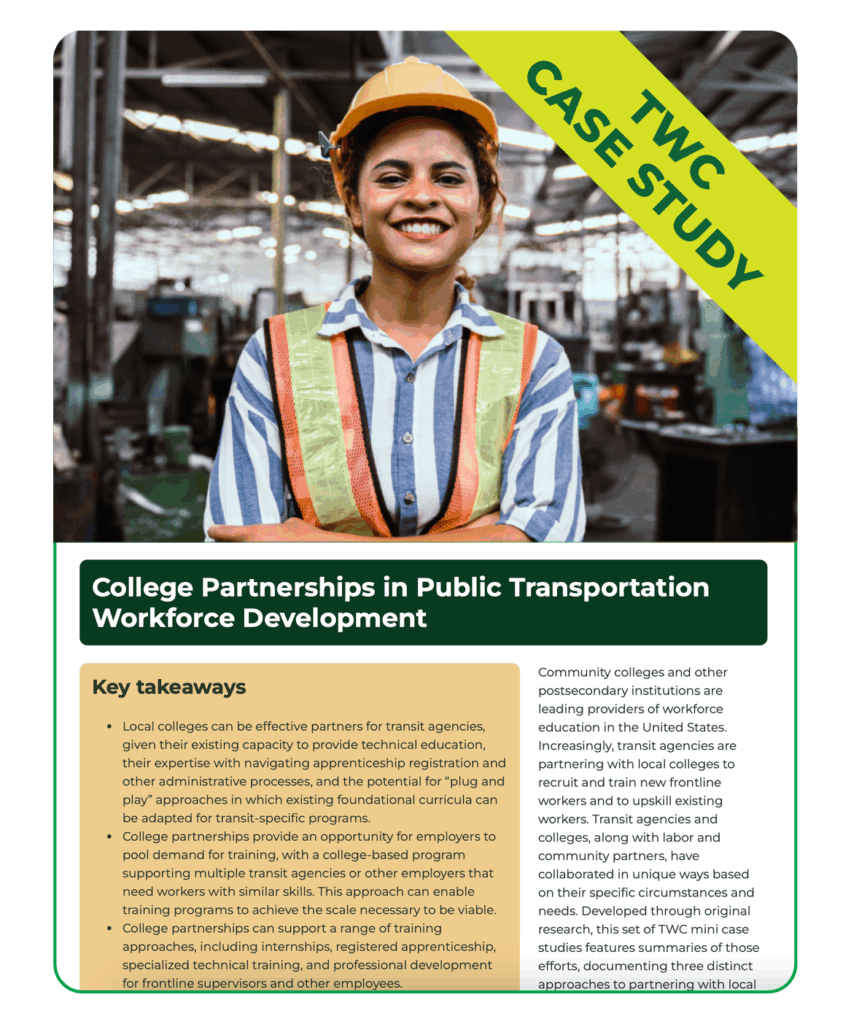
College Partnerships in Public Transportation Workforce Development
Community colleges and other postsecondary institutions are leading providers of workforce education in the United States. Increasingly, transit agencies are partnering with local colleges to recruit and train new frontline workers and to upskill existing workers. Transit agencies and colleges, along with labor and community partners, have collaborated in unique ways based on their specific circumstances and needs. Developed through original research, this set of TWC mini case studies features summaries of those efforts, documenting three distinct approaches to partnering with local colleges.
Transit Workforce Center
September 2025
TOPICS: Apprenticeship , Career Pathways , Community Engagement , Hiring and Recruitment , Training
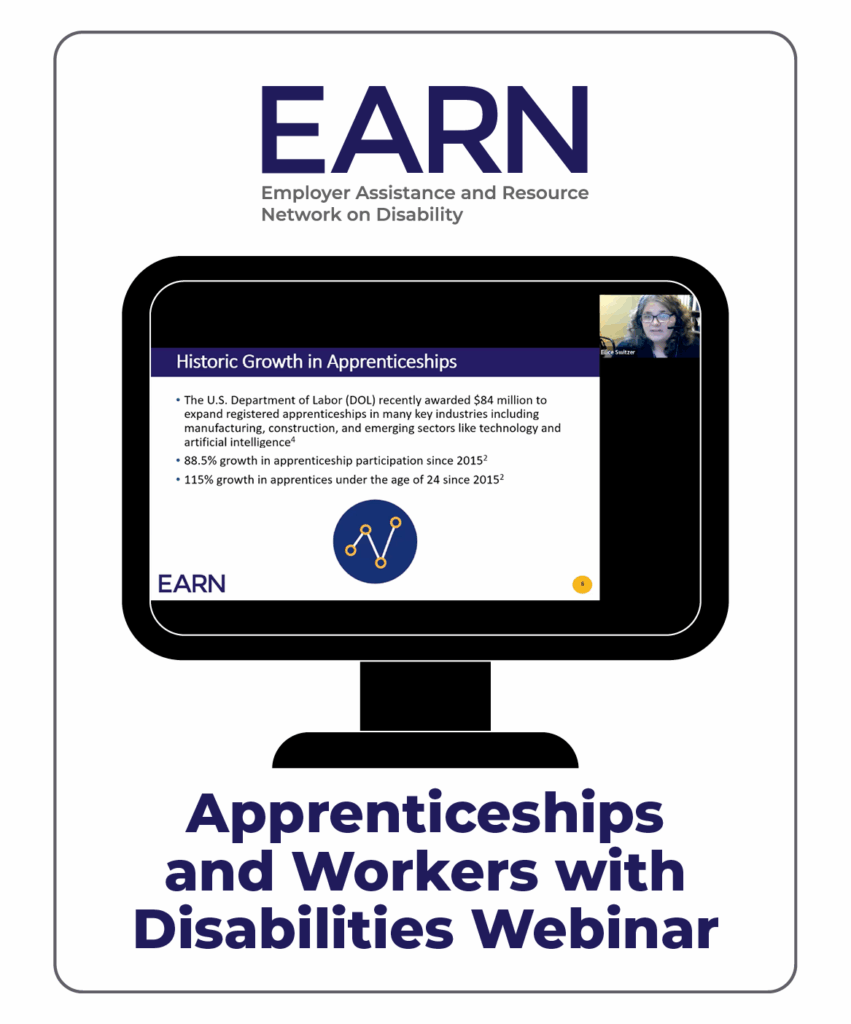
Apprenticeships and Workers with Disabilities Webinar
Employer Assistance and Resource Network on Disability
August 2025
Paid apprenticeships combine education and on-the-job training to prepare workers for long-term career success. By ensuring that all qualified candidates, including those with disabilities, have an opportunity to access apprenticeship opportunities, employers benefit from a broader pool of qualified workers. This webinar recording details practical strategies for recruiting and supporting apprentices with disabilities, as well as where to find recruitment resources and how to develop partnerships to build a talent pipeline. It also highlights a case example of a manufacturing business that credits its partnership with a local community-based organization serving jobseekers with disabilities with saving the local business.
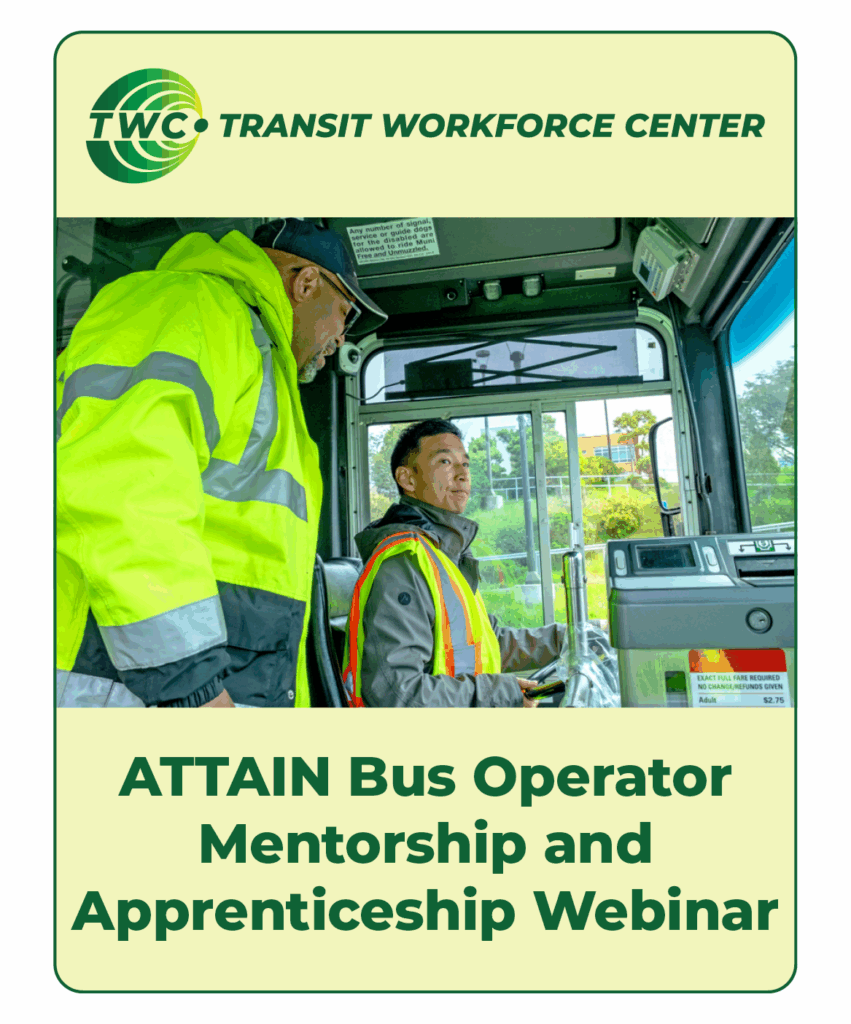
ATTAIN Bus Operator Mentorship and Apprenticeship Webinar
Transit Workforce Center
July 2025
This webinar featured presenters from Greater Richmond Transit Company (GRTC)/ATU Local 1220 in Virginia and Champaign-Urbana Mass Transit District (MTD) in Illinois.
- GRTC and ATU Local 1220 partnered to implement a mentorship program for their bus operators that launched in 2024. Presenters will describe that process, how the program has grown, and the benefits that it has provided.
- MTD launched its bus operator mentorship program in 2023 and has tracked metrics showing the program’s impact. Responding to both quantitative measures and qualitative feedback and observations, MTD is working to restructure the program to better meet the needs of the transit agency and the bus operators participating in the program as mentees or mentors.
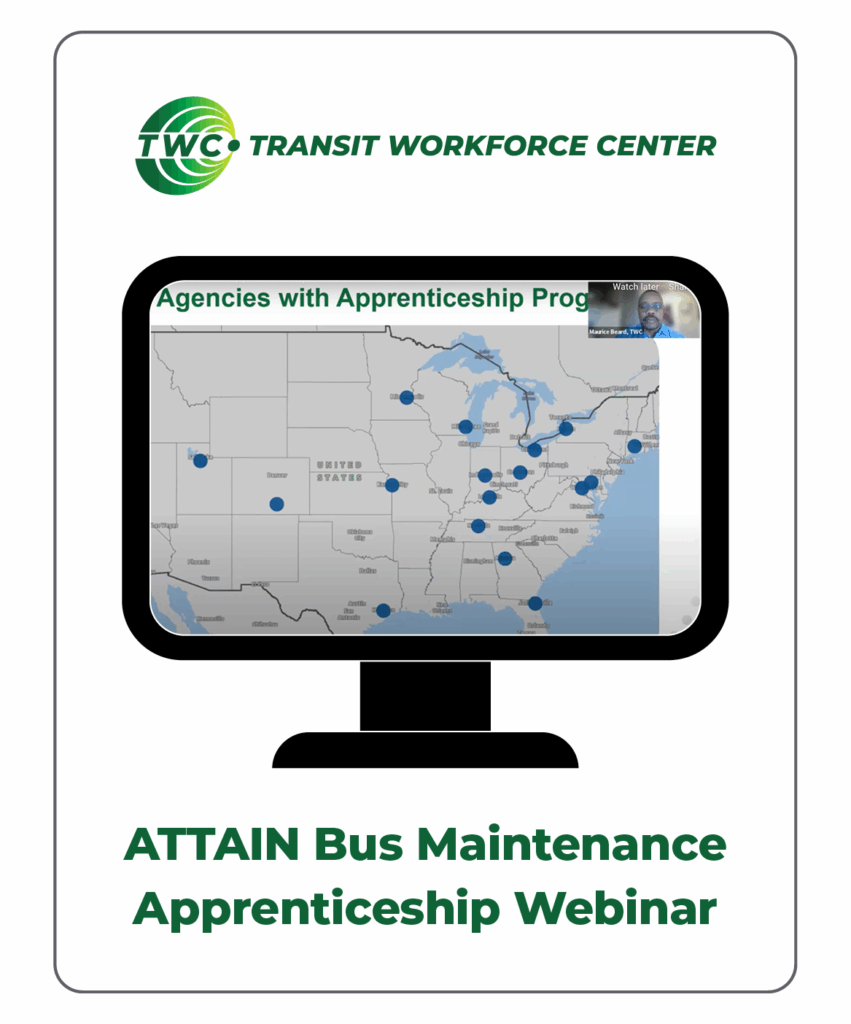
ATTAIN Bus Maintenance Apprenticeship Webinar
Transit Workforce Center
May 2025
This ATTAIN webinar focused on bus maintenance apprenticeship programs and featured Milwaukee County Transit System/Amalgamated Transit Union Local 998 and Jacksonville Transit Authority/International Association of Machinists and Aerospace Workers Lodge 759. Panelists from these transit agencies and labor unions outlined the development process and the final structure of their apprenticeship programs while highlighting how this strategy was implemented and why it works, offering benefits for both the agency and the workforce.
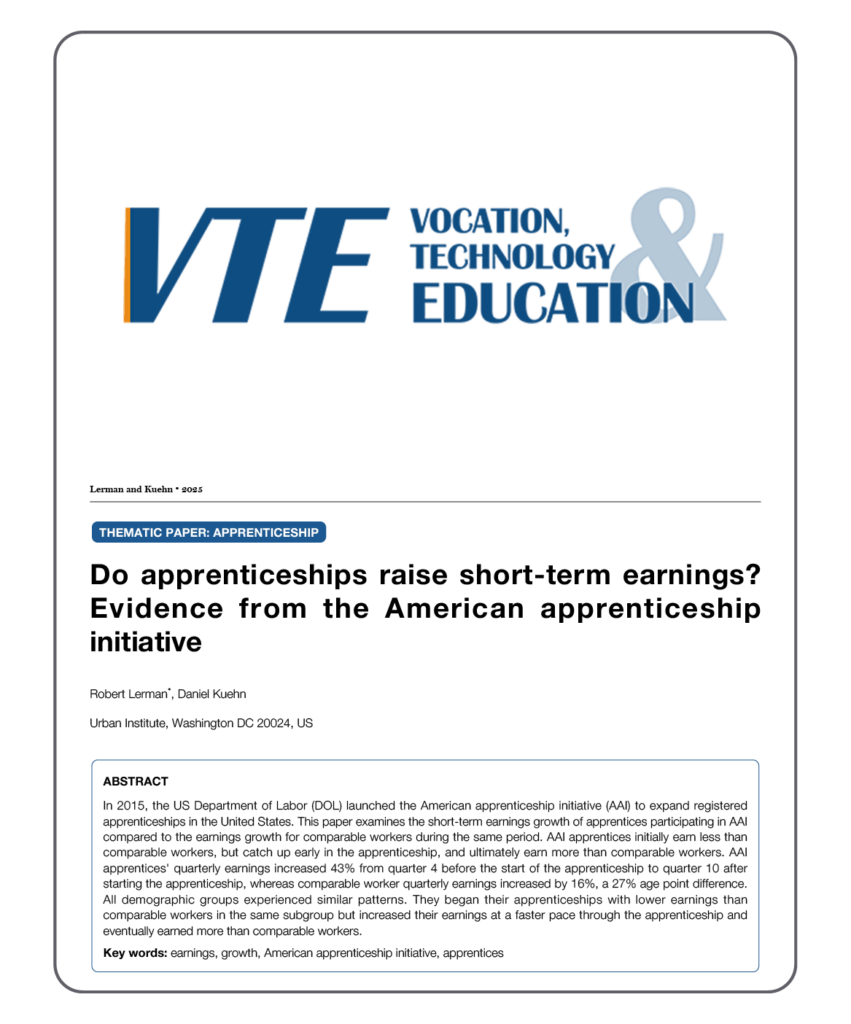
Do apprenticeships raise short-term earnings? Evidence from the American apprenticeship initiative
Vocat Tech Edu.
May 2025
TOPICS: Apprenticeship , Career Pathways , Community Engagement , Policy and Planning
This paper examines the short-term earnings growth of apprentices participating in the American apprenticeship initiative (AAI) compared to the earnings growth for comparable workers during the same period. Researchers found that AAI apprentices initially earn less than comparable workers, but catch up early in the apprenticeship, and ultimately earn more than comparable workers.
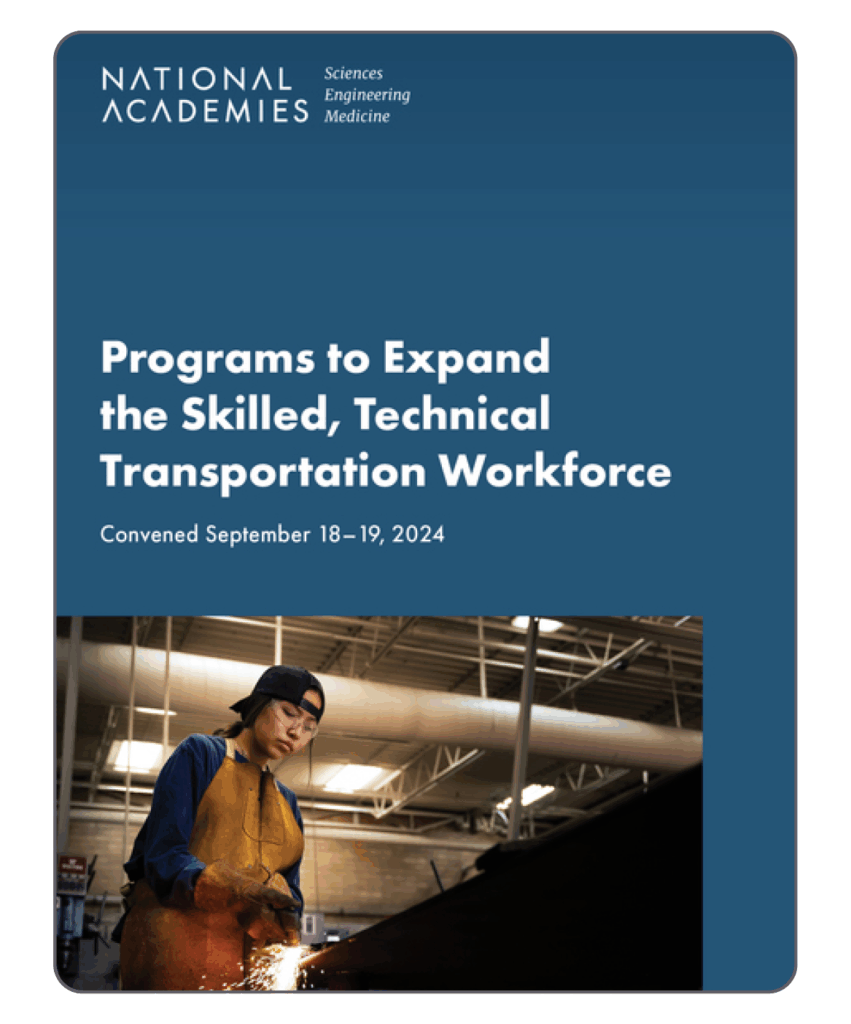
Programs to Expand the Skilled, Technical Transportation Workforce
Programs to Expand the Skilled, Technical Transportation Workforce: Proceedings of a Workshop summarizes the Workforce held in September 2024 at the National Academies of Sciences Building in Washington, DC. The workshop was sponsored by the Federal Transit Administration and the National Science Foundation and brought together experts and educators across academia, government, and industry.
National Academies of Sciences Engineering and Medicine
March 2025
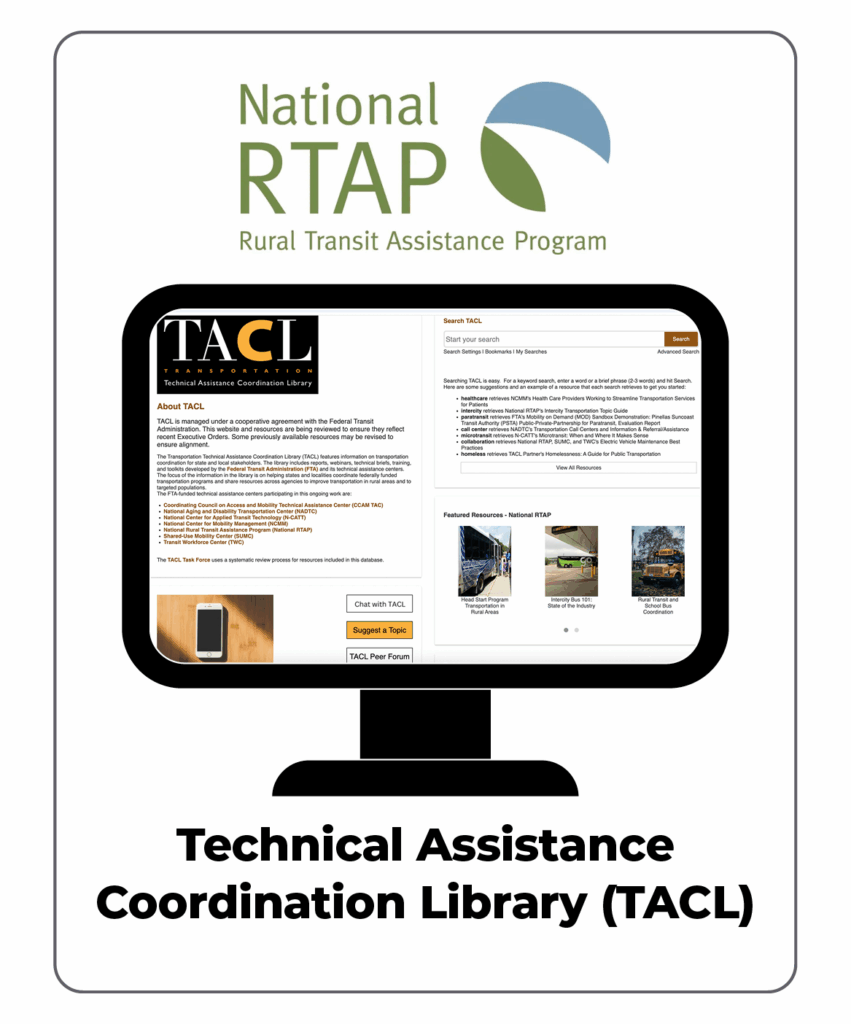
Technical Assistance Coordination Library (TACL)
National Rural Transit Assistance Program
TOPICS: Apprenticeship , Career Pathways , Community Engagement , Hiring and Recruitment , Labor-Management Partnerships , Low-No , Mentorship , Policy and Planning , Procurement , Program Evaluation and ROI , Retention , Safety and Health , Trainer and Mentor Development , Training , Workforce Shortage
Transportation Technical Assistance Coordination Library (TACL)
The Transportation Technical Assistance Coordination Library (TACL) provides a viable methodology and platform for access and findability of rural and tribal transit coordination resources across a broad range of transportation technical assistance centers and the Federal Transit Administration (FTA).
The FTA-funded Technical Assistance (TA) Centers participating in this ongoing work are:
- National Aging and Disability Transportation Center (NADTC)
- National Center for Applied Transit Technology (N-CATT)
- National Center for Mobility Management (NCMM)
- National Rural Transit Assistance Program (National RTAP)
- Shared Use Mobility Center (SUMC)
- Transit Workforce Center (TWC)
The TACL Task Force uses a systematic review process for resources included in the database. New resources will be added on a quarterly basis. Let us know if you would like to serve as a peer reviewer for our resources.
Why was TACL created?
The United States Government Accountability Office (GAO) published Public Transportation: Enhanced Federal Information Sharing on Coordination Could Improve Rural Transit Services in January 2020. GAO recommended that FTA “develop a communication plan that will effectively share information with state and local stakeholders on coordination opportunities in an accessible and informative way.” This effort was created to improve interagency resource coordination between FTA and its five TA Centers.
How can TACL be used?
TACL resources can be used to identify high quality technical assistance on transportation coordination. The resources can be used for research, training, practice, operations, planning, and other purposes. We encourage authors to cite TACL resources.
Ready to get started?
Visit http://transportation-tacl.org. Click on the Training tab at the top for instructions.
If you have a question about TACL, or if you would like to be considered to become a TACL peer reviewer, please contact info@nationalrtap.org
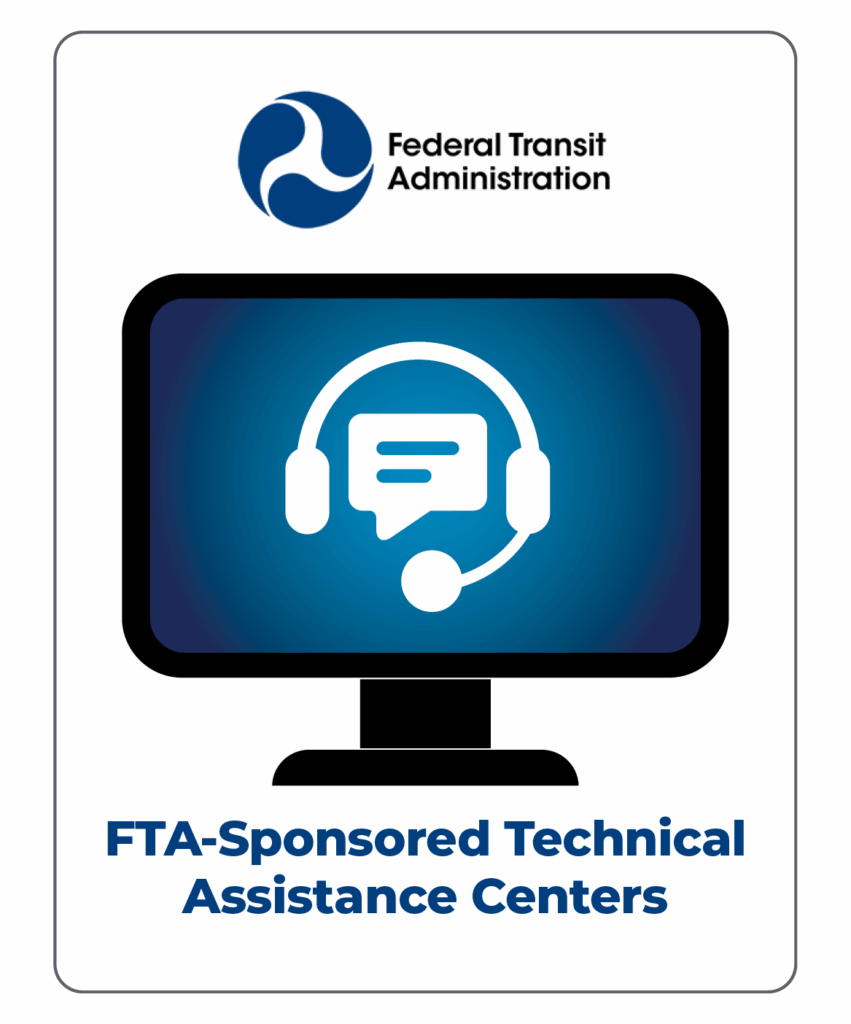
FTA-Sponsored Technical Assistance Centers
Federal Transit Administration
TOPICS: Apprenticeship , Career Pathways , Community Engagement , Hiring and Recruitment , Labor-Management Partnerships , Low-No , Mentorship , Policy and Planning , Procurement , Program Evaluation and ROI , Retention , Safety and Health , Trainer and Mentor Development , Training , Workforce Shortage
FTA’s Technical Assistance and Workforce Development Program (49 U.S.C. § 5314) and the Public Transportation Innovation Program (49 U.S.C. § 5312) fund technical assistance centers through national nonprofit organizations across a number of areas to improve public transportation. These nonprofit partners and the work they do play a critical role in supporting public transit agencies. Their services help to:
- Improve transportation for older adults and people with disabilities
- Drive the adoption of mobility management and related promising practices
- Accelerate innovative mobility practices and strategies
- Support rural communities
- Leverage new transit technologies
- Train the public transit workforce
- Provide workforce development technical assistance
- Support research projects chosen by the transit industry that address day to day issues
- Support the transit industry meet safety regulations
National Center for Applied Transit Technology (N-CATT)
The National Center for Applied Transit Technology (N-CATT) delivers expert, focused technical assistance to transit agencies and organizations in rural areas and small cities to use or develop transit technologies and innovations that make services more cost-effective and efficient. N-CATT’s work supports FTA’s mission and focus on innovation by developing and supporting transit programs and services in rural and small-city America.
National Aging and Disability Transportation Center (NADTC)
The National Aging and Disability Transportation Center (NADTC) is a national technical assistance center funded by FTA with guidance from the U.S. Department of Health and Human Services’ Administration for Community Living to promote the availability of transportation options that serve the needs of people with disabilities, seniors and caregivers with a focus on the Section 5310 program and other transit investments. NADTC supports the delivery of more effective, efficient, high-quality and coordinated specialized transportation services that maximize federal investments. NADTC provides technical assistance, information and referral; develops field training; implements interactive communication and outreach strategies; and supports communities in assessing their needs and developing innovative transportation solutions.
National Rural Transit Assistance Program (National RTAP)
The National Rural Transportation Assistance Program (RTAP) was established by FTA in 1987 to provide a wide range of professional services and products. National RTAP addresses the training and technical assistance needs of rural and tribal transit programs across the nation and supports state RTAP programs. National RTAP provides comprehensive free technical assistance programs and resources including training materials, webinars, newsletters and technical briefs, peer resources, research, and innovative technology initiatives. The National RTAP also manages the Transportation Technical Assistance Coordination Library (TACL), which provides a sustainable methodology and platform to access resources across a diverse range of transportation technical assistance centers and FTA.
Shared-Use Mobility Center (SUMC)
The Shared-Use Mobility Center is a public-interest organization dedicated to achieving equitable, affordable, and environmentally sound mobility across the US through the efficient sharing of transportation assets. By connecting the public and private sectors, piloting programs, conducting new research, and providing policy and technical expertise to cities and regions, SUMC seeks to extend the benefits of shared mobility for all. The Shared Mobility 2030 Action agenda includes improving access to public transit, on-demand shuttles or buses, ride-on-demand services, carpooling and vanpooling, and carsharing, bikesharing and scooter-sharing.
Coordinating Council on Access and Mobility (CCAM)
The strategic goal of CCAM, operated but the Community Transportation Association of America, is to support federal agencies, their grantees, partners, and stakeholders in improving transportation access for people with disabilities, older adults, and individuals of low income. CCAM promotes and facilitates human services transportation, public transit, and non-emergency medical transportation (NEMT) coordination that advances people’s access to everyday destinations.
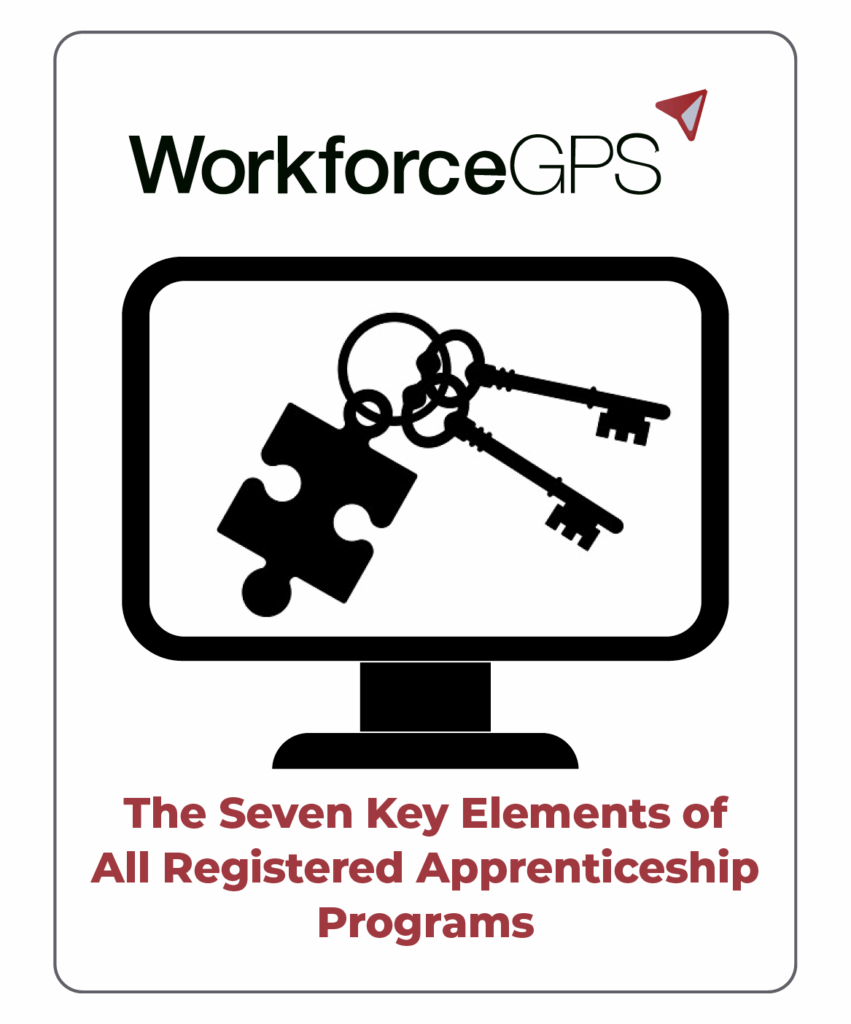
The Seven Key Elements of All Registered Apprenticeship Programs
Workforce GPS
January 2025
TOPICS: Apprenticeship , Career Pathways , Trainer and Mentor Development , Training
Registered Apprenticeship is an industry-driven pathway to high-quality careers where employers can develop and prepare their future workforce, and individuals can obtain paid work experience; progressive wage increases; classroom instruction; and a portable, nationally recognized credential. The U.S. Department of Labor recently updated the way we describe Registered Apprenticeship Programs to reflect the worker safety elements embedded in those programs.
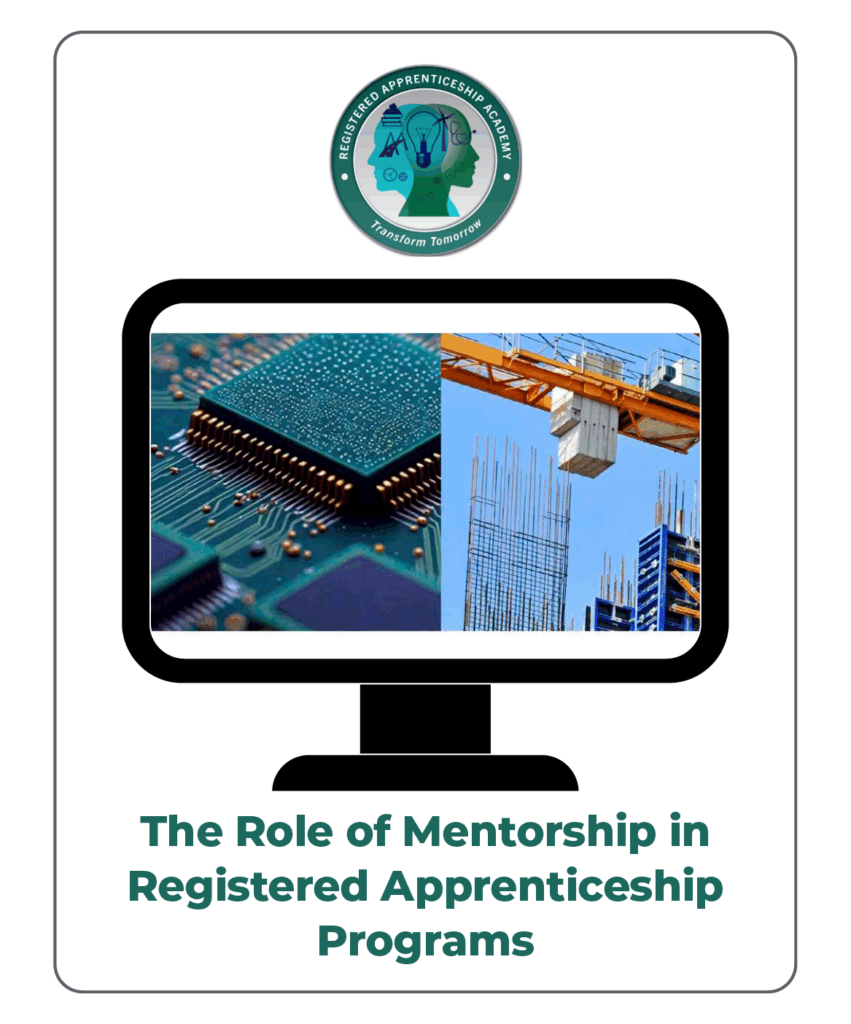
The Role of Mentorship in Registered Apprenticeship Programs
Registered Apprenticeship Academy
January 2025
TOPICS: Apprenticeship , Mentorship , Trainer and Mentor Development , Training
This E-learning module introduces how mentorship is essential to registered apprenticeship programs. Best practices for selecting, training, and supporting mentors are included to support registered apprenticeship program sponsors and participating employers. The objectives for this course are:
- Identify the responsibilities of sponsors to provide mentorship.
- Describe the role of mentors.
- Recognize why mentorship is important to a successful registered apprenticeship program.
- Employ strategies for mentorship to create a culture of support and guidance for workers throughout their registered apprenticeship.
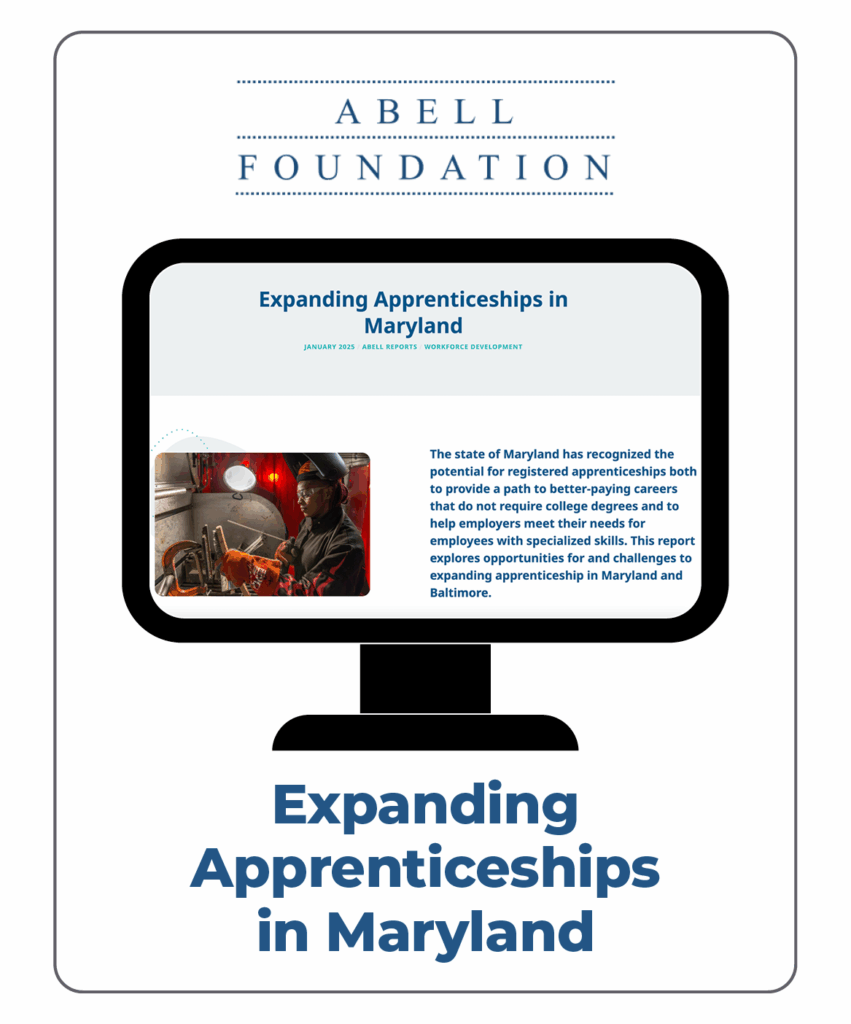
Expanding Apprenticeships in Maryland
The state of Maryland has recognized the potential for registered apprenticeships both to provide a path to better-paying careers that do not require college degrees and to help employers meet their needs for employees with specialized skills. This report explores opportunities for and challenges to expanding apprenticeship in Maryland and Baltimore.
Abell Foundation
January 2025
TOPICS: Apprenticeship , Career Pathways , Community Engagement , Policy and Planning
The report includes topics such as overcoming barriers to participation, such as transportation and childcare; countering employer misconceptions about apprenticeship; supporting apprenticeship in non-traditional sectors; and improving data collection and analysis.
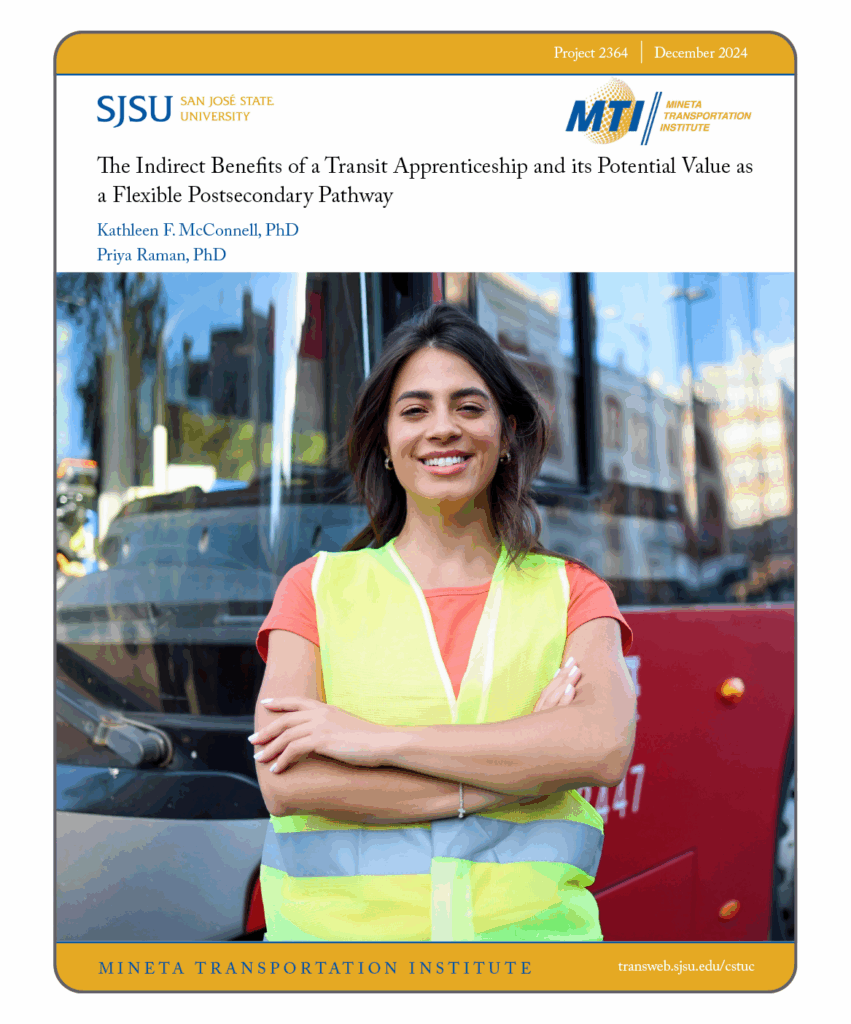
The Indirect Benefits of a Transit Apprenticeship and its Potential Value as a Flexible Postsecondary Pathway
As apprenticeships become more prevalent in the transit industry, they can also emphasize both technical and soft skills to invest in career advancement. This can attract young people to transit careers, which helps address challenges with recruitment and an aging workforce. Santa Clara Valley Transportation Authority’s Joint Workforce Initiative (JWI) employs this model by formally recognizing skills acquisition with accredited certificates. This study explores the JWI’s strengths within the revival of non-degree credentials fueled by efforts like the California Guided Pathways Program. Drawing on guidelines for connecting job training with degree programs, the study details the importance of affordability, portability, and articulation and outlines how these features could be further developed in the JWI.
Mineta Transportation Institute
December 2024
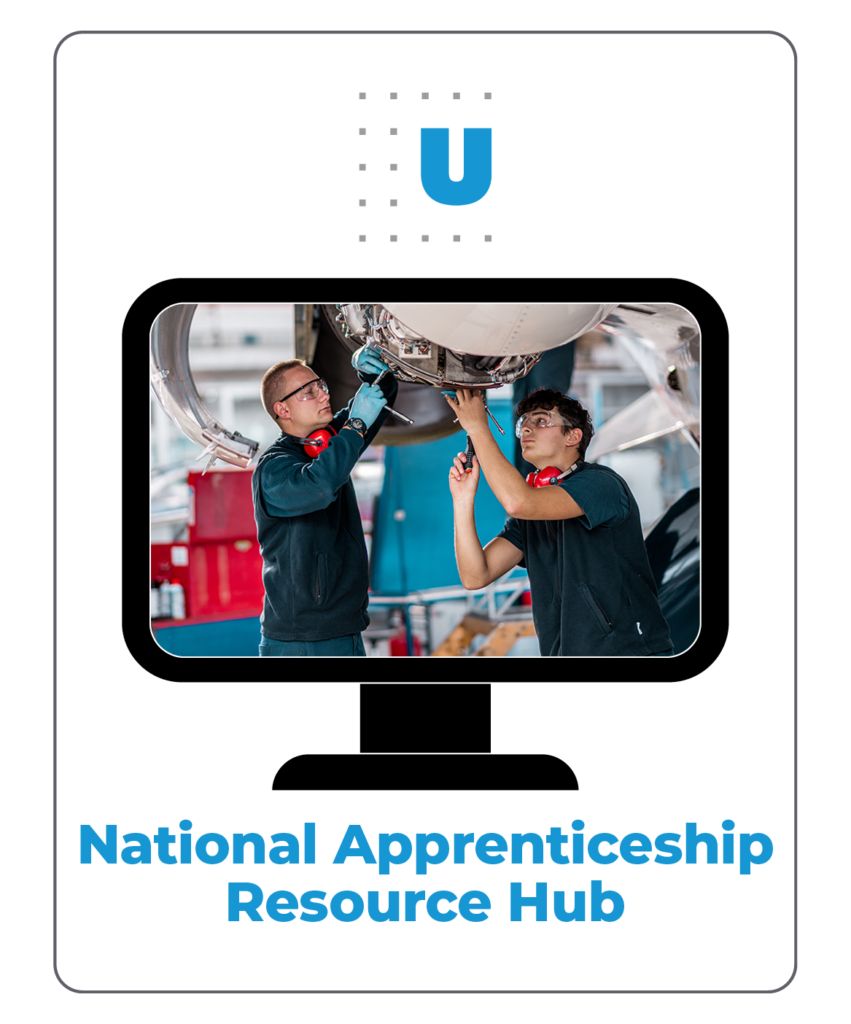
National Apprenticeship Resource Hub
The Urban Institute
December 2024
TOPICS: Apprenticeship , Career Pathways , Trainer and Mentor Development , Training
The National Apprenticeship Resource Hub includes Occupational Frameworks which can help develop a new apprenticeship program or refine an existing program. Each framework outlines the basic information sponsors need to register an apprenticeship program in their occupation including an occupational overview that describes the occupation, alternative job titles, and any prerequisites; a work process schedule that outlines what organizations can expect apprentices to learn on the job and the required hours; and a related technical instruction outline that presents considerations for courses and training apprentices can pursue during the apprenticeship. The National Occupational Frameworks also include detailed instructions on how to use them when creating your registration application.
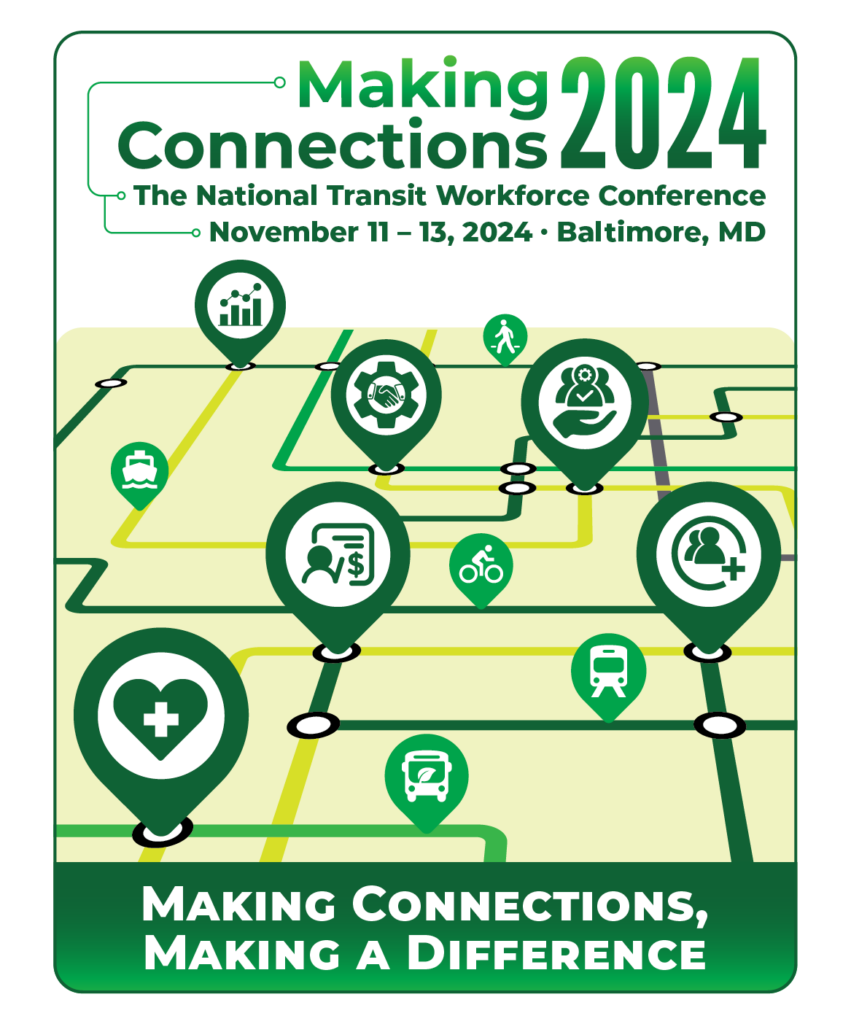
Making Connections 2024 – The College Connection: Strategies for Effective Partnerships
This session about partnerships between transit and local colleges was presented as part of TWC’s Making Connections 2024 transit workforce conference in November, 2024.
Transit Workforce Center
November 2024
Session Description: Strong partnerships between transit and local colleges across the country currently support recruitment, retention, apprenticeships and other career advancement initiatives developed by agencies and their workforce partners. Presenters in this session reviewed and discussed several different models of industry-education partnerships, focusing on how to establish productive working relationships with local colleges to advance workforce development goals.
Moderator:
- Patricia Greenfield: Senior Director, Workforce Education – International Transportation Learning Center / Transit Workforce Center
Speakers:
- Jamaine “G” Gibson: Director of Apprenticeships and Workforce Development – Amalgamated Transit Union
- Jason Abbott: Executive Director, Workforce Operations – Cuyahoga Community College
- Celeste Chavis: Interim Chair and Professor, Transportation & Urban Infrastructure Studies – Morgan State University (Baltimore)
- Rich Diaz: Workforce Development Coordinator – Amalgamated Transit Union Local 1575
- Rob Gamble: Sr Workforce and Academic Strategist – California Transit Works!

Making Connections 2024 – How Do Technicians Learn? Exploring Successful Approaches for Developing Skills
This session about training transit technicians was presented as part of TWC’s Making Connections 2024 transit workforce conference in November, 2024.
Transit Workforce Center
November 2024
TOPICS: Apprenticeship , Low-No , Making Connections Conference , Mentorship , Training
Session Description: This session delved into the most effective methods for training technicians to maintain today’s fleets of complex technology. We focused on proven strategies, such as starting with the fundamentals and progressing to hands-on training. Additionally, we discussed the value of mentorship and apprenticeship to facilitate the retention of the trained frontline workforce.
Moderator:
- Jason Macumber: Senior Advisor of Workforce Development and Technology – International Transportation Learning Center / Transit Workforce Center
Speakers:
- Russell Anderson: Director Bus Maintenance Training – California Transit Works!
- Staci Hanna: Maintenance Training Manager – TriMet
- Brian Markey: Chief Executive Officer – Custom Training Aids Inc.

Making Connections 2024 – Apprenticeship 101 – How Transit Apprenticeship Operates
This session about transit apprenticeships was presented as part of TWC’s Making Connections 2024 transit workforce conference in November, 2024.
Transit Workforce Center
November 2024
Session Description: Apprenticeship programs are rapidly expanding at transit locations across the country. With quality training tied to clearly-identified career ladders and advancement, these programs are commonly regarded as the “gold standard” of workforce development. Documented benefits include increased retention, reductions in absenteeism, and the creation of a sustainable talent pipeline. These programs also result in better employee morale and a more engaged workforce. In this session, presenters walked through the essential steps to developing, registering, and implementing an apprenticeship program. Attendees heard from and engaged with transit labor and management about their joint programs including bus maintenance, traction power, HVAC/facilities, and signals/communications—and explore how to locate and access resources to support new and existing programs.
Moderator:
- Brian J. Turner: Founding Director – International Transportation Learning Center
Speakers:
- Michelle Allison: General Manager – King County Metro (WA)
- Maurice Beard: Senior Workforce Development Advisor –
- Norman Blessant: Financial Secretary/Treasurer – Amalgamated Transit Union Local 381 (UT)
- Rod Dunn: President – Amalgamated Transit Union Local 382 (UT)
- Brandee Gross: Program Manager, Workforce Development – Maryland Department of Transportation
- Dimas Koral-Arocho: Program Manager – King County Metro (WA)
- Stephanie Lewis: Workforce Development Project Manager – Center for Urban Transportation Research
- Kylee Parker: Shop Steward/Joint Apprenticeship Committee Chairman – Amalgamated Transit Union Local 1300 (MD)
- Jeff Stambaugh: Vice President – Amalgamated Transit Union Local 587 (WA)
- Greg Woodfill: President – Amalgamated Transit Union Local 587 (WA)
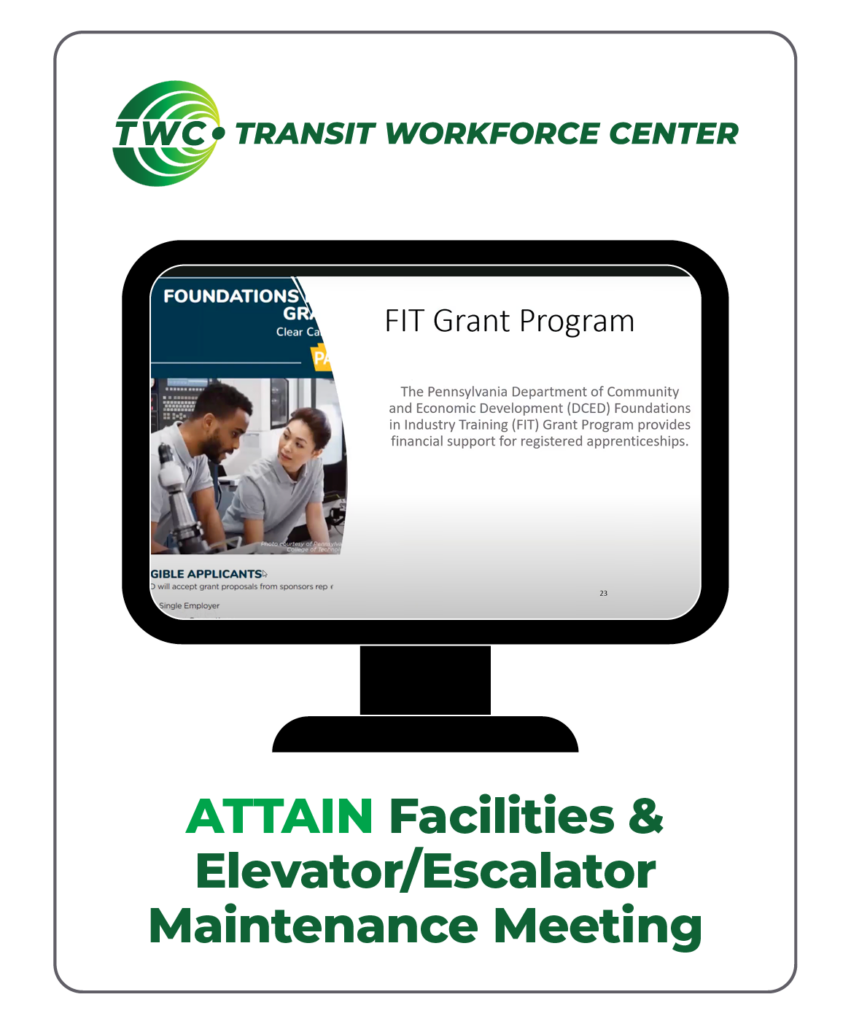
ATTAIN Facilities & Elevator/Escalator Maintenance Meeting
Transit Workforce Center
September 2024
The American Transit Training and Apprenticeship Innovators Network (ATTAIN) is a peer network created for transit agencies and labor unions to explore new apprenticeship programs or enhance existing programs for their frontline workforce. Through ATTAIN, TWC promotes apprenticeship, advances frontline worker training, facilitates peer exchange, and provides technical assistance to agencies and unions interested in developing apprenticeship programs for their frontline workforce.
This ATTAIN meeting featured discussions from Pittsburgh Regional Transit/ATU 85 and Bay Area Rapid Transit about how their facilities and elevator/escalator maintenance apprenticeship programs are developed, work, and the benefits they offer.
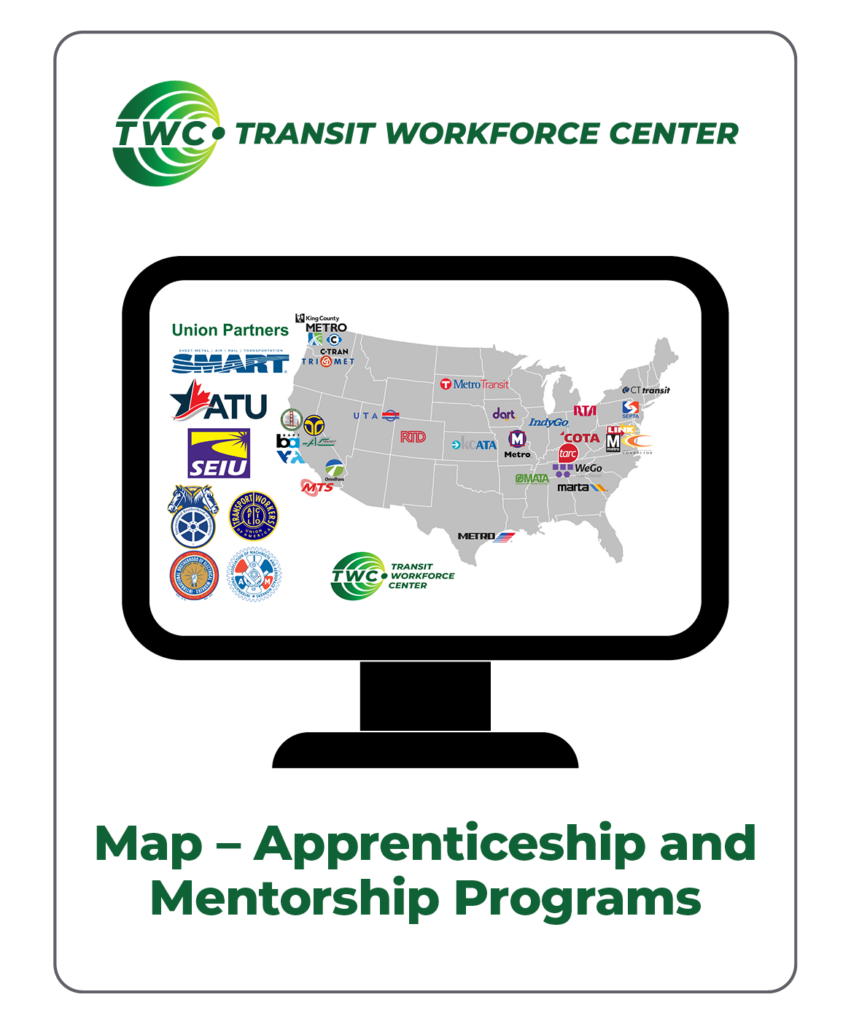
Map – Apprenticeship and Mentorship Programs
Visualizing the Growing Trend of Registered Apprenticeship in U.S. Transit Agencies
Over the past 10 years, the U.S. Department of Labor (DOL) and other federal agencies have invested heavily in promoting and supporting registered apprenticeship, resulting in a significant expansion of registered apprentice programs across the country. Likewise, the use of registered apprenticeship for frontline public transit occupations has increased significantly, with many transit agencies and their corresponding unions jointly adopting labor-management standards that create a framework for apprenticeship. Only five transit agencies had a registered apprenticeship program in 2013, compared with 30 transit agencies in 2023.
This map displays transit locations with registered apprenticeship or mentorship programs. Users can reveal information about the active apprenticeship/mentorship programs at each agency, the agency’s workforce-related statistics (such as wage, employee count, labor hours, and ridership), and links to Standards of Apprenticeship, which include details about qualifications, wages, hours, and training schedules.
Transit Workforce Center
September 2024
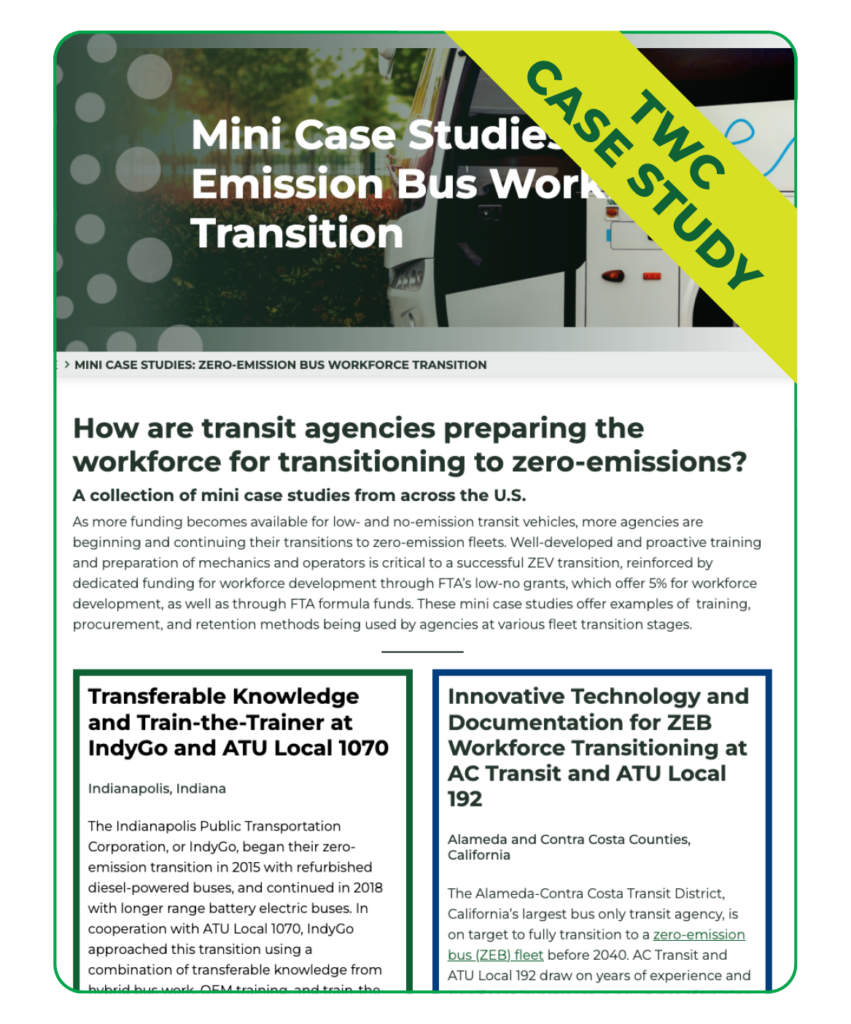
Mini Case Studies: Low-No Workforce Transition
Transit Workforce Center
August 2024
TOPICS: Apprenticeship , Low-No , Trainer and Mentor Development , Training
In the past decade, the number of hybrid, battery-electric, and hydrogen fuel cell buses has increased substantially across the U.S., particularly as transit locations have made use of FTA’s Low-No grant program. Well-developed and proactive training and preparation of technicians and operators is critical for a successful transition to new vehicle technologies; maintaining and operating newly procured vehicles effectively is necessary for fleet reliability and efficiency. Transit locations have supported training and other initiatives through FTA’s Low-No grants, which offer 5% for workforce development, as well as through formula funds. These mini case studies offer examples of training, retention, and procurement methods being used by transit agencies to support new fleet technologies.
- Foundational Skills and Technician Engagement at Champaign-Urbana Mass Transit District
- Bringing Training In-House at Mountain Line and Teamsters Local 2
- Transferable Knowledge and Train-the-Trainer at IndyGo and ATU Local 1070
- Innovative Technology and Documentation for Workforce Transitioning at AC Transit and ATU Local 192
- Training Operators Through Pre-Apprenticeship, Apprenticeship, and Mentorship at Golden Gate Transit and ATU Local 1575
- Frontline Worker Involvement in Vehicle Procurement at SporTran and ATU Local 588
- Midwest Hydrogen Center of Excellence at SARTA and AFSCME Local 1880
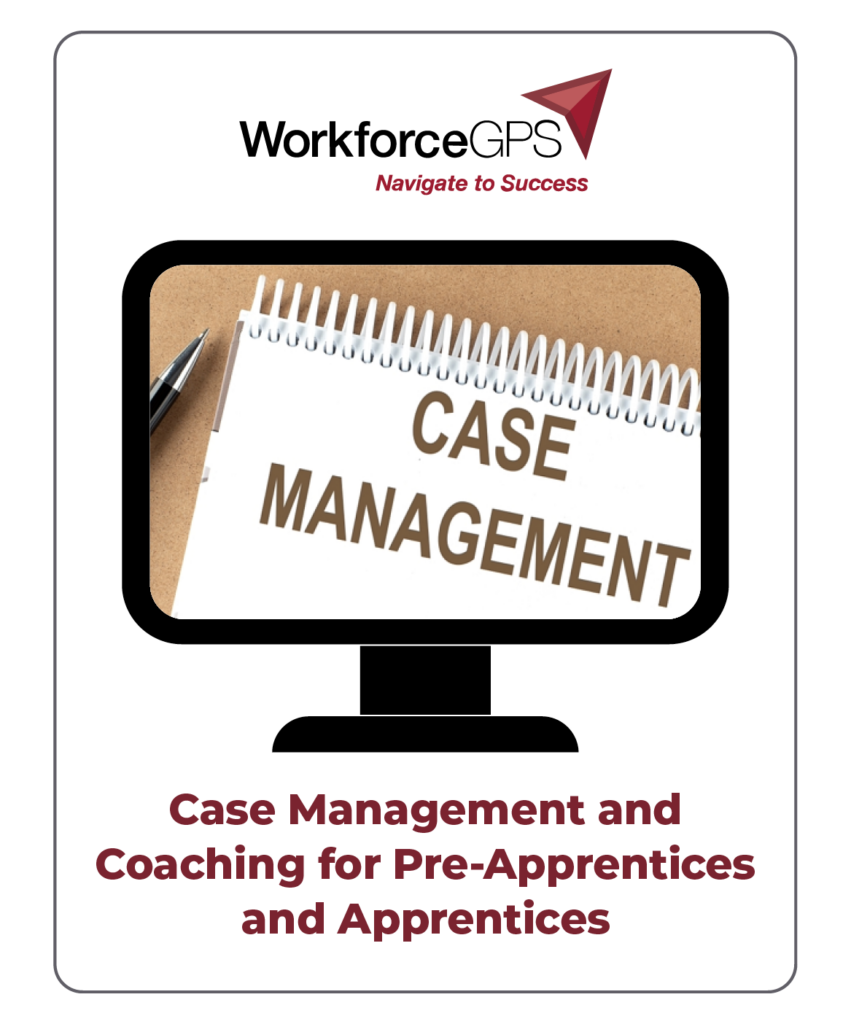
Case Management and Coaching for Pre-Apprentices and Apprentices
Workforce GPS
August 2024
TOPICS: Apprenticeship , Career Pathways , Mentorship , Trainer and Mentor Development , Training
Working with pre-apprentices and apprentices requires a combination of case management and coaching. This webinar provides the fundamentals of case management and coaching and teaches a framework for effective service delivery. This session also focuses on the use of assessments for productive service planning, quality program documentation and team communication for successful handoffs.
MODERATOR(S)
- Luis Roig, Contracting Officer’s Representative, Office of Apprenticeship, U.S. Department of Labor Employment and Training Administration
PRESENTER(S)
- Amy Landesman, Grantee Coach, ICF
- Valerie Taylor, Grantee Coach, ICF
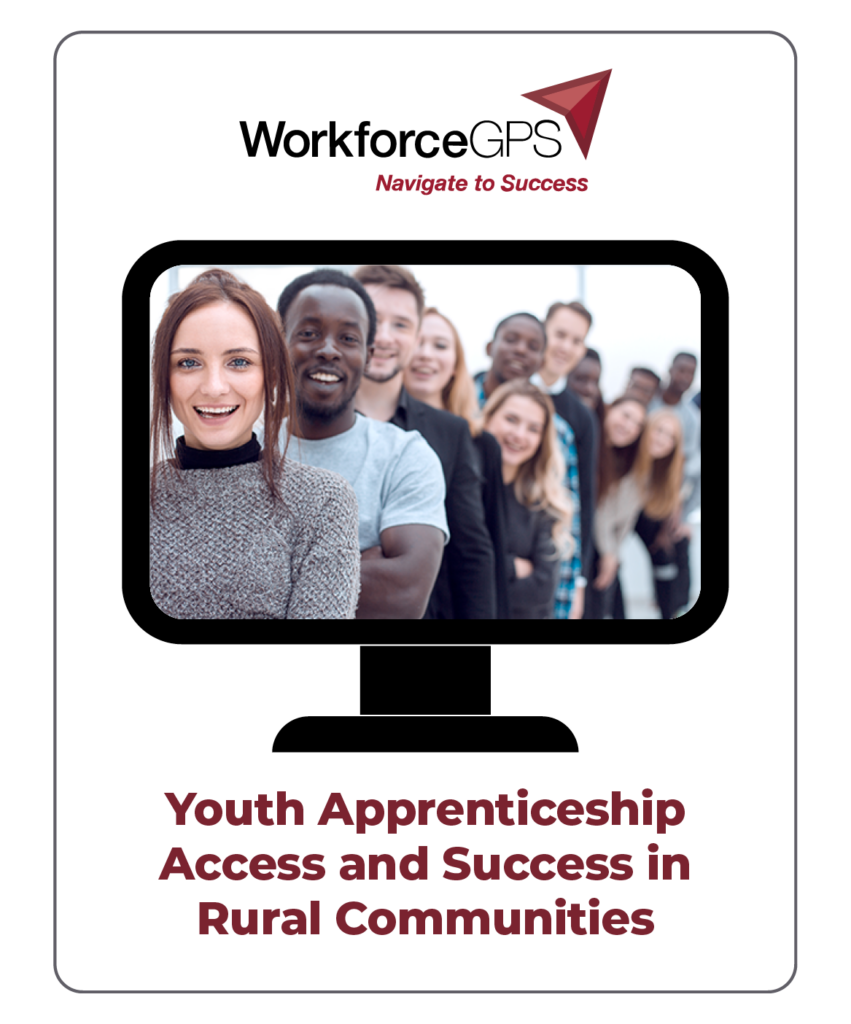
Youth Apprenticeship Access and Success in Rural Communities
WorkforceGPS
August 2024
In rural communities, widely dispersed populations face a multitude of access challenges. Faced with a declining talent pool, lower educational attainment, and rising poverty rates caused by the Covid-19 pandemic, there is an urgent need to prepare young people in rural areas for high-demand careers.
As part of the Implementing Workforce Programs for Rural Youth series, this webinar, hosted by the Office of Apprenticeship, focused on best practices and creative solutions for increasing pre-apprenticeship and youth apprenticeship access, enrollment, retention, and program completion for young people in rural areas. Featured youth apprenticeship intermediaries and partners shared their accomplishments in developing youth apprenticeship opportunities in rural areas, establishing networks of support, and best utilizing available resources to ensure pre-and youth apprenticeship success.
MODERATOR(S)
- Maisha Meminger, Manpower Analyst , Division of Youth Services, U.S. Department of Labor, Employment and Training Administration
PRESENTER(S)
- Vanessa Bennett, Associate Director, Center for Apprenticeship & Work-Based Learning, Jobs for the Future
- Zach Boren Senior Policy Program Manager, Urban Institute
- Bhavani Arabandi, Senior Research Associate, Urban Institute
- Jacqueline Rayfield, Policy Analyst, Urban Institute
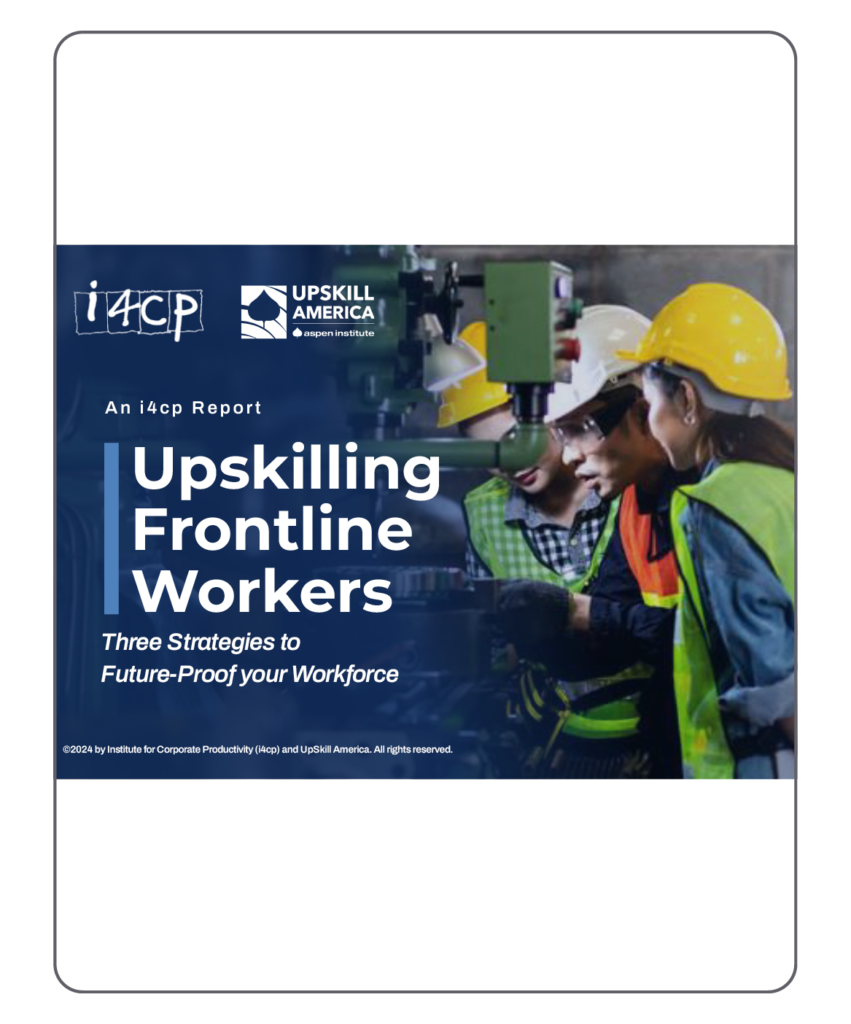
Upskilling Frontline Workers: Three Strategies to Future-Proof your Workforce
UpSkill America & Institute for Corporate Productivity (i4cp)
TOPICS: Apprenticeship , Career Pathways , Trainer and Mentor Development , Training
The rapid advancement and proliferation of technology increases the need for accelerated and continuous workforce development. Prioritizing the upskilling of frontline workers requires a variety of educational programs, and there is no single answer to the upskilling challenge. Still, UpSkill America and the Institute for Corporate Productivity (i4cp) created this report of best practices that can help any organization become more productive and resilient via a skilled workforce.
Read the brief to learn more about next practices in upskilling, including internal training, apprenticeship, and tuition assistance that will help any organization to be more productive and resilient for the future.
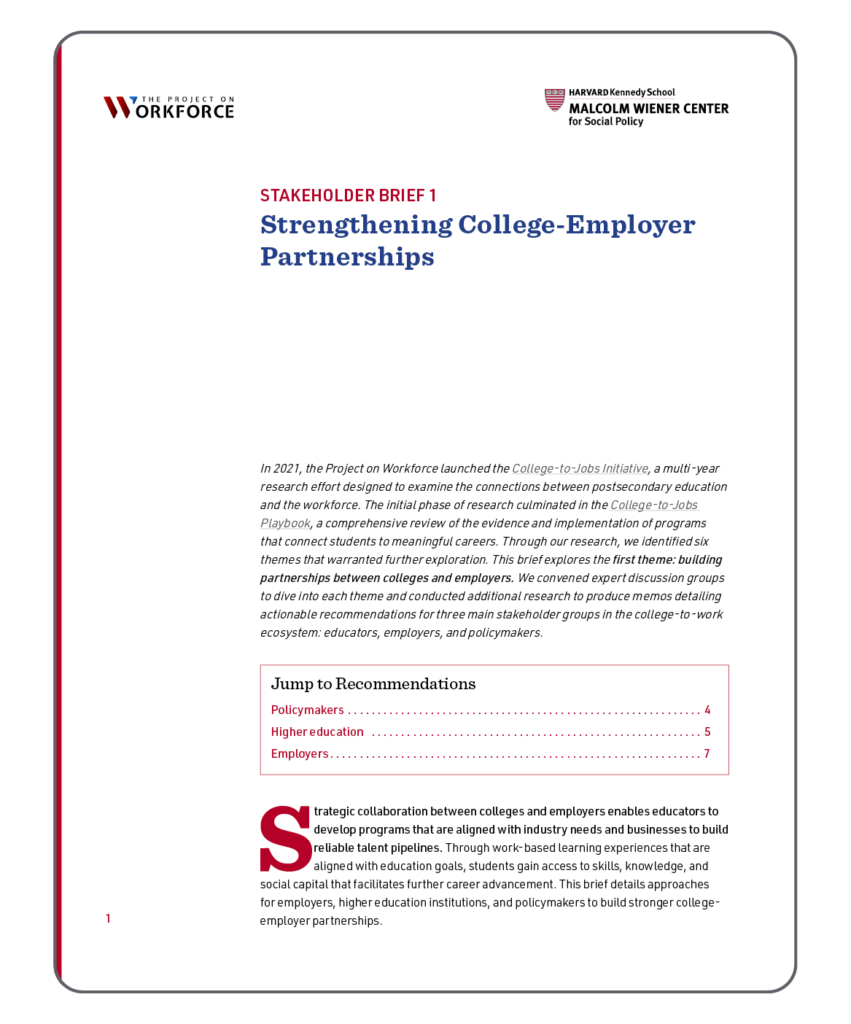
College-to-Jobs Initiative: Policy and Practice Series
The Project on Workforce
The Project on Workforce released new recommendations for educators, employers, and policymakers on how to improve college-to-jobs connections. With these webinars and stakeholder briefs, they aim to increase attention and investment in college-to-career transitions and show how colleges can better deliver on economic prosperity.
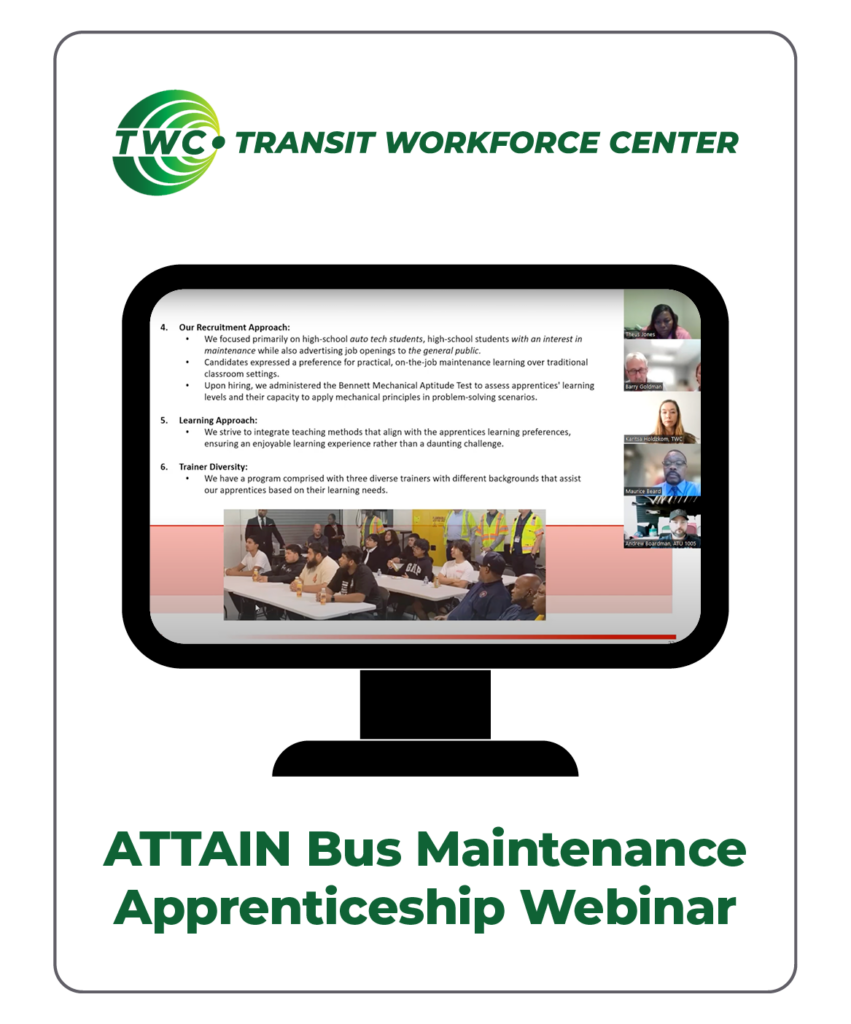
ATTAIN Bus Maintenance Apprenticeship Webinar
Transit Workforce Center
June 2024
TOPICS: Apprenticeship , Mentorship , Trainer and Mentor Development , Training
Enjoy this recorded convening of TWC’s American Transit Training and Apprenticeship Innovators Network (ATTAIN) comprised of several engaging presentations that highlight apprenticeship programs across the nation, followed by interactive discussions with Fairfax County Connector/Amalgamated Transit Union (ATU) Local 689 and Metro Transit/ATU Local 1005 on the development of mentorship and apprenticeship programs, how they work, and the benefits they can offer agencies and their workforce.
Below, you can find the link to the full slideshow used in the meeting.
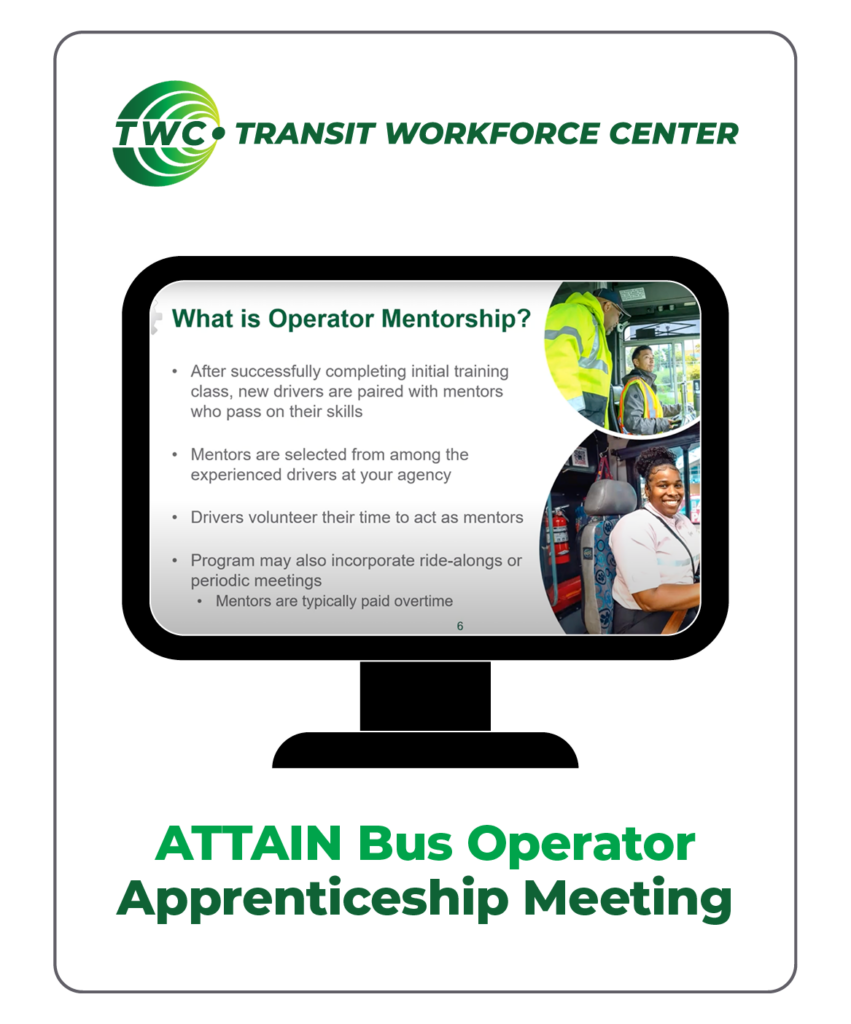
ATTAIN Bus Operator Apprenticeship Meeting
TWC’s American Transit Training and Apprenticeship Innovators Network (ATTAIN) met on May 17, 2024 to discuss bus operator apprenticeship. Check out the recording for short presentations from transit peers across the country and an engaging and interactive discussion about the development of bus operator mentorship and apprenticeship programs, how they work, and the benefits they offer.
Transit Workforce Center
May 2024
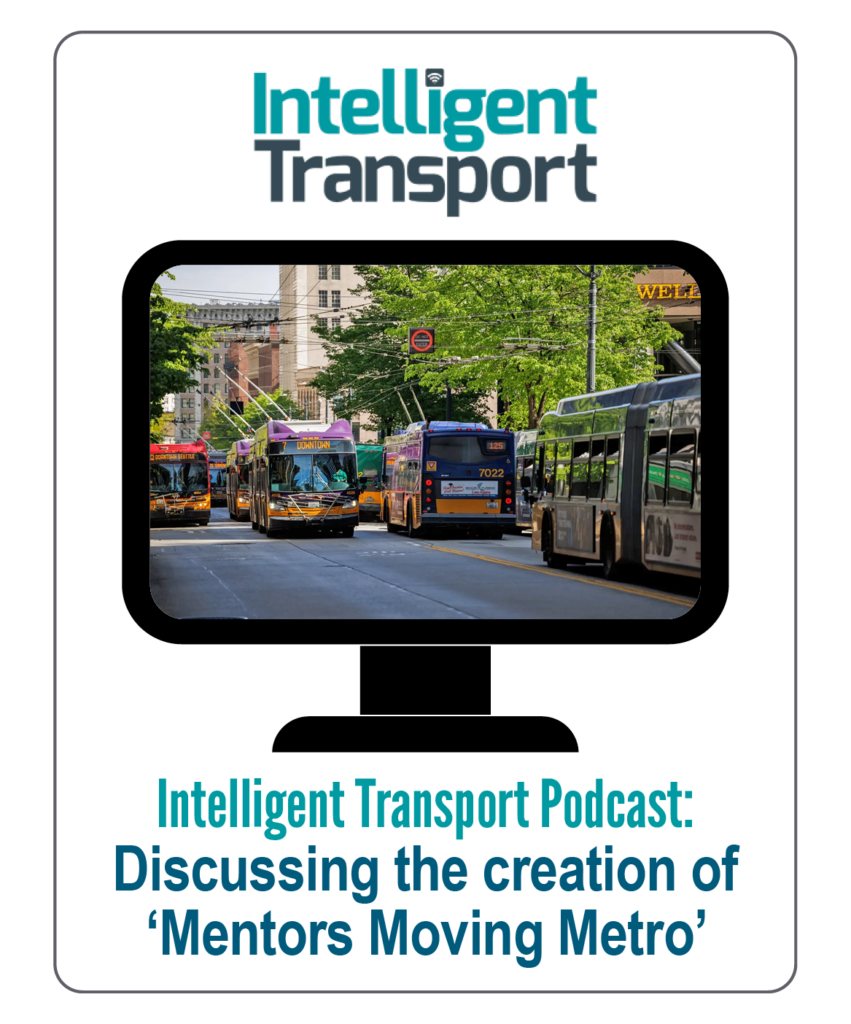
Intelligent Transport Podcast: Discussing the creation of ‘Mentors Moving Metro’
“Mentors Moving Metro” is a partnership between Metro and the Amalgamated Transit Union (ATU) Local 587 that will match experienced operators with new, part-time operators for six to 12 months. In this podcast discussion, Metro’s Director of Bus Operations, Phil DeVault, and transit operator and ATU member, Patrick Brady, talk about how “Mentors Moving Metro” is helping foster relationships and provide knowledge that can only come those who have been “in the seat.” They discussed the origins of the program, how mentors can be a morale boost for operators, and how it can foster greater interaction between operators and management. They finished the podcast by discussing their vision on developing it from a mentorship program to an apprenticeship program for drivers joining Metro in the future.
Intelligent Transport
March 2024
TOPICS: Apprenticeship , Career Pathways , Labor-Management Partnerships , Mentorship , Training
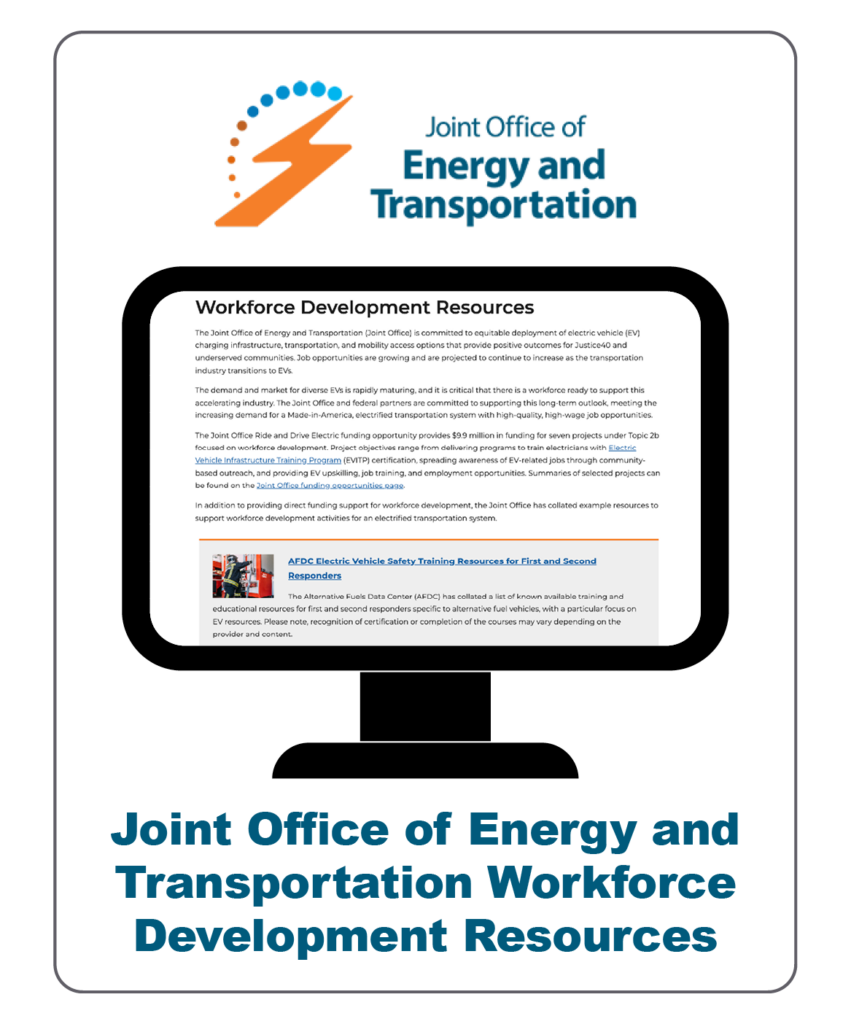
Joint Office of Energy and Transportation Workforce Development Resources
The Joint Office of Energy and Transportation (Joint Office) supports the deployment of low-no, convenient, and accessible transportation infrastructure. In addition to providing direct funding support for workforce development, the Joint Office has collated example resources to support workforce development activities for an electrified transportation system.
Joint Office of Energy and Transportation
TOPICS: Apprenticeship , Funding Opportunities , Low-No , Policy and Planning , Training , Workforce Shortage
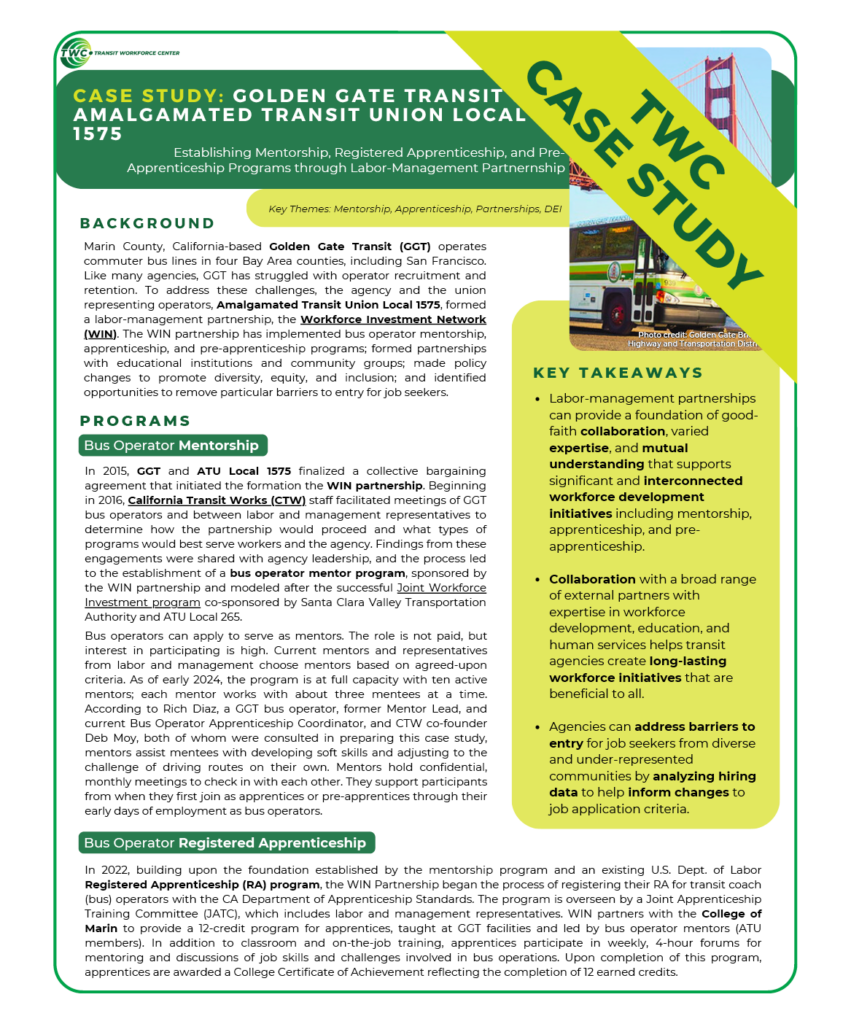
Case Study: Golden Gate Transit & Amalgamated Transit Union Local 1575
Marin County, California-based Golden Gate Transit (GGT) operates commuter bus lines in four Bay Area counties, including San Francisco. Like many agencies, GGT has struggled with operator recruitment and retention. To address these challenges, the agency and the union representing operators, Amalgamated Transit Union Local 1575, formed a labor-management partnership, the Workforce Investment Network (WIN). The WIN partnership has implemented bus operator mentorship, apprenticeship, and pre-apprenticeship programs; formed partnerships with educational institutions and community groups; and identified opportunities to remove particular barriers to entry for job seekers.
Transit Workforce Center
February 2024
Read Rich Diaz’s Transit Career Story on the TWC Blog to learn more.
View the full case study below:
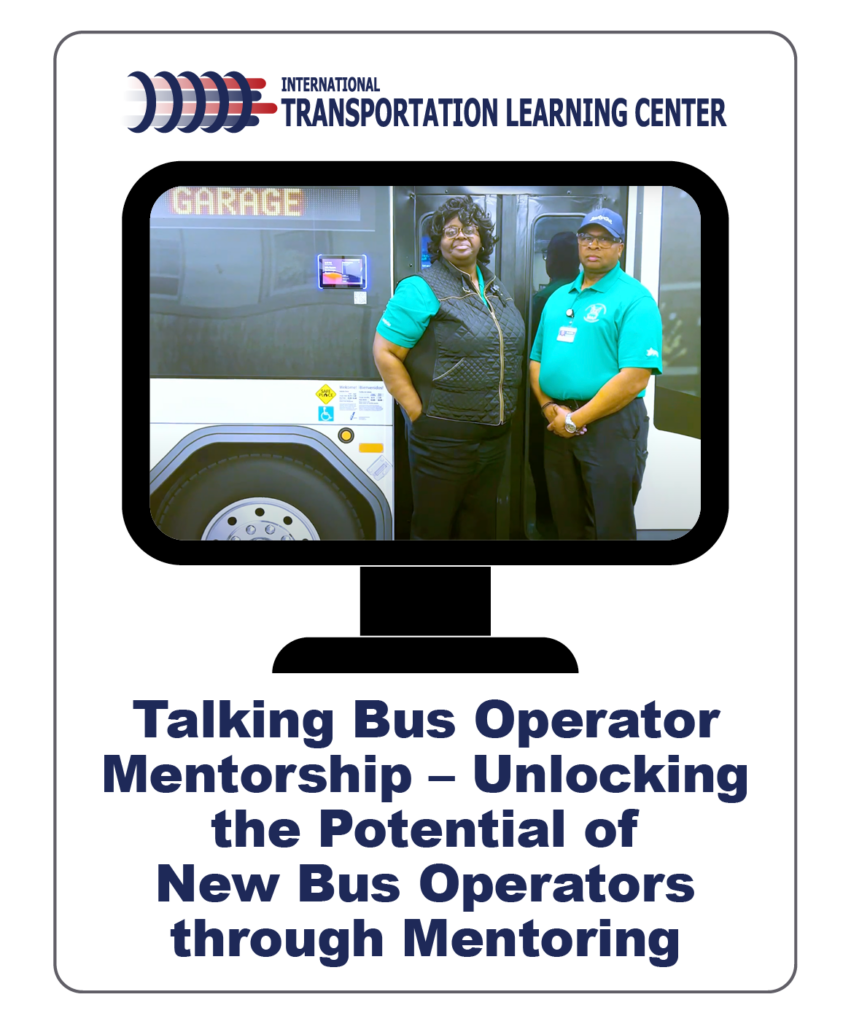
Talking Bus Operator Mentorship – Unlocking the Potential of New Bus Operators through Mentoring
Bus Operator Mentors from WMATA (Washington, D.C./ATU Local 689) and IndyGo (Indianapolis, IN/ATU Local 1070) speak about the benefits of mentorship programs. IndyGo’s President and CEO Inez Evans and ATU’s Director of Apprenticeships and Workforce Development Jamaine Gibson also share their thoughts on the importance of establishing these programs.
International Transportation Learning Center
November 2023
TOPICS: Apprenticeship , Career Pathways , Labor-Management Partnerships , Mentorship
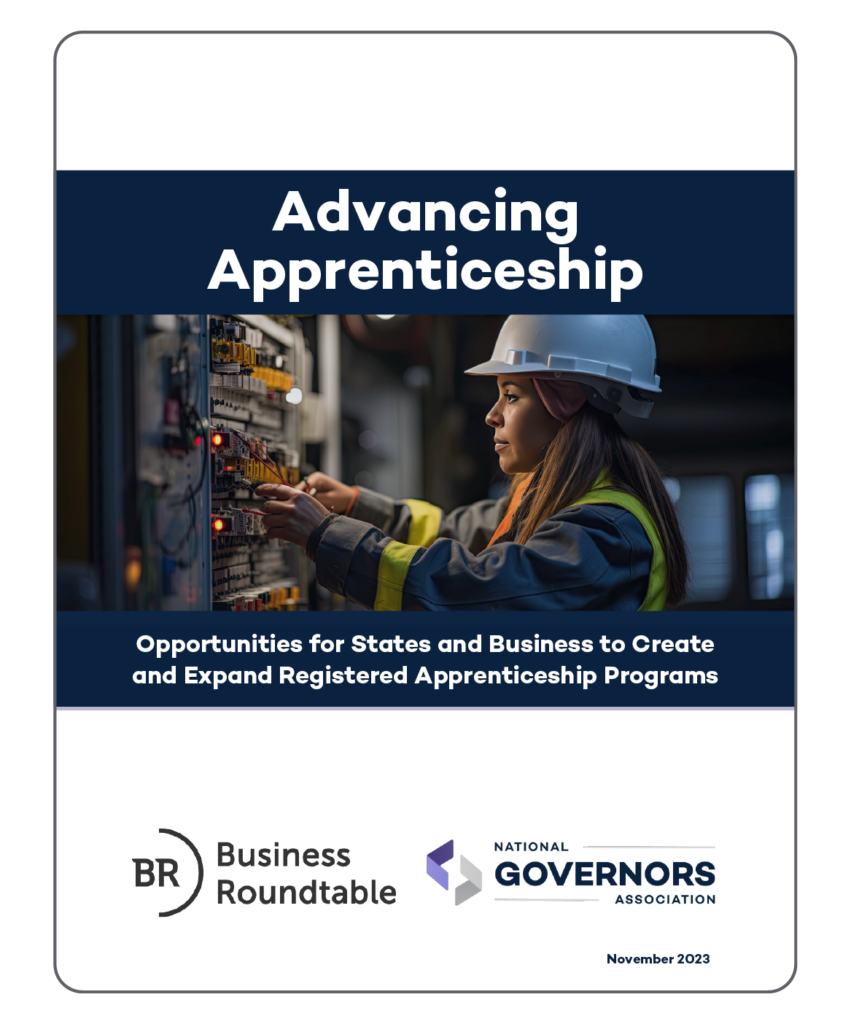
Advancing Apprenticeship: Opportunities For States And Business To Create And Expand Registered Apprenticeship Programs
This publication highlights the significance of Registered Apprenticeship Programs (RAPs) as one of several strategies and opportunities that employers and states can implement and offer to individuals as a viable path toward securing and prospering in a career. Registered Apprenticeship plays an important role in the U.S. economy and workforce ecosystem by satisfying employer talent needs while providing training and employment pathways for individuals in family-sustaining, in-demand careers. A registered apprenticeship is an intensive program that offers an individual paid on-the-job experience, coupled with classroom learning that together provides a jobseeker with the necessary skills to secure gainful employment.
National Governors Association
November 2023
TOPICS: Apprenticeship , Career Pathways , Policy and Planning
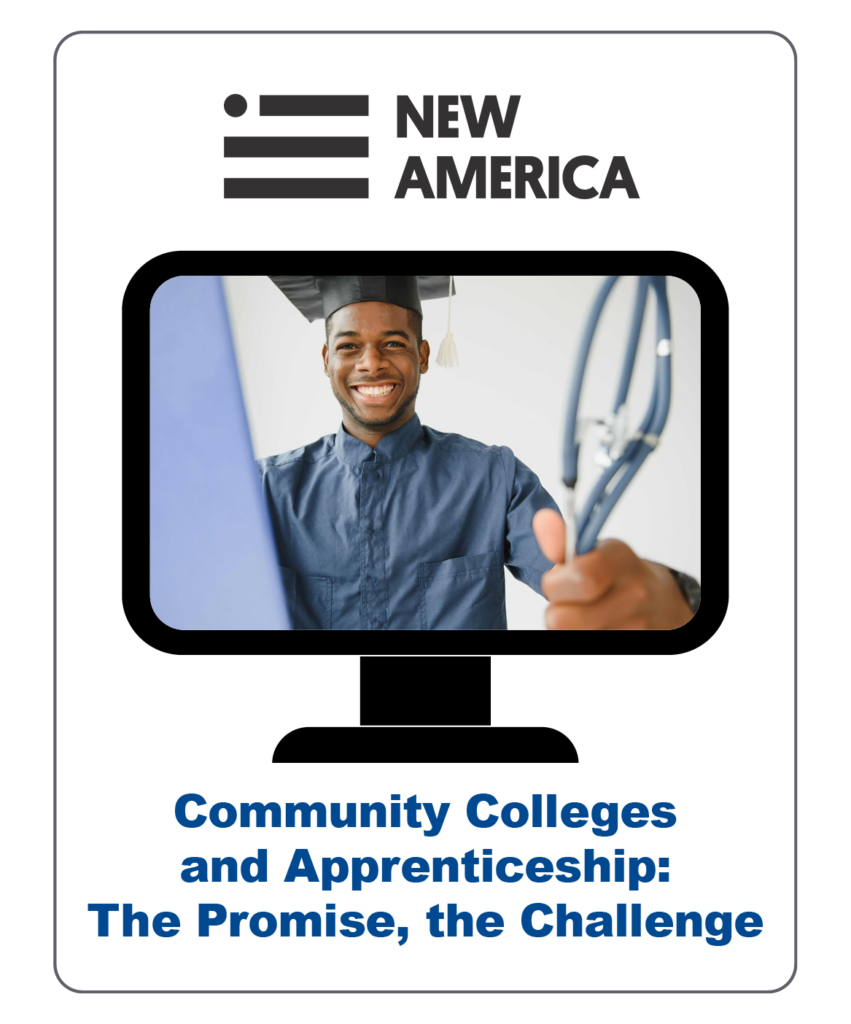
Community Colleges and Apprenticeship: The Promise, the Challenge
To better understand the challenges and opportunities facing community colleges that want to expand apprenticeship opportunities to their students, New America conducted a year-long study. They spoke to apprenticeship, workforce development, and community college leaders about the community colleges role in expanding apprenticeship.
New America Center on Education and Education Policy
November 2023
TOPICS: Apprenticeship , Career Pathways , Policy and Planning
Based on these conversations, we chose case studies and conducted in-depth interviews with leaders from the Community College System of New Hampshire’s ApprenticeshipNH, Arapahoe in Colorado, San Jacinto in Texas, and Howard Community College in Maryland’s programs in IT and cybersecurity, and Coastal Alabama Community College’s nursing apprenticeship.
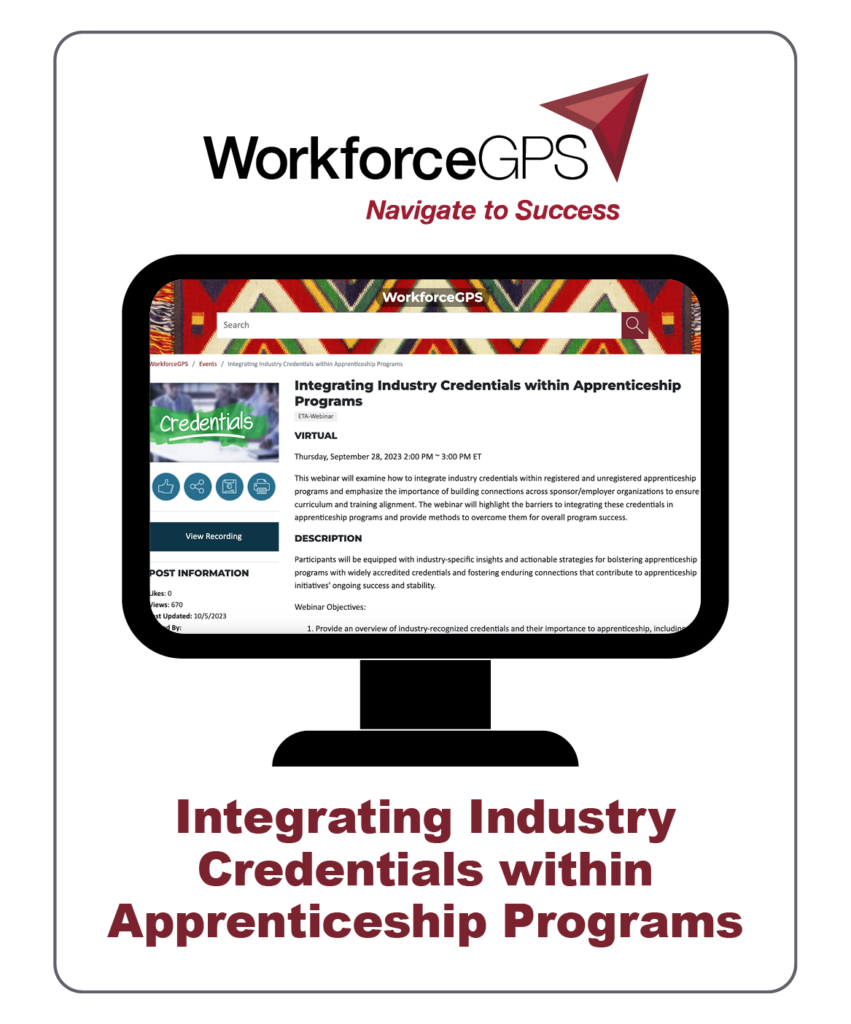
Integrating Industry Credentials within Apprenticeship Programs
This webinar examines how to integrate industry credentials within registered and unregistered apprenticeship programs and emphasizes the importance of building connections across sponsor/employer organizations to ensure curriculum and training alignment.
WorkforceGPS
September 2023
TOPICS: Apprenticeship , Career Pathways
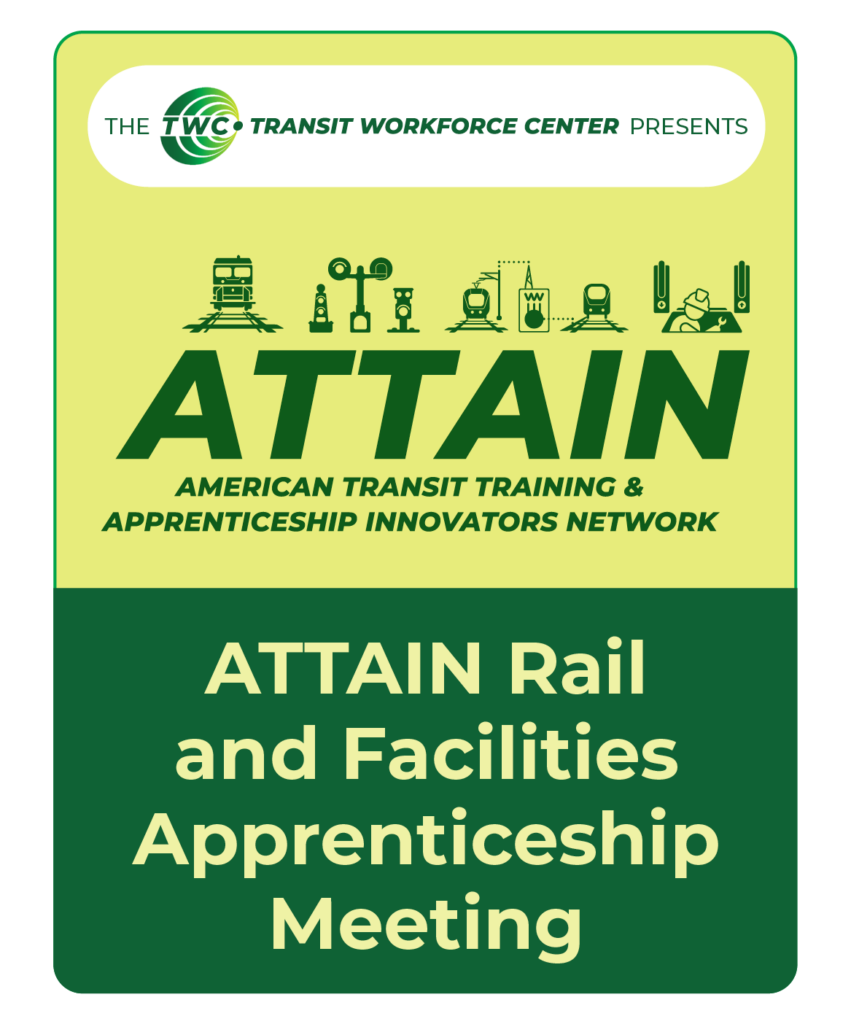
ATTAIN Rail and Facilities Apprenticeship Meeting
This recorded meeting of the ATTAIN Rail and Facilities Committee serves as a resource for transit industry stakeholders and includes presentations on apprenticeship and case studies of successful programs across the country.
Transit Workforce Center
September 2023
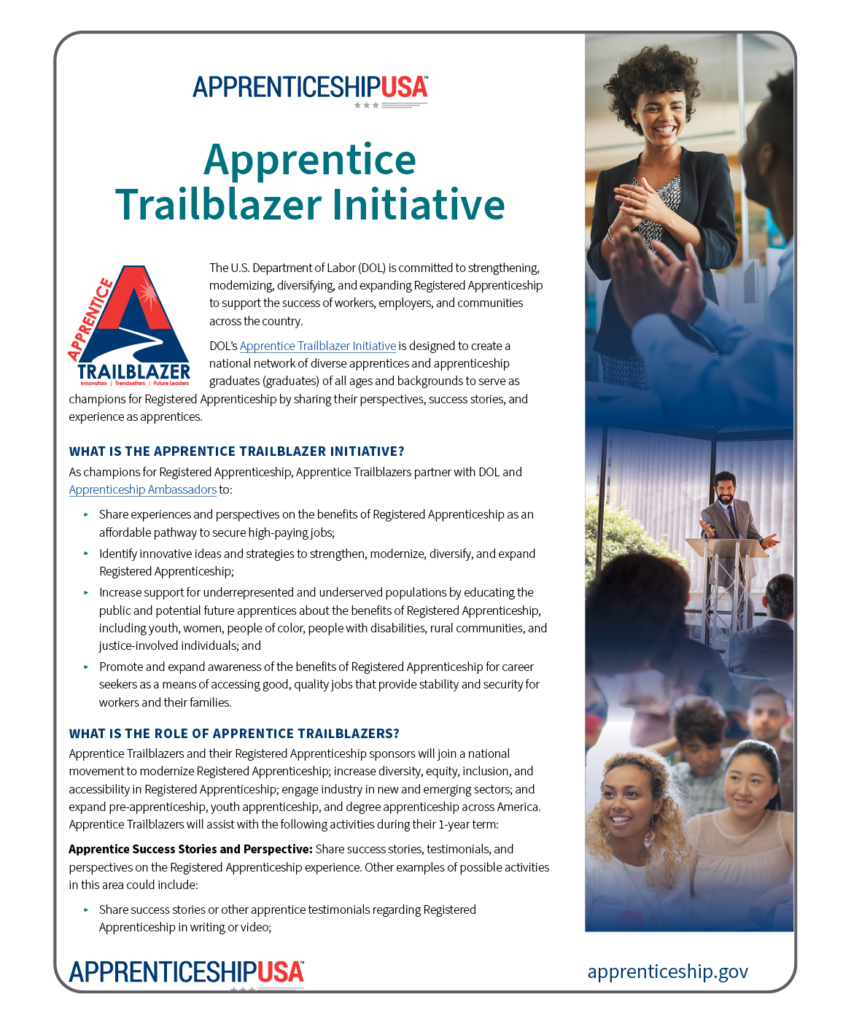
Apprentice Trailblazer Initiative
The Apprentice Trailblazer Initiative is designed to create a national network of apprentices and apprenticeship graduates to feature their stories and hear their perspectives, show how Registered Apprenticeships increase opportunities, and bring awareness to other career seekers who may be interested in becoming apprentices.
Department of Labor; ApprenticeshipUSA
TOPICS: Apprenticeship , Career Pathways , Community Engagement , Mentorship
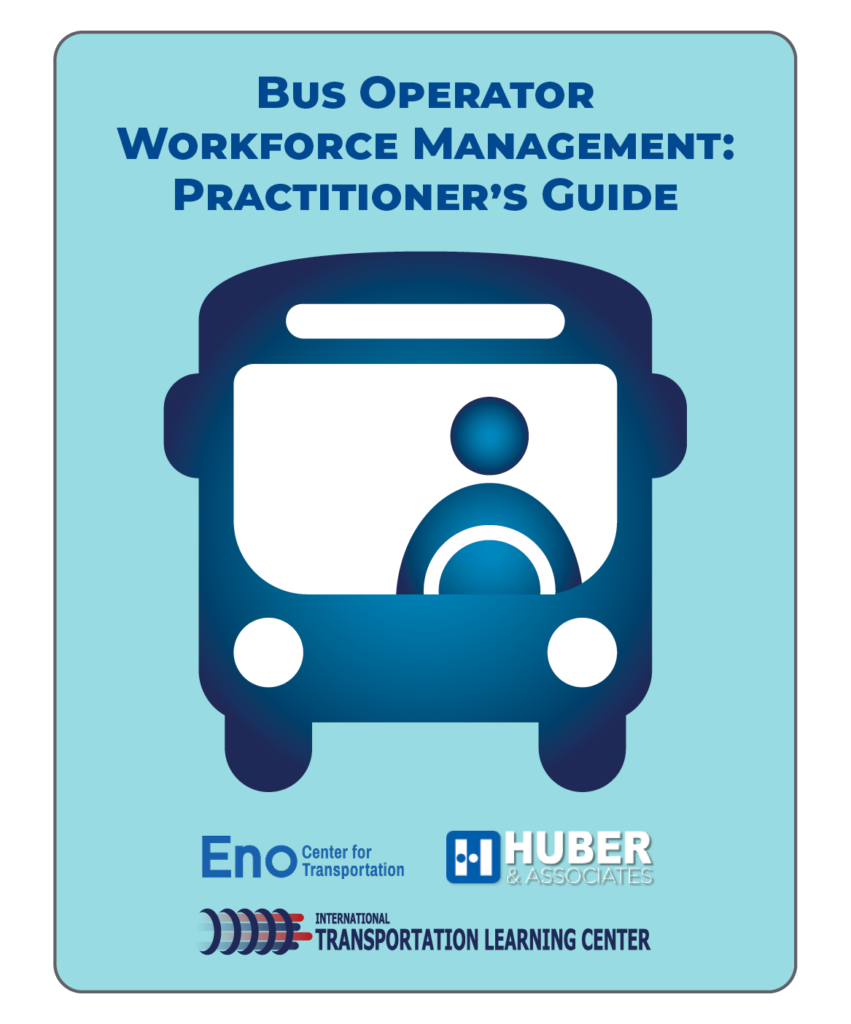
Bus Operator Workforce Management: Practitioner’s Guide
This report, produced by the Eno Center for Transportation, International Transportation Learning Center (ITLC), and Huber & Associates, is a practitioner’s guide that provides recommendations and resources enabling transit agencies to better assess, plan, and implement their operator workforce management programs. A link to a related TRB webinar is also included.
Transit Cooperative Research Program
August 2023
Contributor(s): National Academies of Sciences, Engineering, and Medicine; Transportation Research Board; Transit Cooperative Research Program; Robert Puentes; Philip Plotch; Brianne Eby; Paul Lewis; Karitsa Holdzkom; Xinge Wang; Douglas Nevins; Kenyon Corbett; Melissa Huber
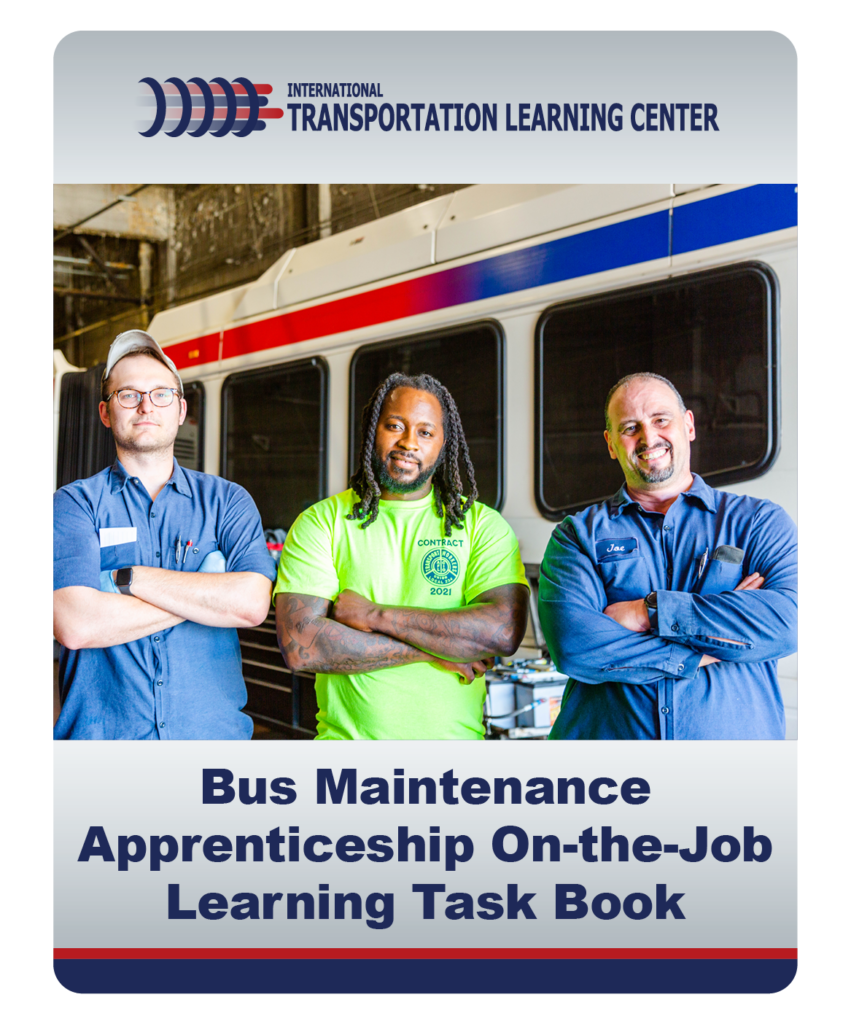
Bus Maintenance Apprenticeship On-the-Job Learning Task Book
International Transportation Learning Center
July 2023
TOPICS: Apprenticeship , Mentorship , Trainer and Mentor Development , Training
The Bus Maintenance Apprenticeship On-the-Job Learning (OJL) Task Book allows mentors and apprentices to track competency. The Task Book contains individual job tasks in 10 job functions (e.g., Electrical & Electronic, Steering & Suspension, etc.). Once the mentor and apprentice both agree that the apprentice is competent in a specific task (e.g., can test, adjust or replace a voltage regulator), each signs-off on that task.
Like the Apprenticeship Framework, the Task Book is aligned with the Automotive Service Excellence (ASE) task list and APTA training standards. Under the Contract/Agreement established by each agency’s Joint Apprenticeship Committee (JAC), however, each agency is free to add, delete or modify tasks to suit their unique operating conditions and bus equipment. The Task Book serves as a useful checklist to make certain that mentors have provided adequate OJL for each job task, and apprentices can demonstrate they are capable of performing those tasks safely and effectively on their own. The use and preservation of the Job Book are the responsibility of both parties.
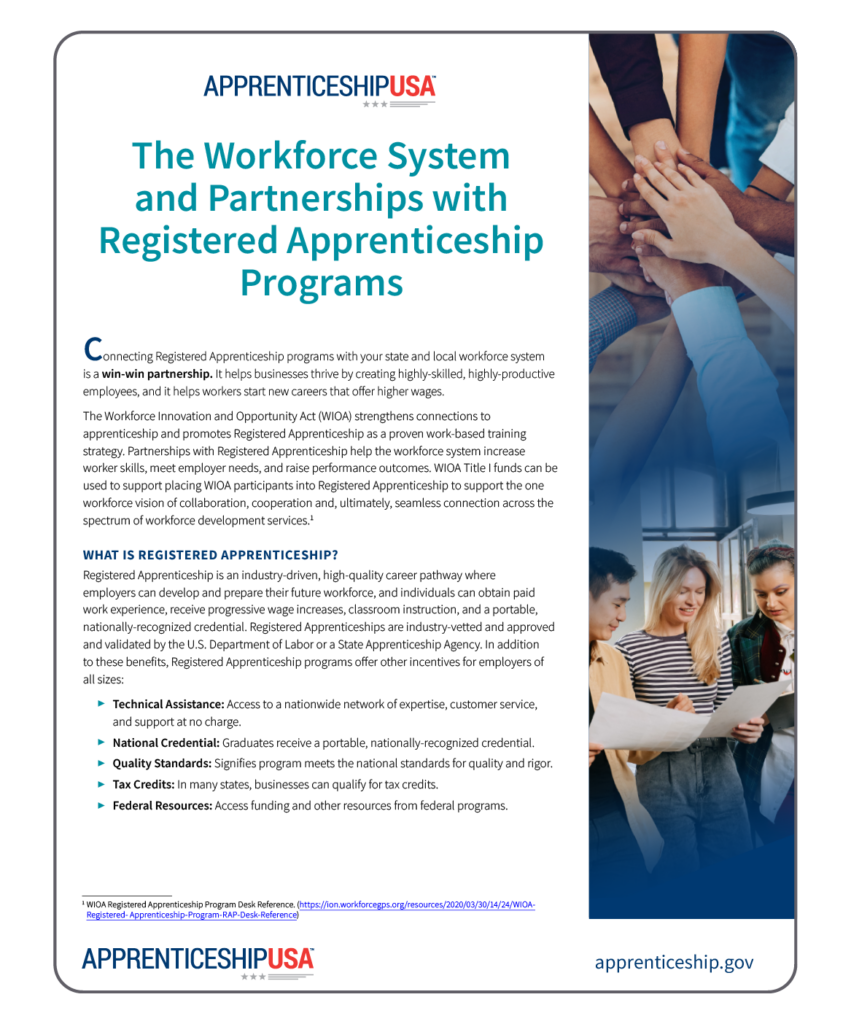
Workforce Innovation and Opportunity Act
This landing page provides information about WIOA as well as resources to help employers take advantage of WIOA funding to support apprenticeship.
Department of Labor
TOPICS: Apprenticeship , Funding Opportunities
The Workforce Innovation and Opportunity Act (WIOA) was signed into law on July 22, 2014. WIOA is designed to help job seekers access employment, education, training, and support services to succeed in the labor market and to match employers with the skilled workers they need to compete in the global economy.
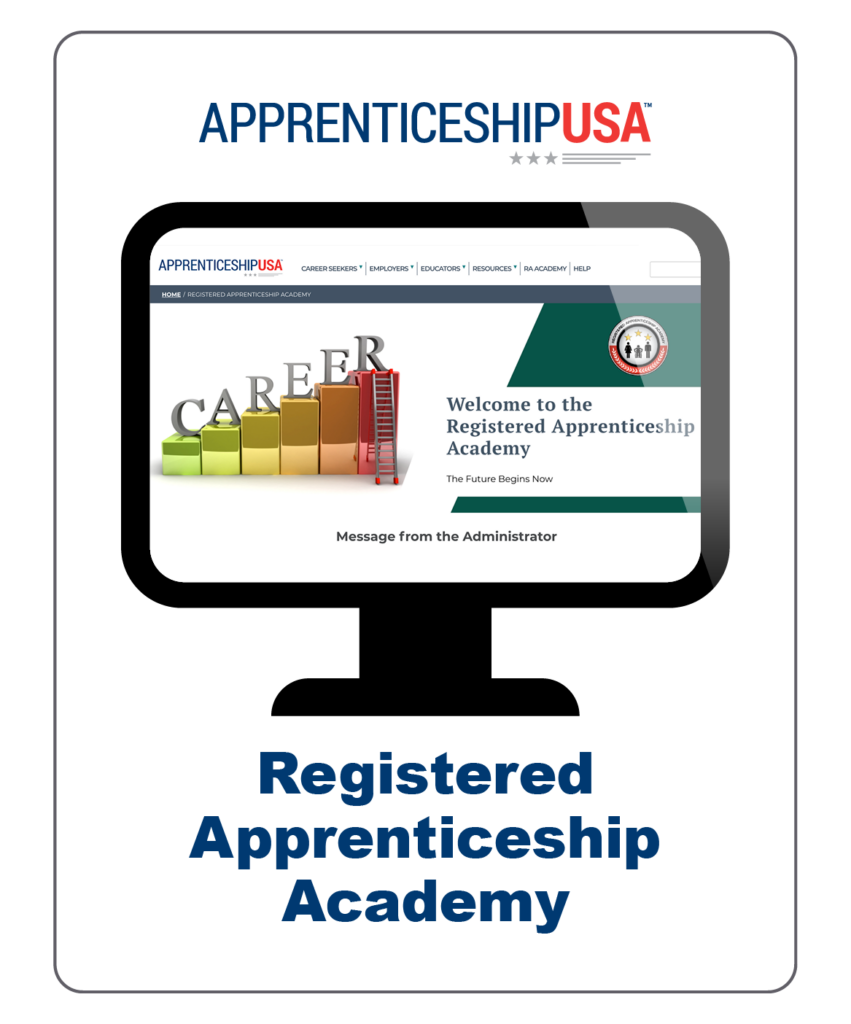
Registered Apprenticeship Academy
This page, created by the ETA’s Office of Apprenticeship, offers a wide range of courses, webinars, and other resources for program sponsors, apprentices, state apprenticeship agency partners, and other stakeholders to provide training, enhance skills, and stay up to date on best practices for registered apprenticeships.
Employment and Training Administration
TOPICS: Apprenticeship
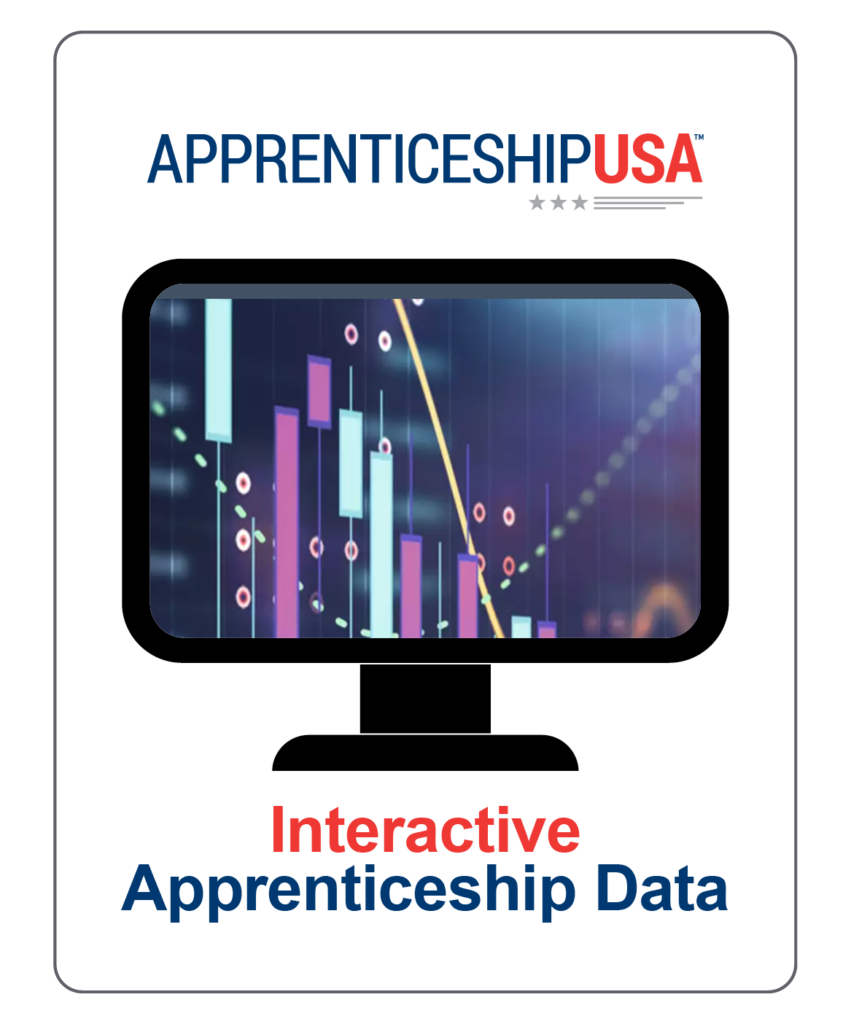
Interactive Apprenticeship Data
This dashboard provides key statistics on apprentices by fiscal year (FY) (October through September), including state and national program data entered or uploaded into the Registered Apprenticeship Partners Information Database System (RAPIDS).
Apprenticeship USA
June 2023
TOPICS: Apprenticeship
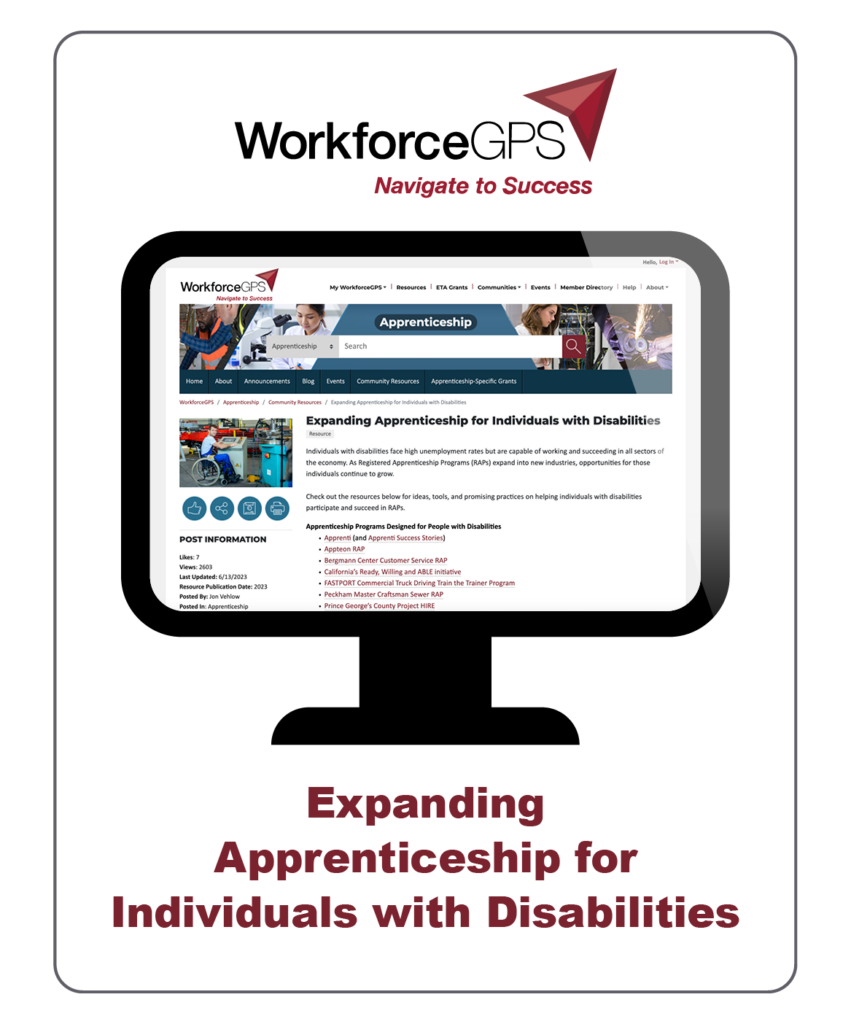
Expanding Apprenticeship for Individuals with Disabilities
This landing page features a variety of resources aimed at providing information, ideas, tools, and practices for supporting individuals with disabilities in apprenticeship programs. The resources include specific programs, toolkits and guides, outreach and background materials, and research.
WorkforceGPS
June 2023
TOPICS: Apprenticeship , Community Engagement , Mentorship
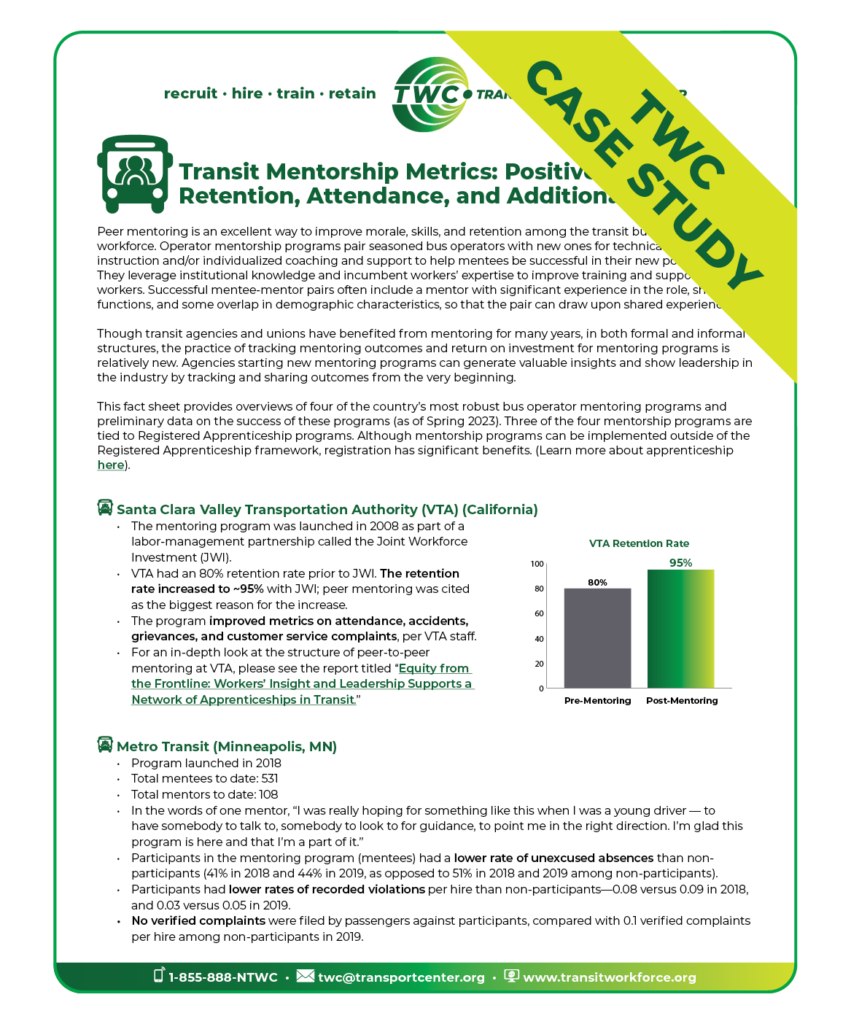
Transit Mentorship Metrics: Positive Signs for Retention, Attendance, and Additional Outcomes
Transit Workforce Center
June 2023
TOPICS: Apprenticeship , Mentorship , Policy and Planning , Retention , Training
This fact sheet provides overviews of four of the country’s most robust bus operator mentoring programs and preliminary data on the success of these programs (as of Spring 2023). Operator mentorship programs pair seasoned bus operators with new ones for technical skill instruction and/or individualized coaching and support to help mentees be successful in their new positions. They leverage institutional knowledge and incumbent workers’ expertise to improve training and support for new workers. The Mentoring Fact Sheet provides insight into the role mentorship programs can play in improving retention rates of workers, decrease unexcused absences, reduce rates of recorded violations, and lower complaints.
Contributing Authors: Shayna Gleason, Douglas Nevins, Michaela Boneva
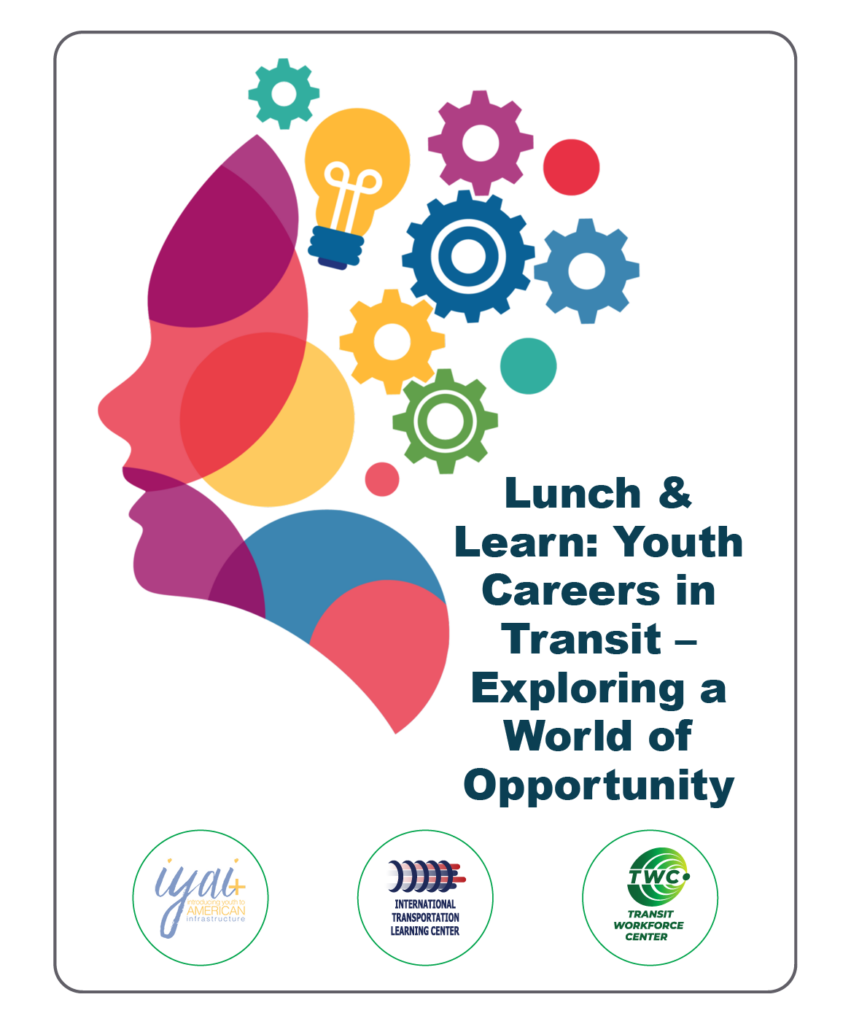
Lunch & Learn: Youth Careers in Transit – Exploring a World of Opportunity
This is Part 4 of Iyai’s 6-part 2023 Transportation/Mobility Career Awareness Lunch and Learn series. This webinar is co-sponsored with the International Transportation Learning Center / Transit Workforce Center. This webinar features presenters at various stages of their transit careers discussing their work and their own career pathways, engaging in an interactive discussion with the audience.
introducing youth to American infrastructure; International Transportation Learning Center/Transit Workforce Center
May 2023
TOPICS: Apprenticeship , Career Pathways , Community Engagement , Mentorship
Program: Iyai’s Dr. Beverly Scott and TWC’s Shayna Gleason present an overview of the program series and career landscape, followed by participants talking about their work and careers. Speakers include:
- Marvin Alfred, President, Amalgamated Transit Union (ATU) Local 113 (Toronto);
- Kyisha Bond, mechanic apprentice, IndyGo (Indianapolis),
- Inez Evans, President and CEO, IndyGo (Indianapolis);
- Andrew Falotico, Health and Safety Representative, ATU Local 113 (Toronto);
- Desiree Patrice, Deputy Chief of Capital Transformation, MBTA (Boston).
After the presentations, Karen Philbrick from the Mineta Transportation Institute facilitates a conversation between the audience and presenters.
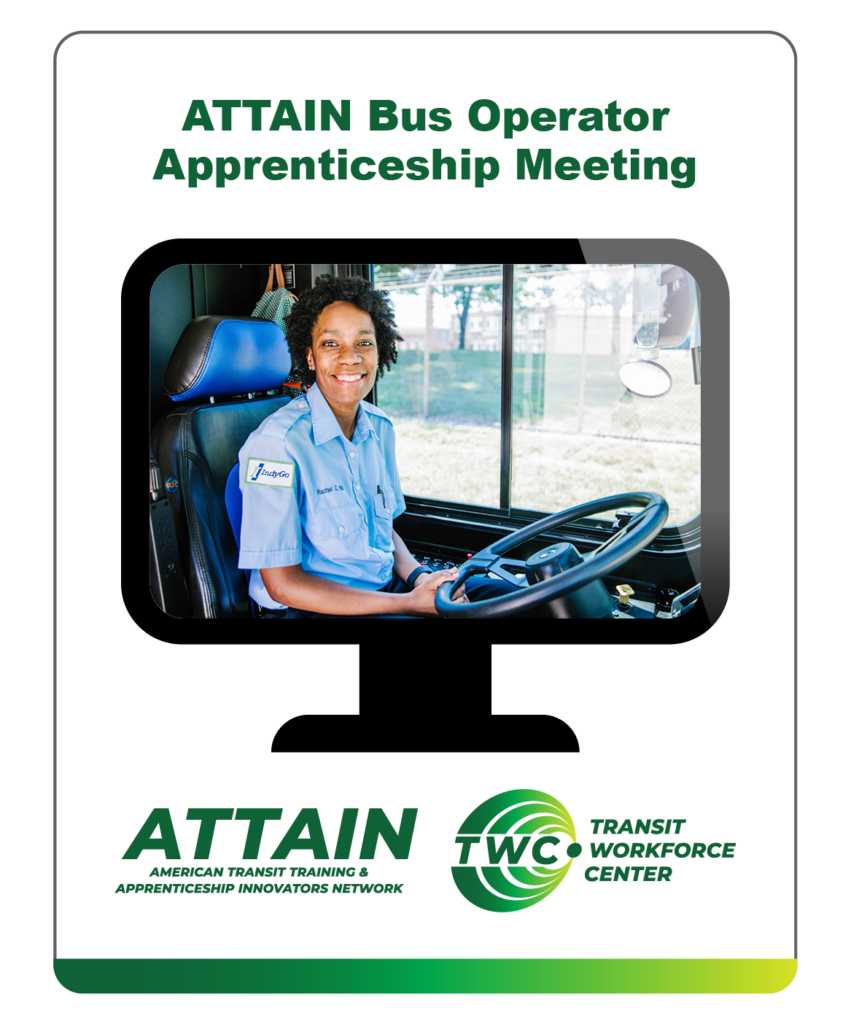
ATTAIN Bus Operator Apprenticeship Meeting
This recorded meeting of the ATTAIN Bus Operator Committee serves as a resource for transit industry stakeholders and includes presentations on apprenticeship and case studies of successful programs across the country.
Transit Workforce Center
May 2023
TOPICS: Apprenticeship , Career Pathways , Mentorship , Trainer and Mentor Development , Training
The American Transit Training and Apprenticeship Innovators Network (ATTAIN), run by the Transit Workforce Center (TWC), is a peer network created for transit agencies and labor unions to explore new apprenticeship programs or enhance existing programs for their frontline workforce.
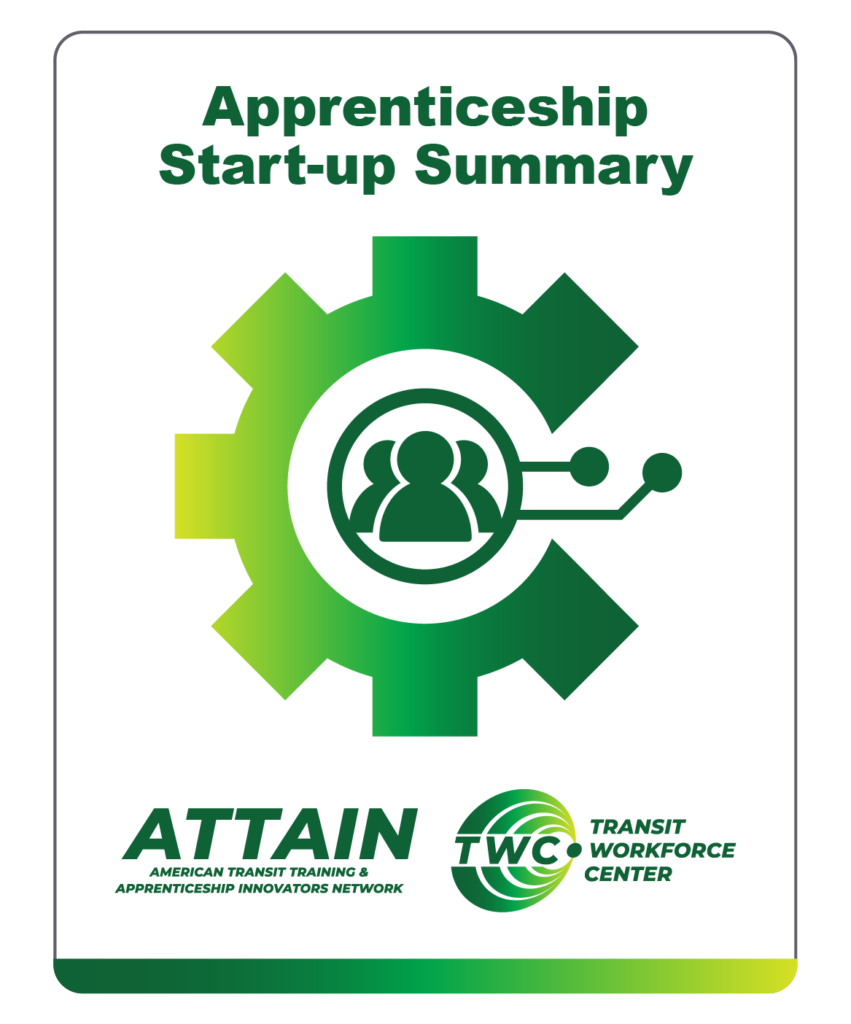
Apprenticeship Start-up Summary
These summaries outline the steps to tailor an effective Registered Apprenticeship (RA) program. These steps can be completed in order or, in some cases, concurrently. Apprenticeship programs are customizable to meet the employers’ skill requirements.
ProgressWorx
April 2023
TOPICS: Apprenticeship , Career Pathways , Labor-Management Partnerships , Mentorship , Training
If the workforce for the occupation to be registered as an apprenticeship is represented by a labor union, the employer and union would register the program as an Individual Joint program. If the workforce is not represented, the program would be registered as an Individual Non-Joint program by the employer.
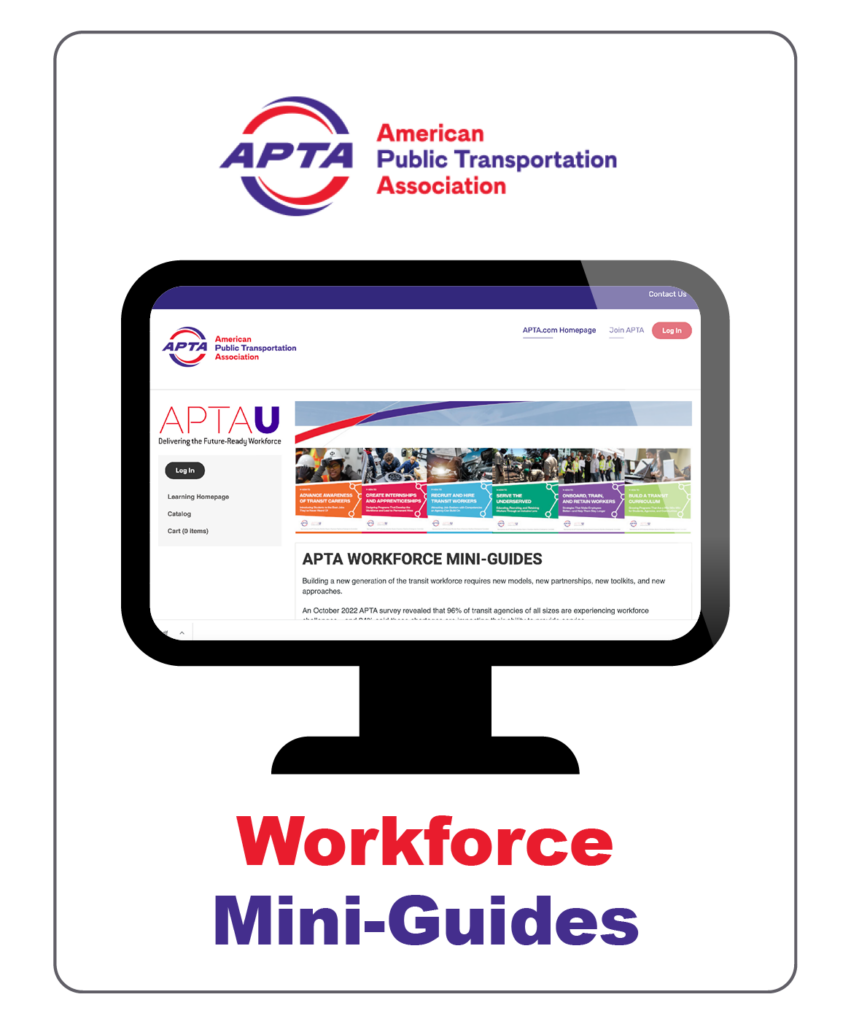
Workforce Mini-Guides
These six workforce development mini-guides are designed to help develop and implement successful strategies to address the critical workforce shortages seen across the public transportation industry. They cover these topics: advancing awareness of transit careers; creating internships and apprenticeships; recruiting and hiring transit workers; serving the underserved in the workforce; onboarding, training, and retaining workers; and building a transit curriculum.
American Public Transportation Association
April 2023
An October 2022 survey conducted by APTA revealed that 96 percent of transit agencies of all sizes are experiencing workforce challenges, and 84 percent said these shortages are impacting their ability to provide service. APTA developed these mini-guides building on their 2021 Transit Workforce Readiness Guide and combining industry insights and stories, case studies, lessons learned, and best practices.
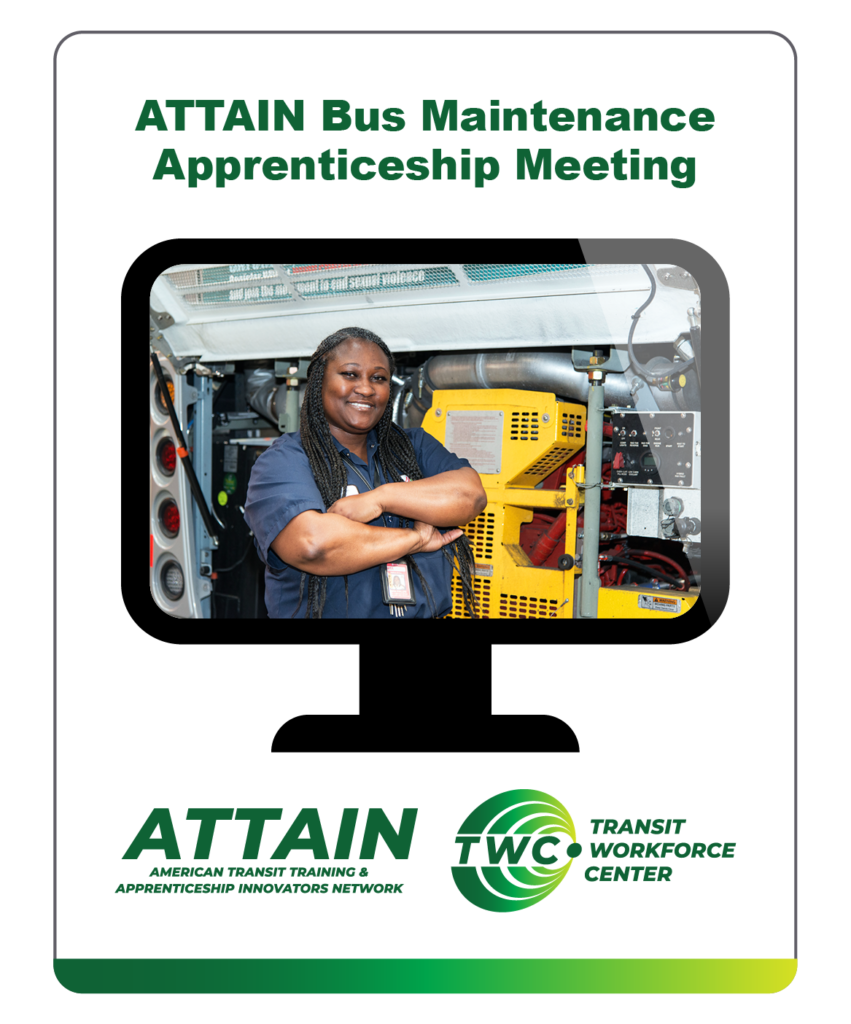
ATTAIN Bus Maintenance Apprenticeship Meeting
The American Transit Training and Apprenticeship Innovators Network (ATTAIN), run by the Transit Workforce Center (TWC), is a peer network created for transit agencies and labor unions to explore new apprenticeship programs or enhance existing programs for their frontline workforce. This recorded meeting of the ATTAIN Bus Maintenance Committee serves as a resource for transit industry stakeholders and includes presentations on apprenticeship and case studies of successful programs across the country.
Transit Workforce Center
March 2023
TOPICS: Apprenticeship , Career Pathways , Trainer and Mentor Development , Training
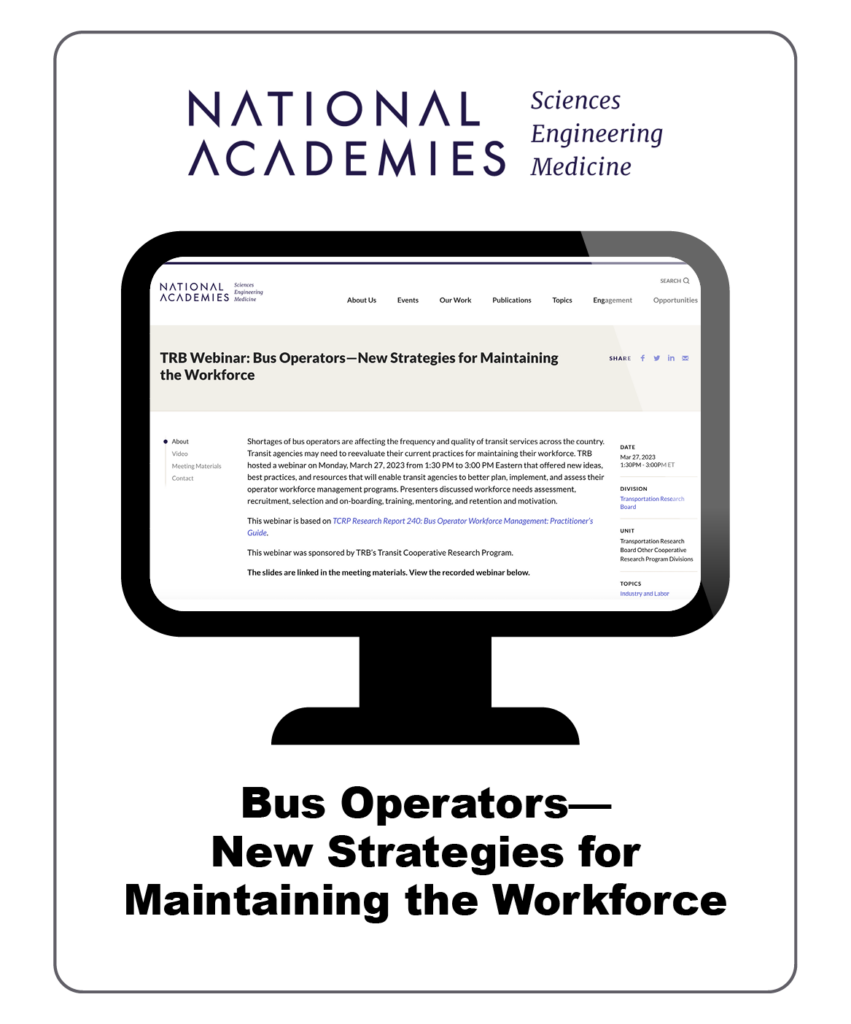
Bus Operators—New Strategies for Maintaining the Workforce
This webinar discusses the ideas, best practices, and resources that will enable transit agencies to better plan, implement, and assess their operator workforce management programs as described in the Bus Operator Workforce Management: Practitioner’s Guide. Presenters discussed workforce needs assessment, recruitment, selection and on-boarding, training, mentoring, and retention and motivation.
Transit Cooperative Research Program
March 2023
TOPICS: Apprenticeship , Hiring and Recruitment , Mentorship , Policy and Planning , Retention , Workforce Shortage
Webinar agenda and presenters
- Bus operator training and retention – Xinge Wang, International Transportation Learning Center
- Lessons from Florida – Trish Collins, Pinellas Suncoast Transit Authority
- Lessons from the Midwest – George F. Fields, Greater Cleveland Regional Transit Authority
- Question and answer session moderated by Robert Puentes, Eno Center for Transportation
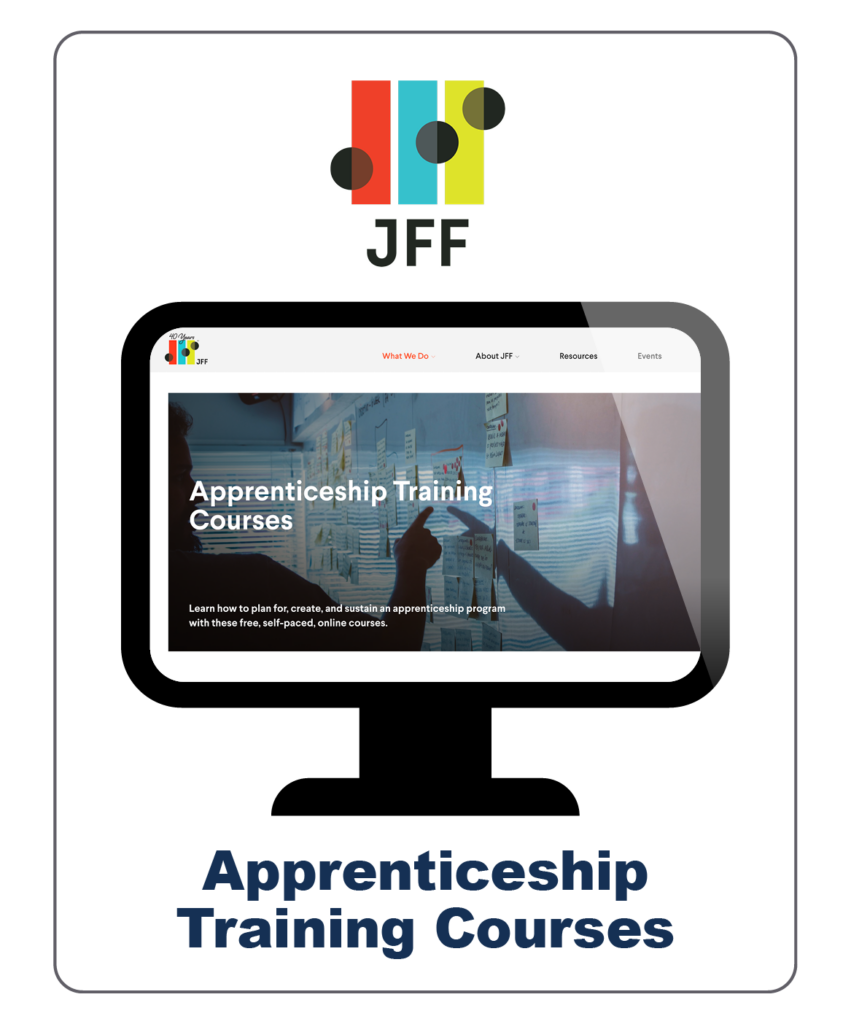
Apprenticeship Training Courses
This series of free online training courses will help transit providers and others plan for, create, and sustain registered apprenticeship programs. Several courses have already been released and others are forthcoming.
Jobs for the Future
March 2023
TOPICS: Apprenticeship , Career Pathways , Mentorship , Trainer and Mentor Development , Training
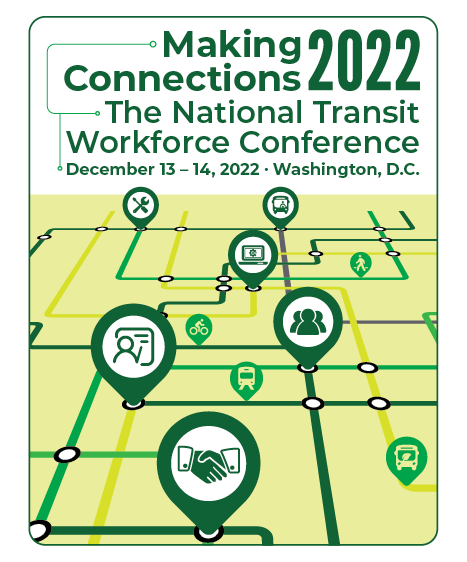
Making Connections 2022 – Conference Overview and Videos
The Transit Workforce Center hosted Making Connections 2022: The National Transit Workforce Conference in Washington, D.C. on December 13-14, 2022. This conference brought together participants from urban, suburban, rural, and tribal public transportation and industry stakeholders in plenaries, workshops, networking, and ongoing dialogue. Discussions and sessions featured topics including recruitment and retention, training, mentoring and apprenticeships, new technologies, and preparing today’s and tomorrow’s workforce.
Transit Workforce Center
December 2022
Session materials from Making Connections 2022 are hosted on the TWC Resource Center. Please click here to view all related materials. A PDF copy of the conference schedule is linked below.
Opening Video:
Recap Video:
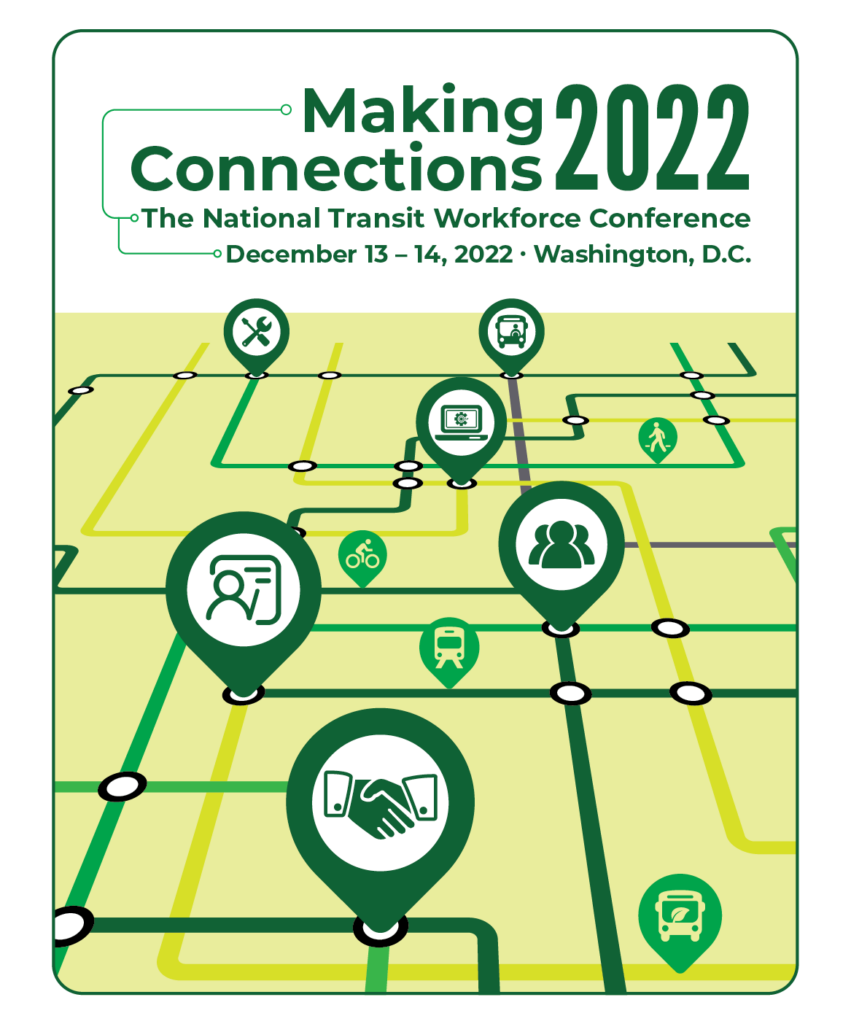
Making Connections 2022 – Growing Your Own Through Apprenticeship: A Joint Approach to Building Skills
This session about apprenticeship was presented as part of TWC’s Making Connections 2022 transit workforce conference in December, 2022.
Transit Workforce Center
December 2022
Session Summary: Apprenticeship programs create a foundation for strong, effective workforce development programs. The ability to build and maintain these programs requires strong labor-management partnerships, or, in the case of nonunion agencies, ongoing involvement of, and management engagement with, the frontline workforce. In this session, panelists from transit agencies presented examples of challenges met and lessons learned as they designed and implemented their apprenticeship programs. Attendees heard how apprenticeship can support a variety of frontline transit occupations and the benefits that apprenticeship offers.
Moderator
- Jamaine “G” Gibson: Director of Apprenticeships and Workforce Development – Amalgamated Transit Union
Speakers
- Dexter Bishop: Elevator/Escalator Journeyman – Amalgamated Transit Union/Local 689
- Stephanie Deiger: Chief Human Resources Officer – Southeastern Pennsylvania Transportation Authority
- Brian Funk: Chief Operating Officer and Deputy General Manager – MetroTransit Minneapolis
- Michael Hanssen: Supervisor of Technical Skills Training – Washington Metropolitan Area Transit Authority
- Alec Johnson: Bus Operator Apprenticeship Coordinator – MetroTransit Minneapolis/Amalgamated Transit Union Local 1005

Making Connections 2022 – Designing an Impactful Training Program: Linking Program Design to Classroom Learning and On-The-Job Training for Transit Frontline Workers
This session about program design was presented as part of TWC’s Making Connections 2022 transit workforce conference in December, 2022.
Transit Workforce Center
December 2022
TOPICS: Apprenticeship , Making Connections Conference , Retention , Training
Session Summary: This workshop covered the basic building blocks of program design. Participants evaluated the pieces needed to develop a robust program that enables trainers to link good program design to effective classroom and on-the-job learning. This workshop was relevant to those looking to build new programs or refine current programs.
Moderator
- Grant Young: Instructional Systems Design Consultant – International Transportation Learning Center/Transit Workforce Center
Speakers
- Mike Glaeser: Manager, Bus Maintenance Training – Washington Metropolitan Area Transit Authority
- Colleen May: Senior Director of Training – Southeastern Pennsylvania Transportation Authority
- Danielle Wallace: Apprenticeship and Pathways Manager – King County Metro Transit
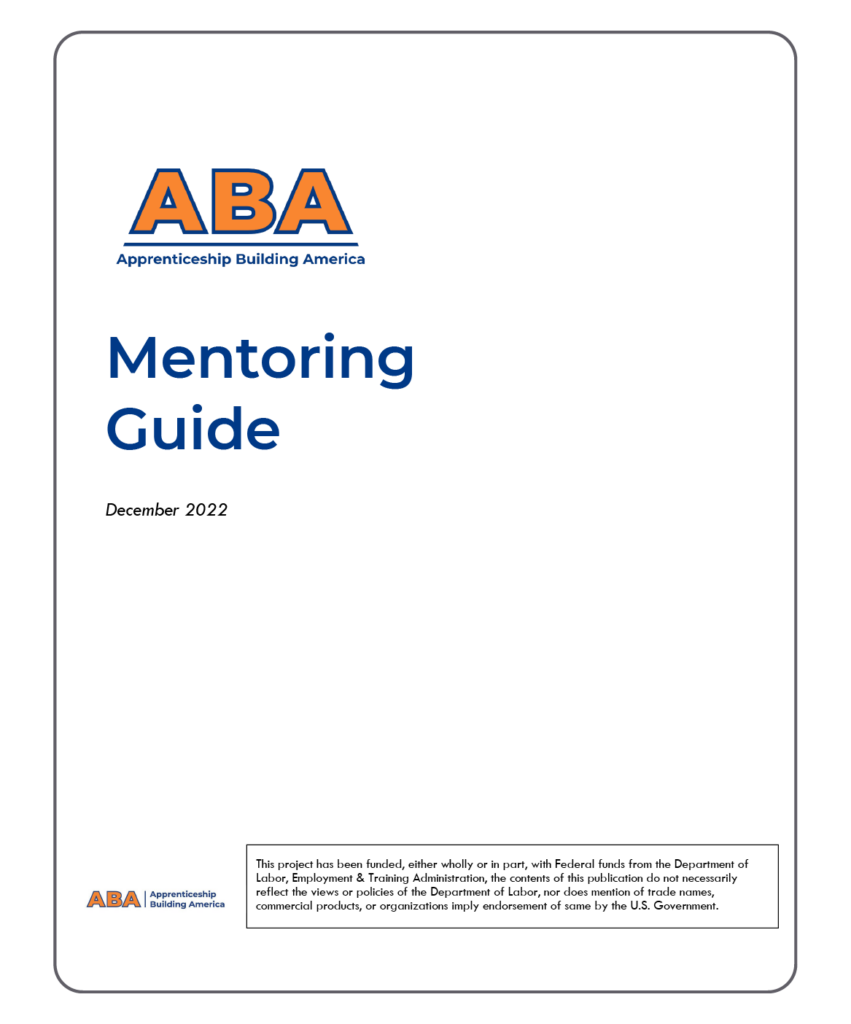
Apprenticeship Building America: Mentoring Guide
Mentoring is a key staple of a successful apprenticeship program. This guide provides an overview of the qualities of a good mentor, the activities a mentor undertakes, tips for mentoring youth apprentices, and more.
U.S. Dept of Labor, Apprenticeship Building America Grant Program
December 2022
TOPICS: Apprenticeship , Mentorship , Trainer and Mentor Development
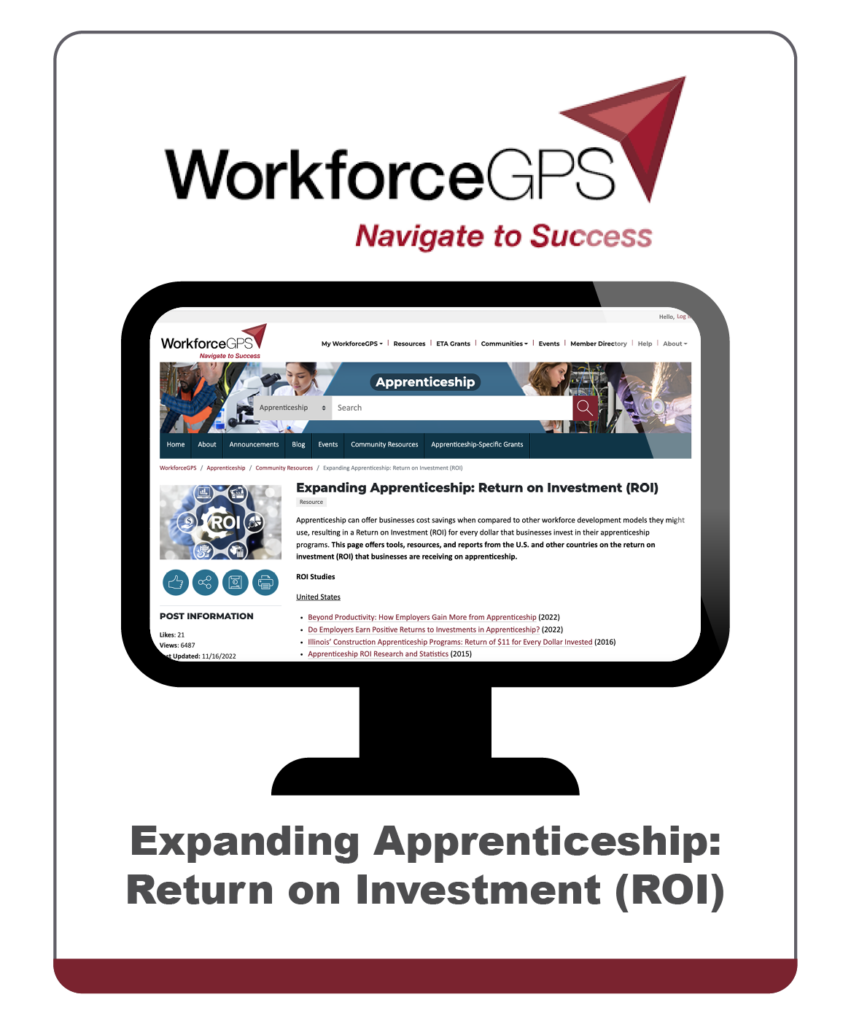
Expanding Apprenticeship: Return on Investment (ROI)
This is the landing page for Apprenticeship ROI resources on the WorkforceGPS website (sponsored by the Employment and Training Administration of the US Department of Labor). It is updated periodically and includes recent publications released as part of the evaluation of the American Apprenticeship Initiative. These resources attest to the value of apprenticeship programs for organizations and for workers.
WorkforceGPS
November 2022
TOPICS: Apprenticeship , Program Evaluation and ROI
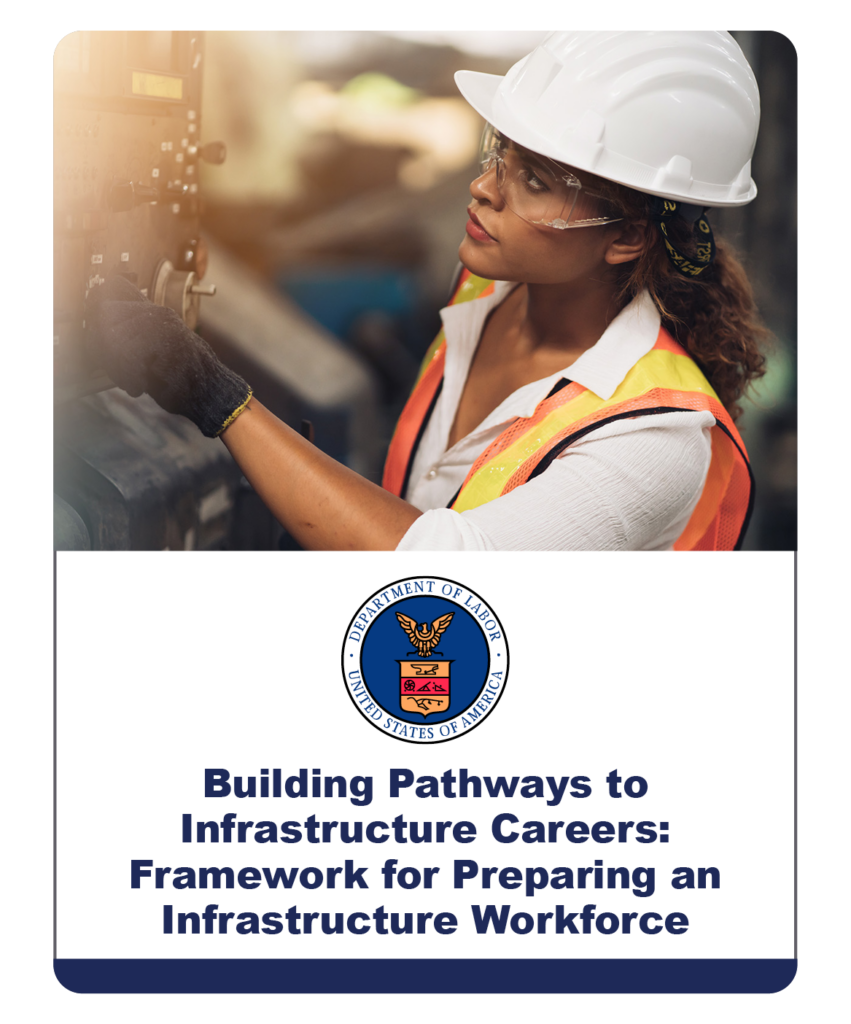
Building Pathways to Infrastructure Careers: Framework for Preparing an Infrastructure Workforce
This resource provides a framework for all workforce stakeholders, including infrastructure project leads, to engage the public workforce system in implementing the Bipartisan Infrastructure Law with strong workforce commitments and proven strategies that produce high-quality education, training, and employment opportunities for all workers.
U.S. Department of Labor, Employment and Training Administration
October 2022
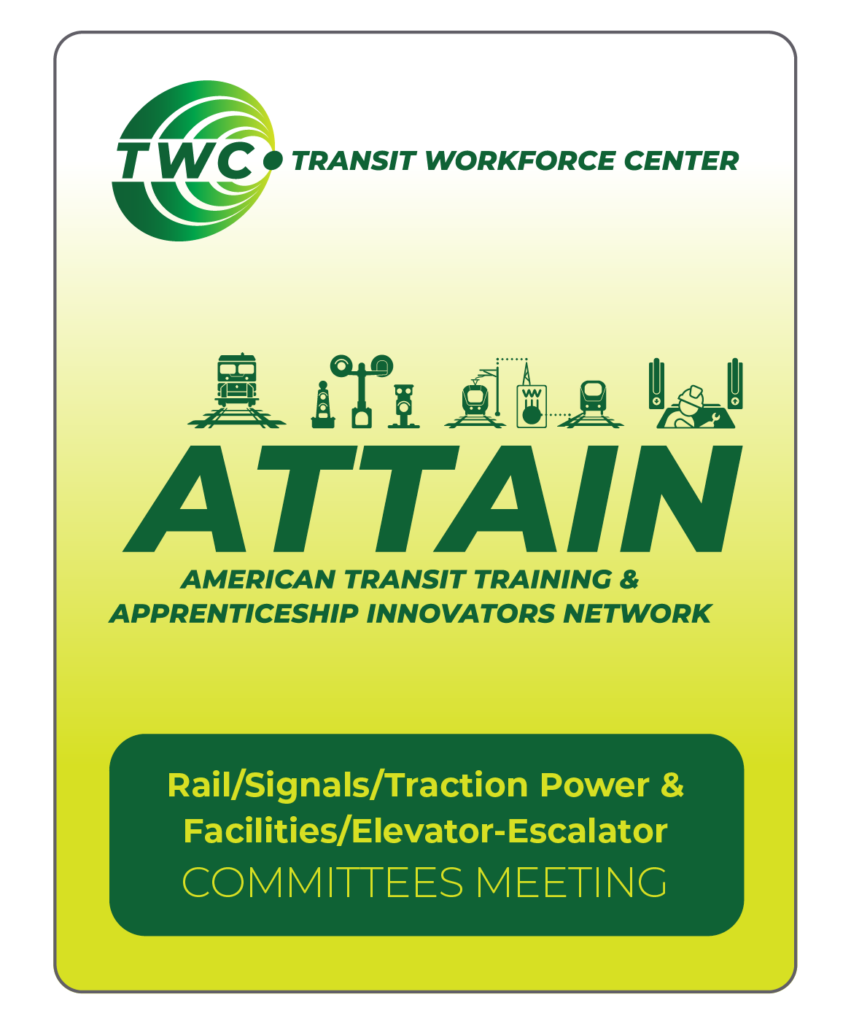
ATTAIN Rail/Signals/Traction Power and Facilities/Elevator-Escalator Committees Meeting
This recorded meeting of the ATTAIN committees for Rail/Signals/Traction Power and Facilities/Elevator-Escalator serves as a resource for transit industry stakeholders and includes presentations on apprenticeship and case studies of successful programs across the country.
Transit Workforce Center
September 2022
TOPICS: Apprenticeship , Career Pathways , Community Engagement , Hiring and Recruitment , Training
The American Transit Training and Apprenticeship Innovators Network (ATTAIN), run by the Transit Workforce Center (TWC), is a peer network created for transit agencies and labor unions to explore new apprenticeship programs or enhance existing programs for their frontline workforce.
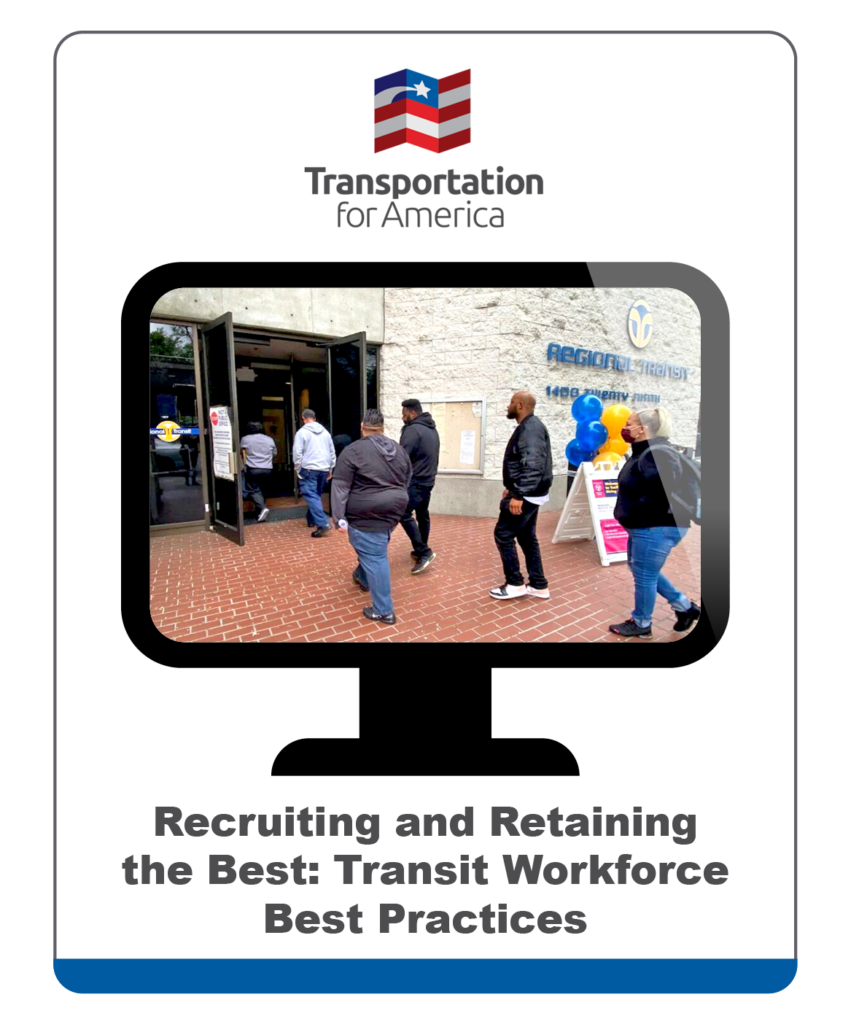
Recruiting and Retaining the Best: Transit Workforce Best Practices
This blog post from Transportation for America details successful strategies and best practices employed by transit agencies to empower their operator and maintenance workforces.
Transportation for America
September 2022
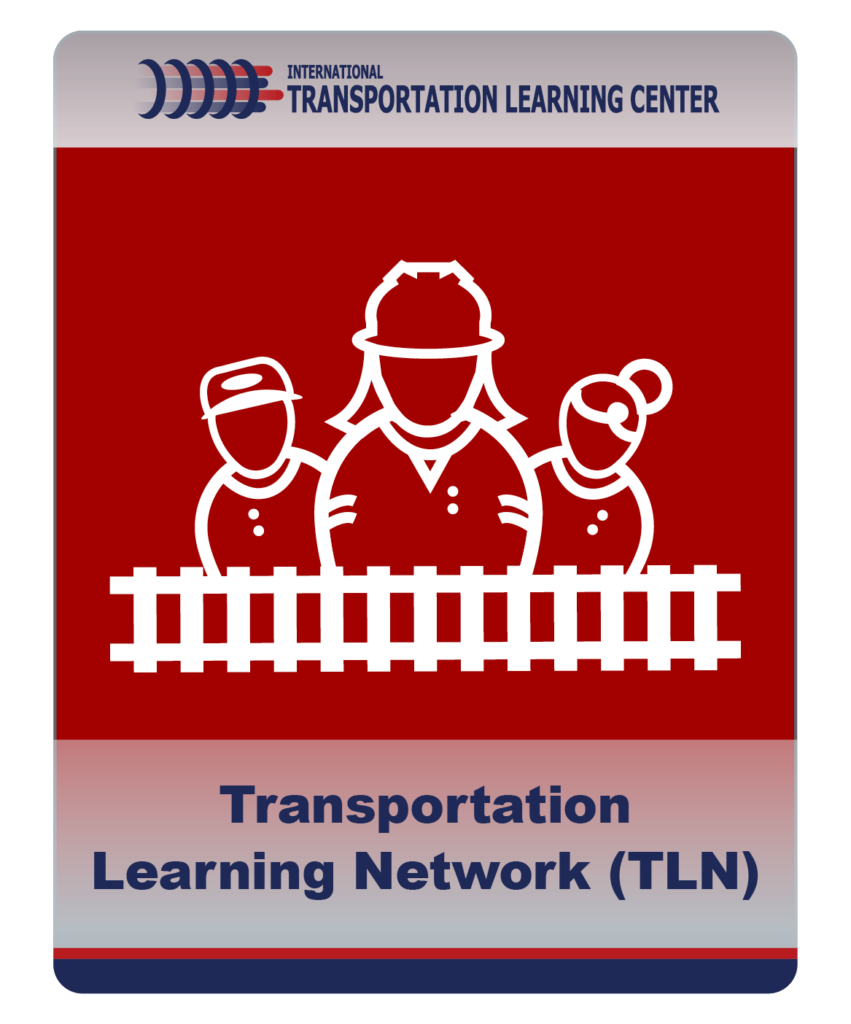
Transportation Learning Network (TLN)
The Transportation Learning Network (TLN) is part of an industry-wide effort aimed at strengthening transit training programs. It is designed and maintained by the International Transportation Learning Center, and provides a platform for accessing industry specific training materials – both for direct self-led online learning and also for download by trainers to use in a classroom or field settings. Topics covered include maintenance of transit elevators and escalators, signals, railcar and traction power.
International Transportation Learning Center
September 2022
TOPICS: Apprenticeship , Safety and Health , Training

Wire Women: Lighting it Up
This illustrated publication tells the stories of women who are undertaking apprenticeship to become union electricians. This resource could be used by transit agencies, unions, or apprenticeship programs as promotional material or for educational purposes.
Sharon Szymanski
September 2022
TOPICS: Apprenticeship , Career Pathways , Community Engagement
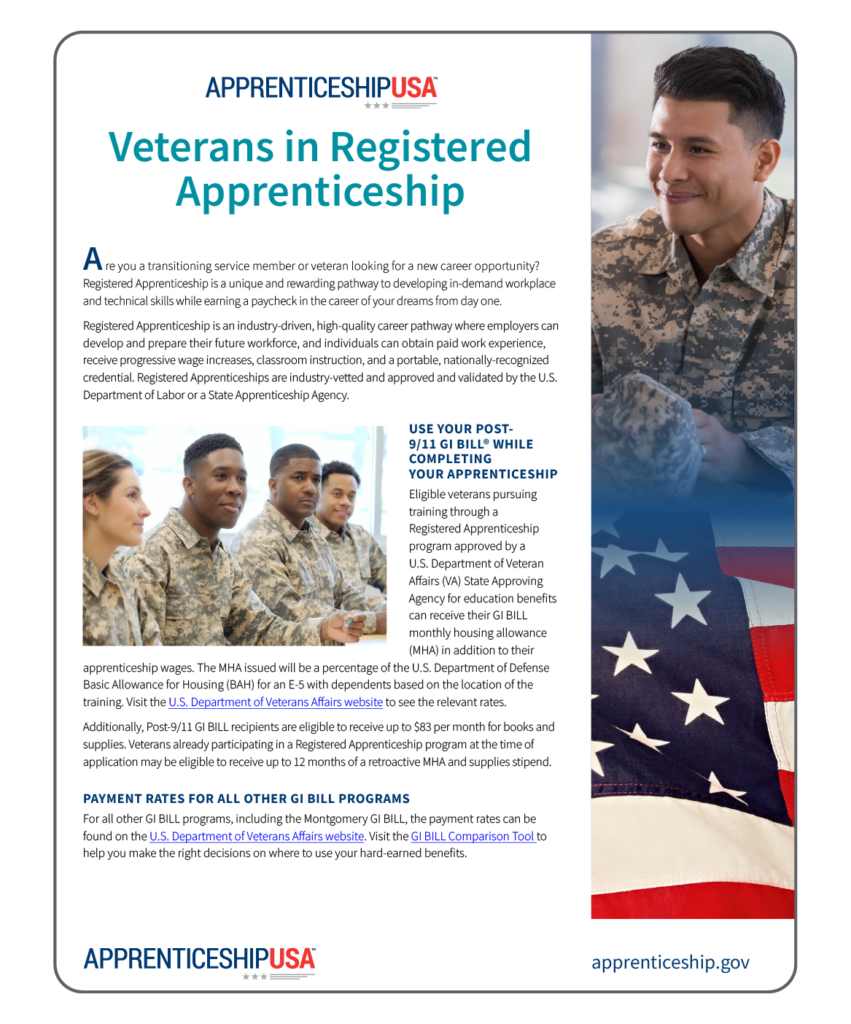
Veterans in Registered Apprenticeship
This fact sheet provides an overview of how veteran-specific public benefits can be applied to support a veteran’s completion of a registered apprenticeship program. It also provides links to resources for more detailed information on apprenticeship resources for service members, employment resources for veterans, and more.
ApprenticeshipUSA
August 2022
TOPICS: Apprenticeship , Community Engagement
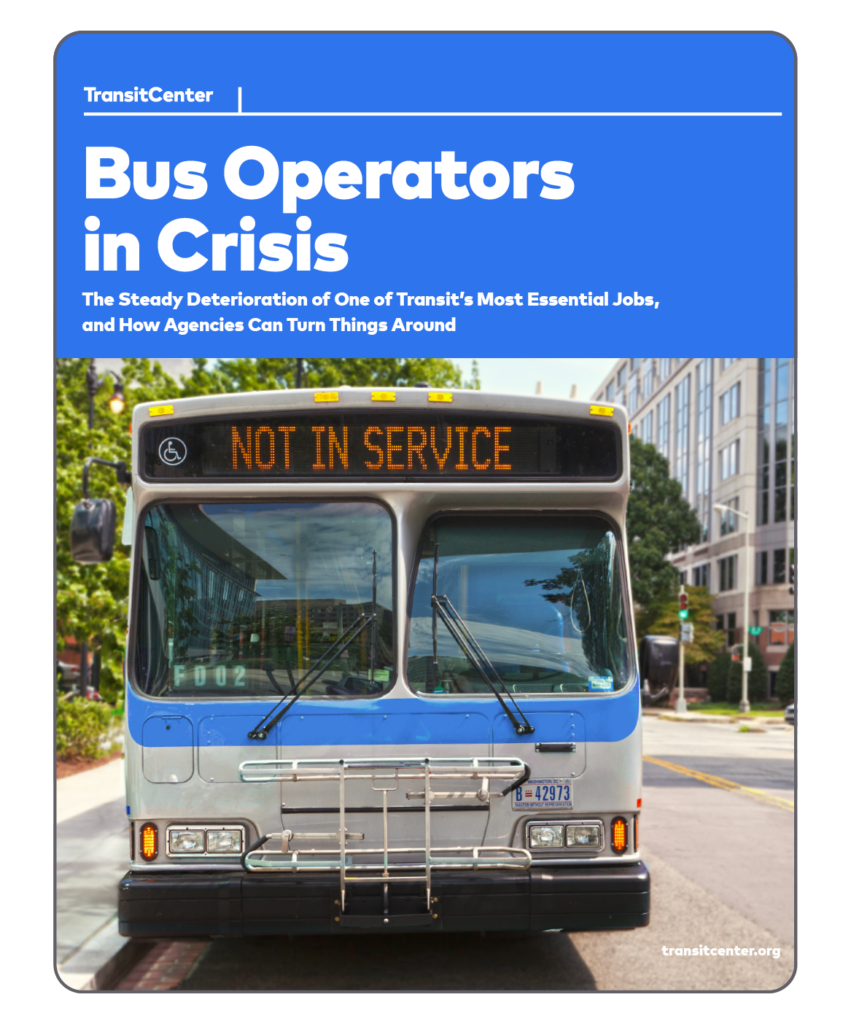
Bus Operators in Crisis
TransitCenter’s report, entitled Bus Operators in Crisis: The Steady Deterioration of One of Transit’s Most Essential Jobs, and How Agencies Can Turn Things Around, analyzes the nationwide phenomenon of bus operator shortages and advocates for enhanced job quality in the occupation. It details the challenges American operators are facing, and offers solutions that transit agencies can take to solve issues locally, as well as steps that state and the federal governments can take to provide agencies with necessary support.
TransitCenter
July 2022
TOPICS: Apprenticeship , Career Pathways , Community Engagement , Hiring and Recruitment , Retention
This resource also includes a link to a webinar hosted in July, 2022 presenting information from the report and slides from the webinar.
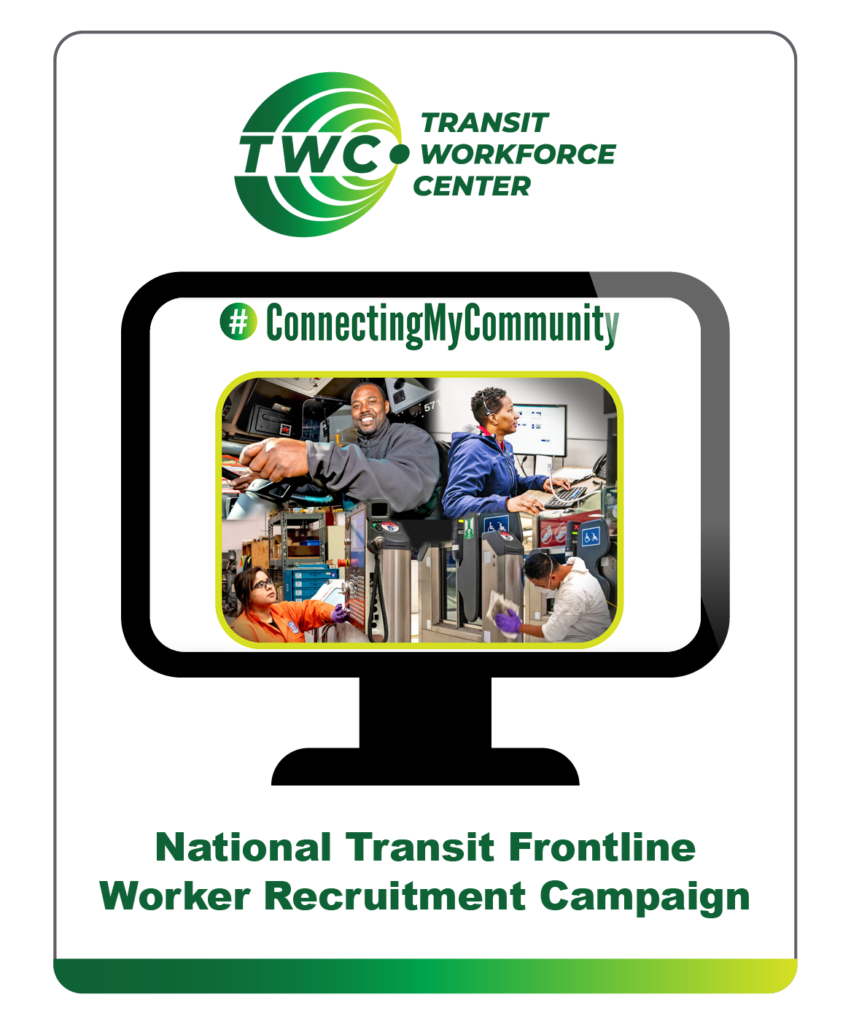
National Transit Frontline Worker Recruitment Campaign
Across the United States, whether large, small, urban, rural, or tribal, transit agencies are facing the challenge of recruiting and retaining drivers, mechanics, and technicians who can operate and maintain the buses of our public transit systems. To help support local transit efforts, TWC is developing the #ConnectingMyCommunity national frontline worker recruitment campaign, coordinated with the Federal Transit Administration (FTA) and industry, labor, and community partners from around the country.
Transit Workforce Center
July 2022
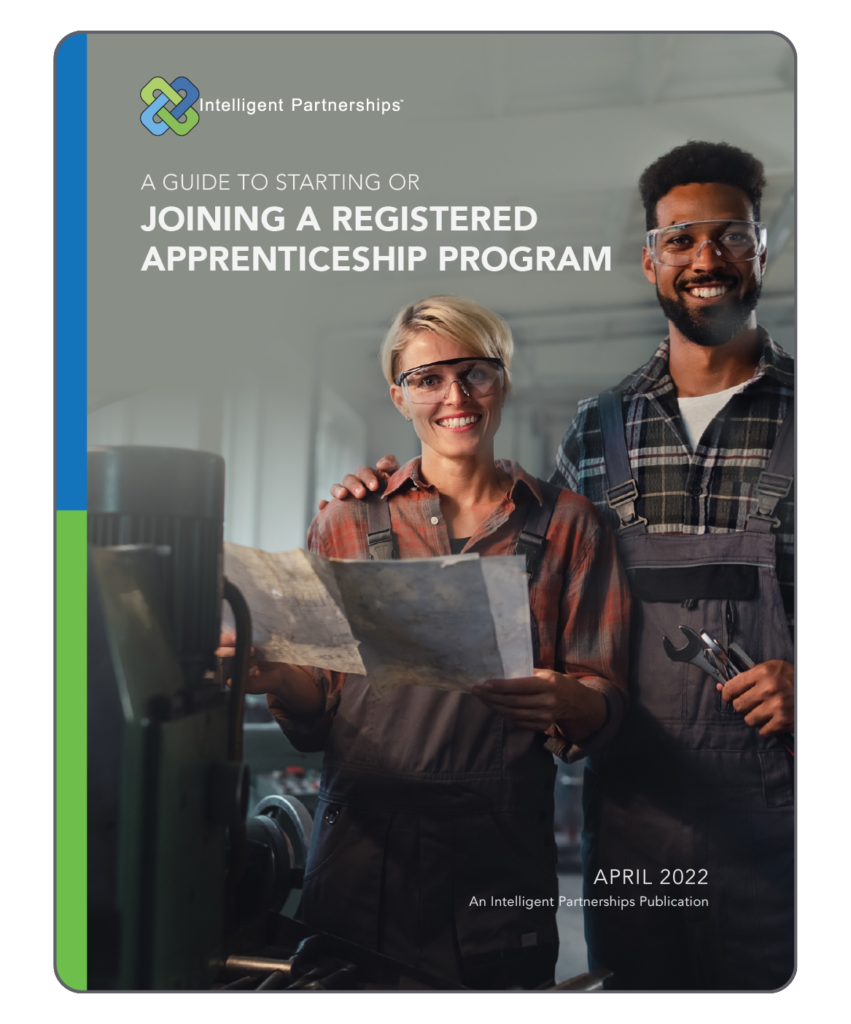
A Guide to Starting or Joining a Registered Apprenticeship Program
This publication provides an overview of registered apprenticeship, the benefits of registered apprenticeships to the employer, and the basic steps to get started.
You can also consult with your state office on registered apprenticeship for technical assistance and support for questions on the apprenticeship model, guidance on each phase of developing a program, connections to training providers, and advice on available funding sources to support apprenticeships: https://www.apprenticeship.gov/about-us/state-offices
Intelligent Partnerships
April 2022
TOPICS: Apprenticeship , Career Pathways , Community Engagement , Policy and Planning , Training
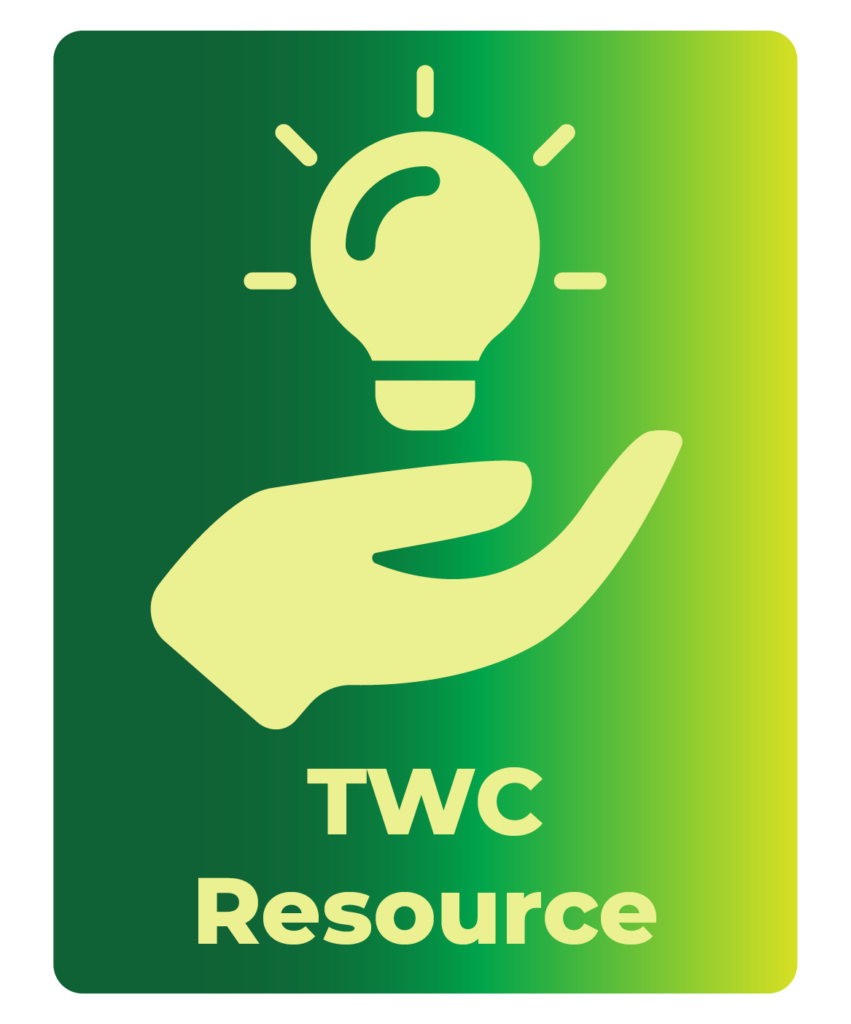
Rural Apprenticeships for Young People: Challenges and Strategies for Success
This report evaluates four rural registered apprenticeship programs in Maine, Arizona, Missouri, and Mississippi and identifies the key strategies in their approaches. It begins with defining rural apprenticeship programs and exploring their obstacles and benefits, and then discusses each of the four cases and concludes with recommendations for decisionmakers seeking to expand apprenticeship access in rural communities.
Urban Institute
August 2021
TOPICS: Apprenticeship , Community Engagement , Policy and Planning
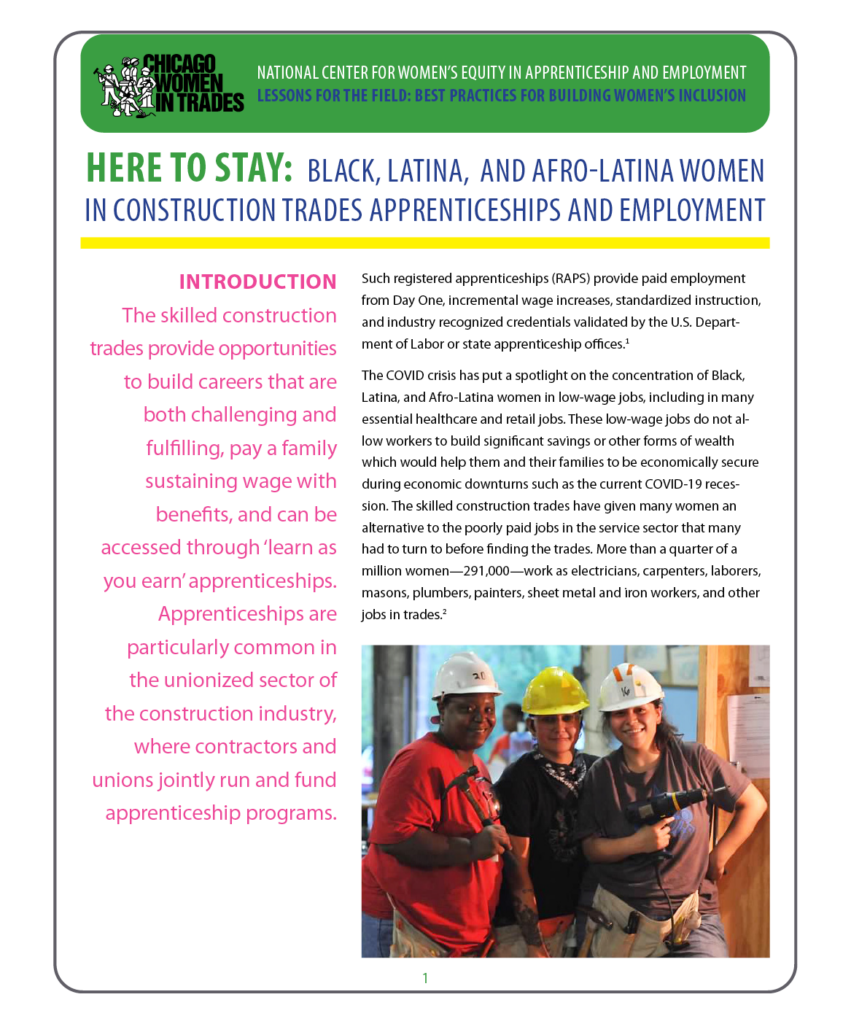
Here to Stay: Black, Latina, and Afro-Latina Women in Construction Trades Apprenticeships and Employment
Chicago Women in the Trades; Institute for Women's Policy Research
March 2021
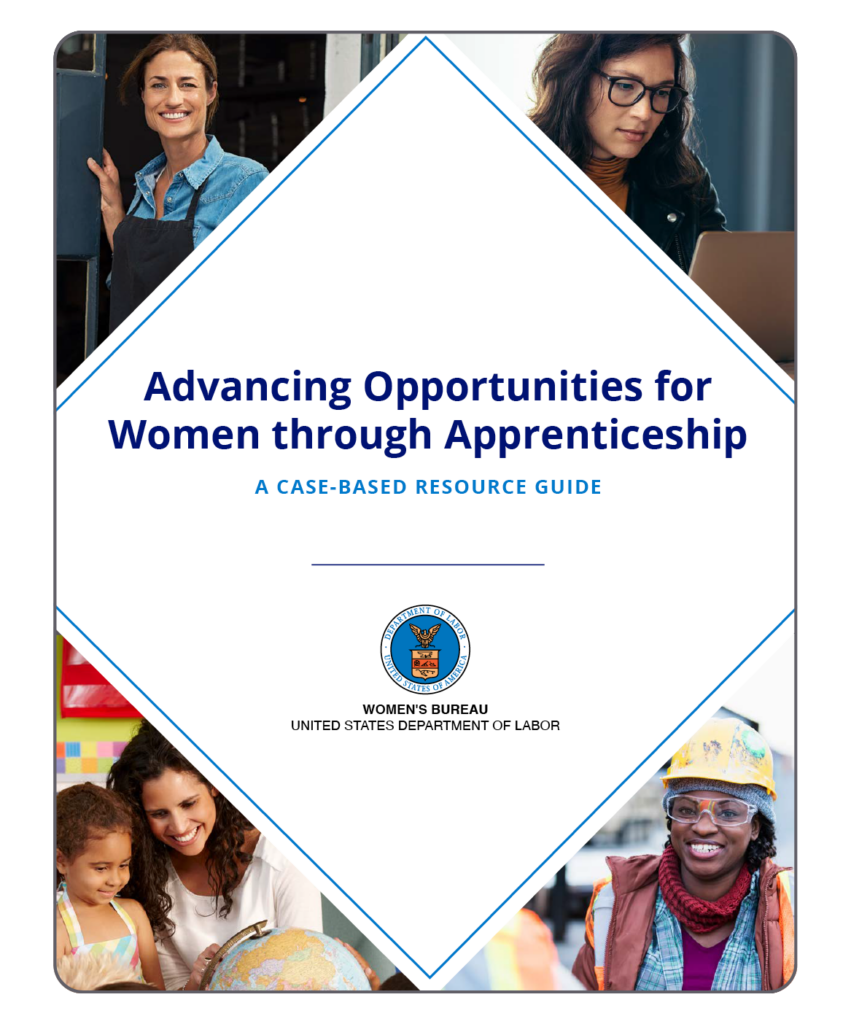
Advancing Opportunities for Women through Apprenticeship: A Case-Based Resource Guide
The Advancing Opportunities for Women through Apprenticeship case-based resource guide provides a framework for meaningful expansion of apprenticeship programs for women. The guide includes case studies on four high-quality pre-apprenticeship and apprenticeship programs in a range of industry sectors.
Department of Labor
TOPICS: Apprenticeship , Career Pathways , Community Engagement , Mentorship , Policy and Planning , Retention
The case studies were developed through on-site visits to the program locations; interviews with program staff, partners, and current and former participants; and a review of program materials and data. They provide information and insights related to partnership development, program design, and outcomes that outline how pre-apprenticeship and apprenticeship programs can help women access family-sustaining jobs and quality career pathways. The guide identifies common strategies across the four programs to help others learn how to create programs that successfully open pathways to in-demand jobs for women through apprenticeships.
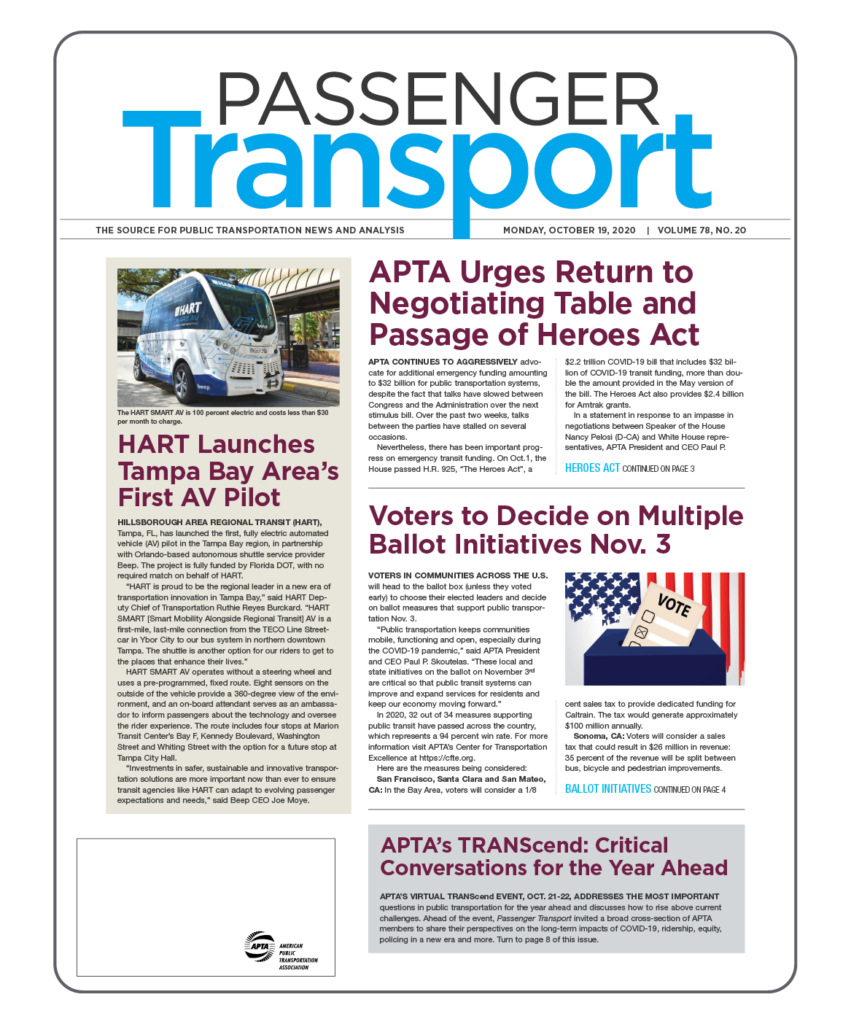
Transit Apprenticeship at Pierce Transit: From the Ground Up
This article in APTA’s Passenger Transport issue discusses the apprenticeship program at Pierce Transit, which is part of a transit apprenticeship initiative and has received technical assistance in structuring their apprenticeship program as well as financial assistance to reimburse some training costs.
American Public Transportation Association; International Transportation Learning Center
October 2020
TOPICS: Apprenticeship , Training
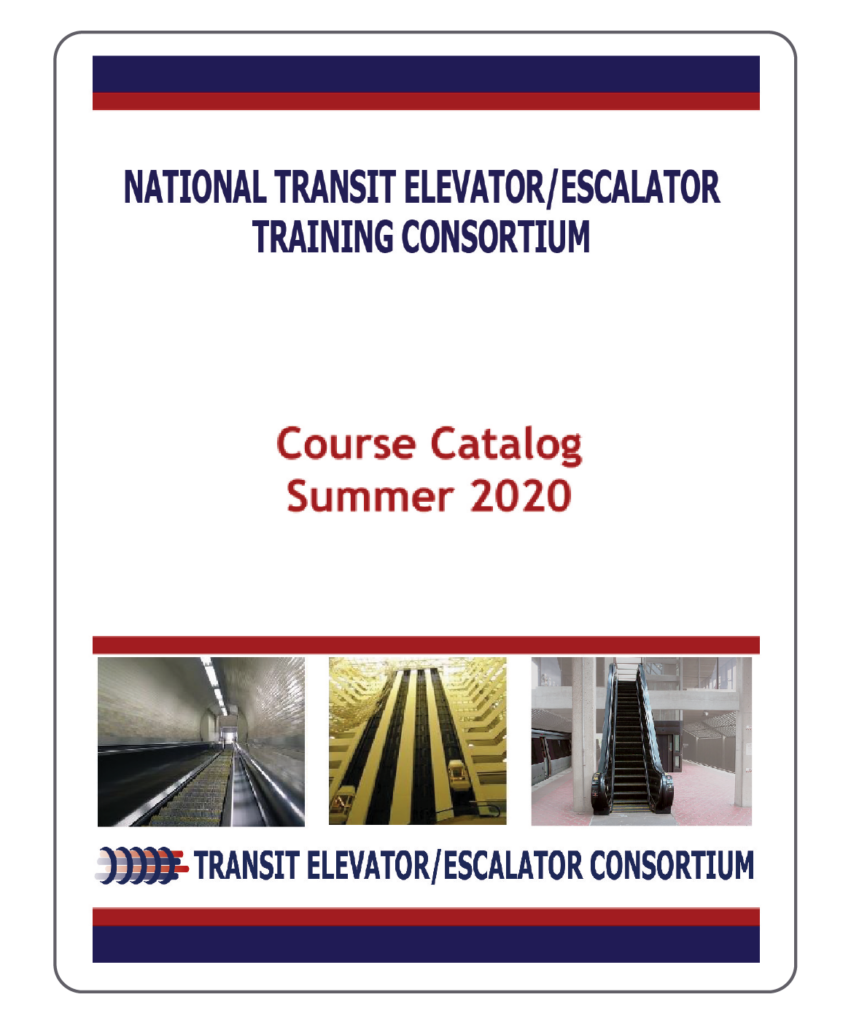
Elevator/Escalator Training Consortium
International Transportation Learning Center
The International Transportation Learning Center (ITLC) organizes multiple national training consortia to develop standards-based national training courseware for frontline occupations in public transportation organizations.
The Transit Elevator-Escalator Training Consortium (the Consortium) was the first in an ongoing series of industry-wide collaborative programs to develop integrated systems of training for key frontline occupations in public transportation. Building on national training standards developed by industry Subject Matter Experts (SMEs) from 2006 to 2010 and then adopted by the American Public Transportation Association (APTA), the Consortium developed a full set of standardized national courseware to support training and apprenticeship programs for transit elevator/escalator (El-Es) technicians. The curriculum and courseware development team was composed of subject matter experts (SMEs) from five member agencies and unions from across the country. Membership of the Consortium consists of transit systems that maintain their vertical transportation equipment in-house, rather than relying on outside contractors. Equipment manufacturers contributed access to their technical drawings and manuals to enrich the courseware.
The list of courseware as of Summer 2020 is contained in the attached catalog.

What We Think We Learned: Transit Workforce Interview Themes
This report is a synopsis of the transit industry and workforce development interviews conducted in Greater Philadelphia from December 2019 to February 2020. The research team emphasized three distinct areas where the need for improvement should be elevated: Pipeline Development, Pathways, and Processes. While there are several ongoing successes within the transit industry, this document strives to focus on key identified gaps most conducive for joint problem-solving.
Delaware Valley Regional Planning Commission
March 2020
TOPICS: Apprenticeship , Career Pathways , Policy and Planning , Retention , Training
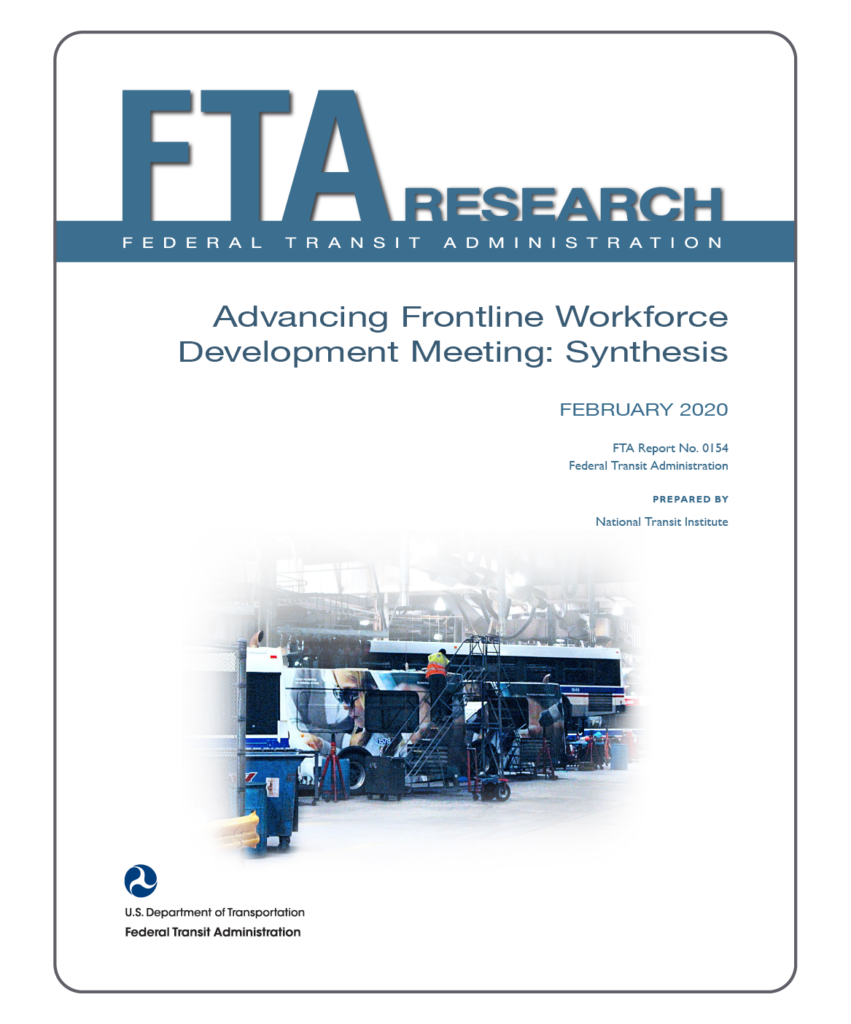
Advancing Frontline Workforce Development Meeting: Synthesis
This report synthesizes findings from a two-day gathering of more than two dozen transit industry labor and management representatives who engaged in in-depth discussions on frontline workforce training needs across the U.S. The purpose of the meeting was to identify immediate, short-term, and long-term training needs for the frontline public transportation workforce in the U.S. and ways to connect apprenticeship and formal training programs to support these needs.
National Transit Institute; Federal Transit Administration; International Transportation Learning Center
February 2020
TOPICS: Apprenticeship , Hiring and Recruitment , Policy and Planning , Training
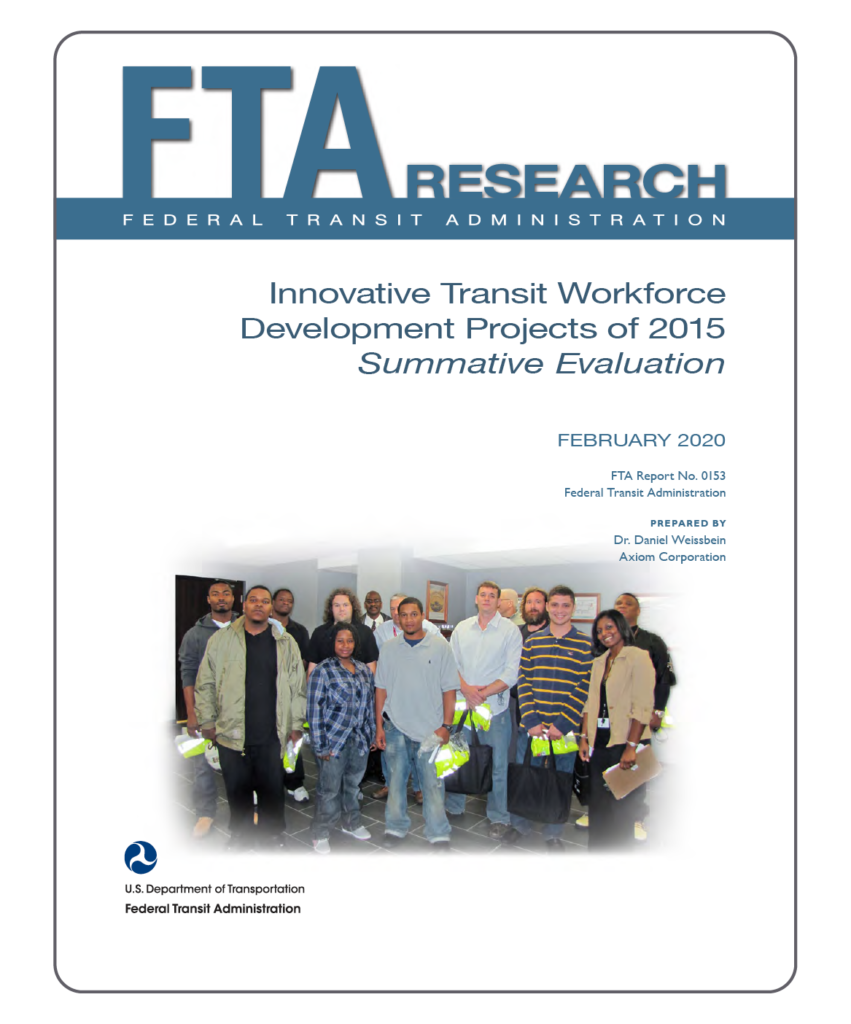
Innovative Transit Workforce Development Projects of 2015: Summative Evaluation
This report provides the results of an evaluation of Innovative Transit Workforce Development Program projects awarded in Fiscal Year 2015. Based on a competitive application process, FTA awarded 16 workforce development projects to transit authorities, higher education institutions, Native American tribes, and nonprofit organizations individually or as a consortium.
Federal Transit Administration
February 2020
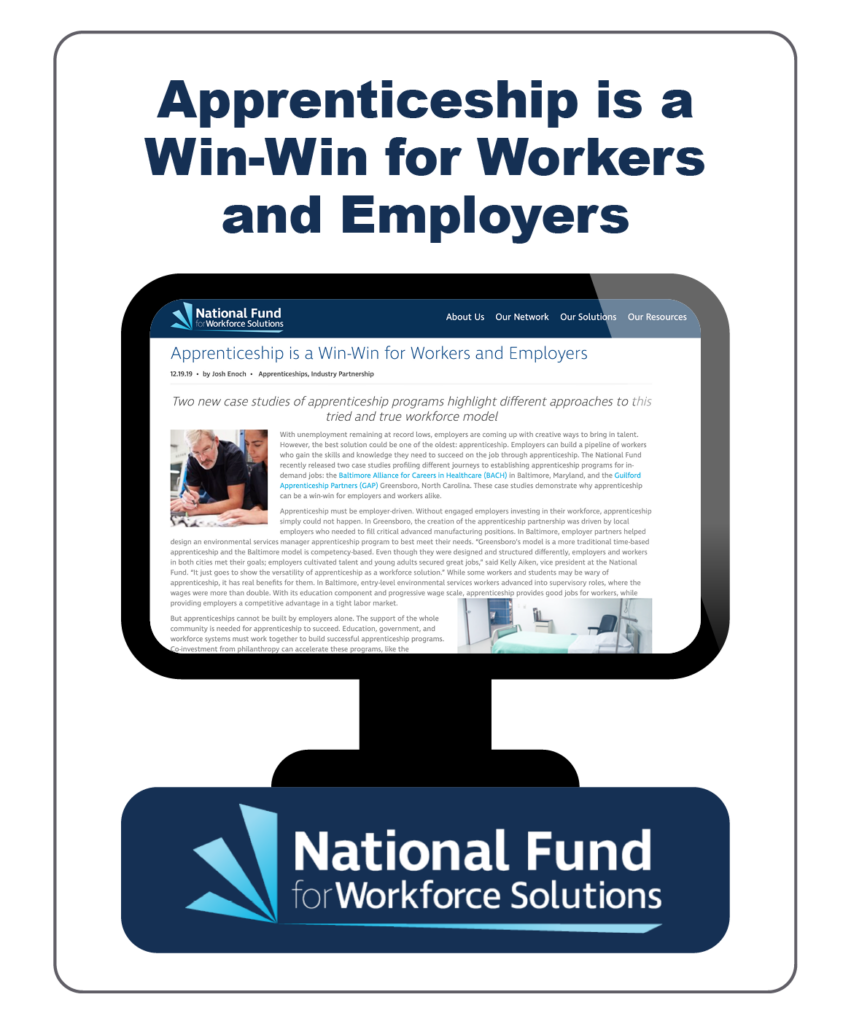
Apprenticeship is a Win-Win for Workers and Employers
These two case studies provide an analysis of apprenticeship programs at Baltimore Alliance for Careers in Healthcare (BACH) in Baltimore, Maryland, and the Guilford Apprenticeship Partners (GAP) in Greensboro, North Carolina. The case studies highlight the different approaches each organization used for their apprenticeship programs.
National Fund for Workforce Solutions
December 2019
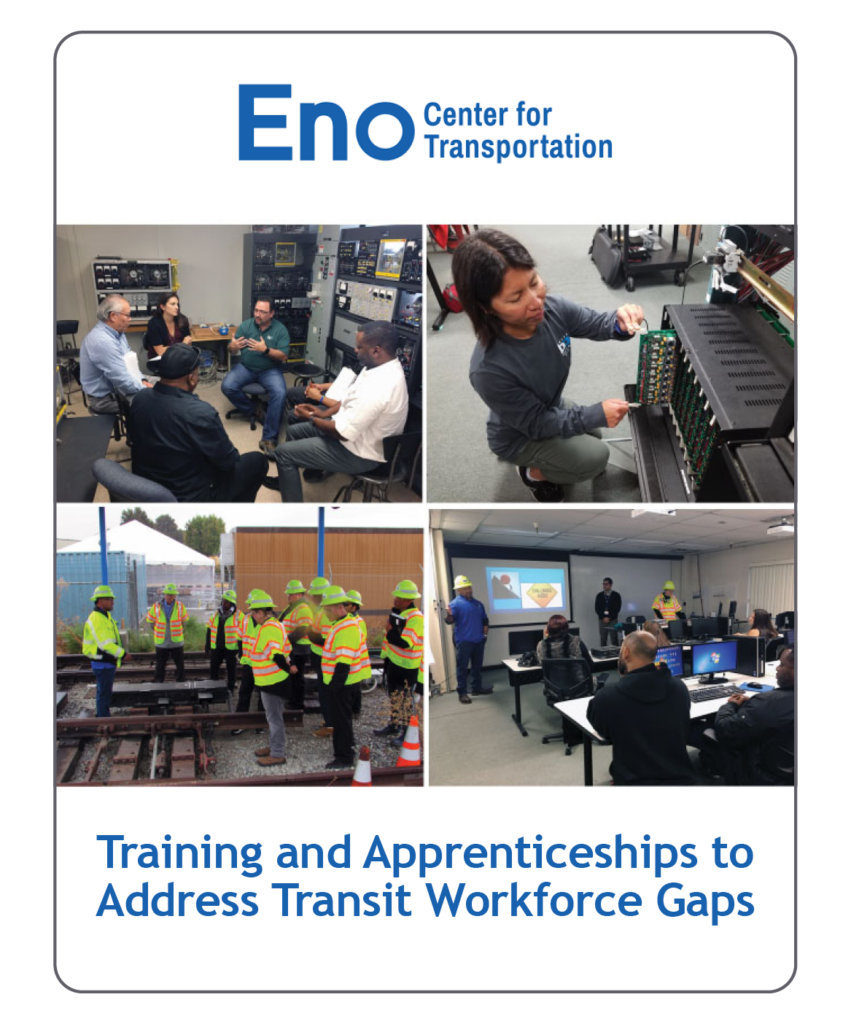
Training and Apprenticeships to Address Transit Workforce Gaps
This piece, penned by Jack Clark of the International Transportation Learning Center (ITLC), explores the role of training and apprenticeship programs in meeting workforce needs in transit, with a focus on operators. It discusses a few leading examples of apprenticeship programs in transit, as well as the role of mentorship in a strong apprenticeship program.
Eno Center for Transporation
August 2019
TOPICS: Apprenticeship , Career Pathways , Mentorship , Training
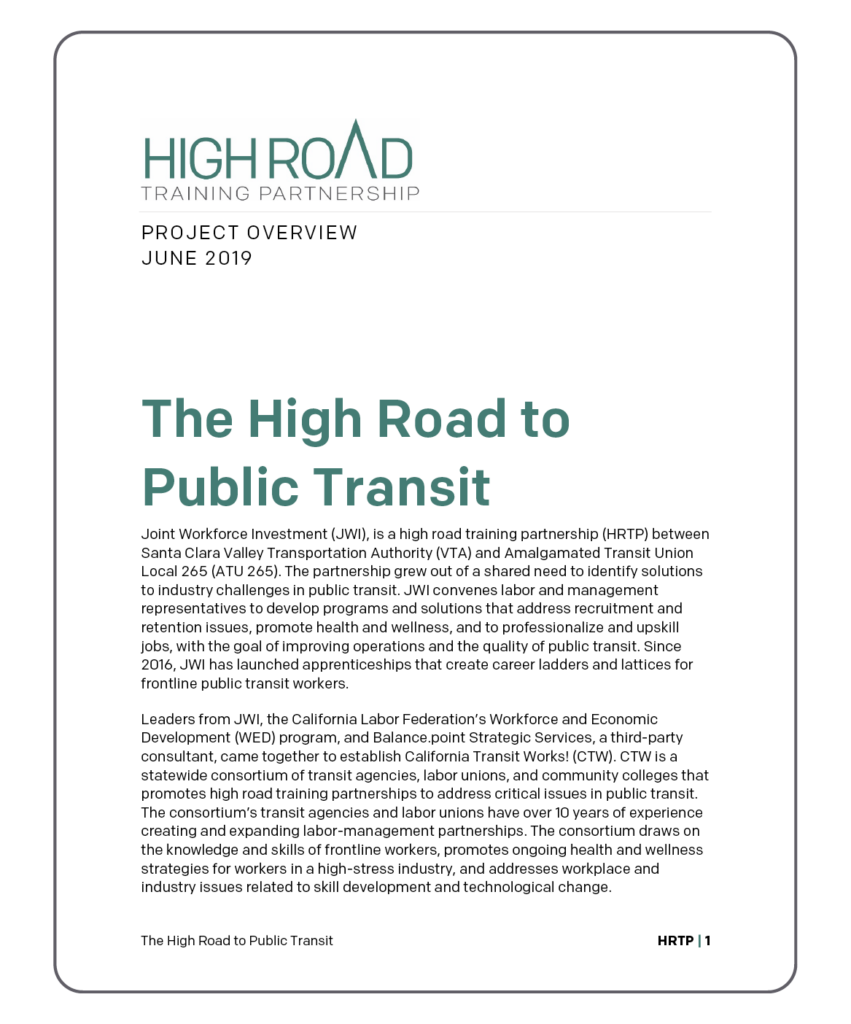
The High Road to Public Transit
This report provides a project overview of the high road training partnership (HRTP) in California between Santa Clara Valley Transportation Authority (VTA) and ATU Local 265 and the formation of California Transit Works (CTW).
California Workforce Development Board
June 2019
TOPICS: Apprenticeship , Labor-Management Partnerships , Mentorship
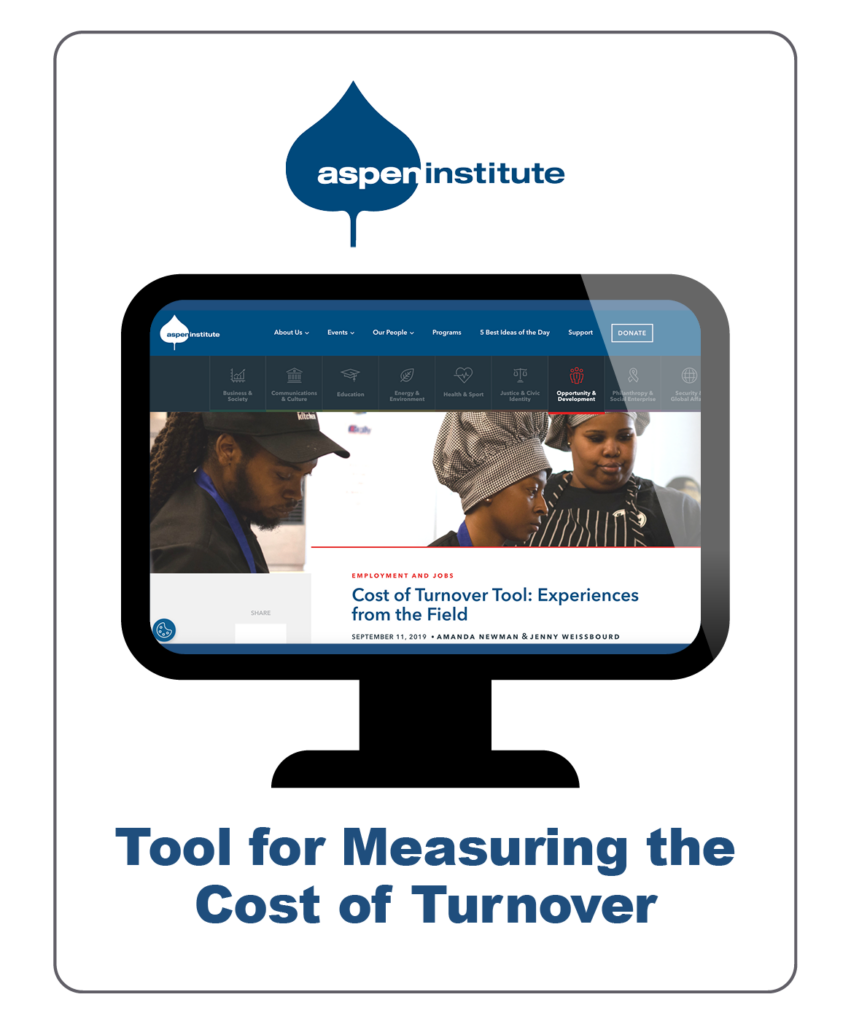
Tool for Measuring the Cost of Turnover
This Cost of Turnover Tool is a simple, “back of the envelope” calculator to help estimate how much it costs to replace staff. The tool can be useful for transit agencies looking to understand the costs of a low retention rate, or those looking to calculate the return-on-investment of mentoring or apprenticeship programs.
Aspen Institute
March 2019
TOPICS: Apprenticeship , Mentorship , Policy and Planning , Program Evaluation and ROI , Retention
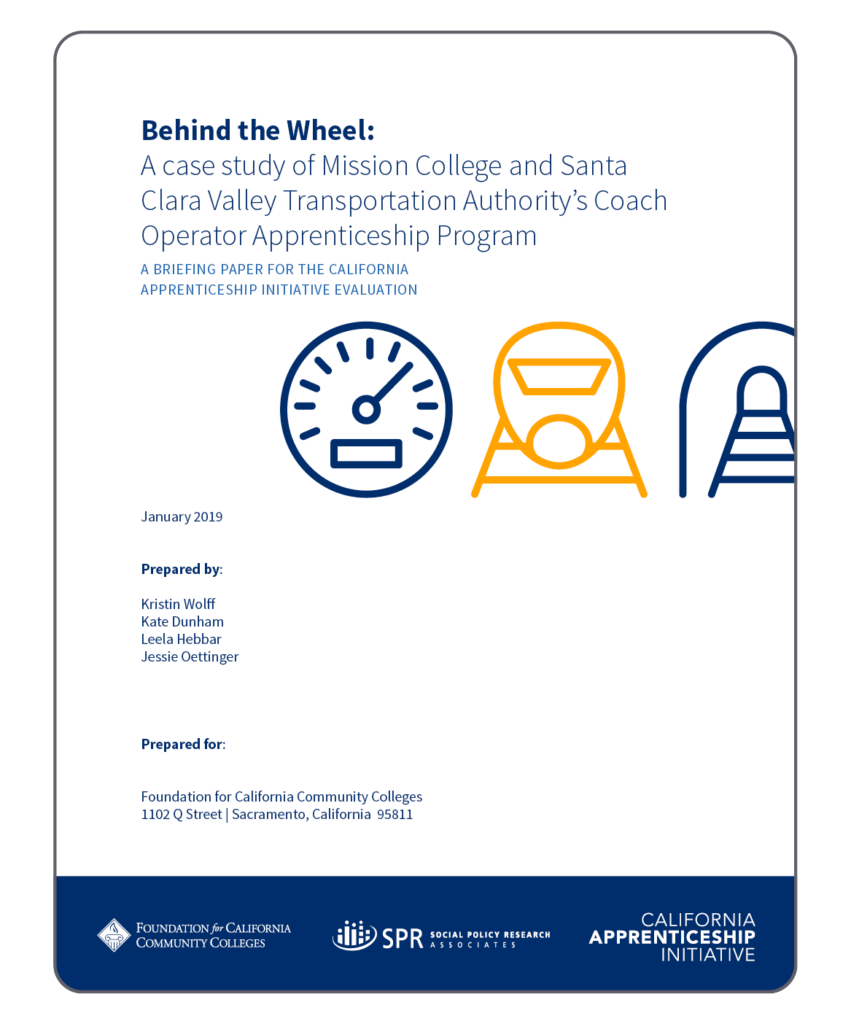
Behind the Wheel
This report, Behind the Wheel: A case study of Mission College and Santa Clara Valley Transportation Authority’s Coach Operator Apprenticeship Program, is part of the Social Policy Research Associates’ evaluation of the California Apprenticeship Initiative. The case study describes the development of the Coach Operator and Transportation Apprenticeship, including why the partners chose an apprenticeship model to meet their training needs, how the program was developed and structured, and what apprentices and employers report about their experiences in the program.
Foundation for California Community Colleges; Social Policy Research Associates
January 2019
TOPICS: Apprenticeship , Career Pathways , Hiring and Recruitment , Training
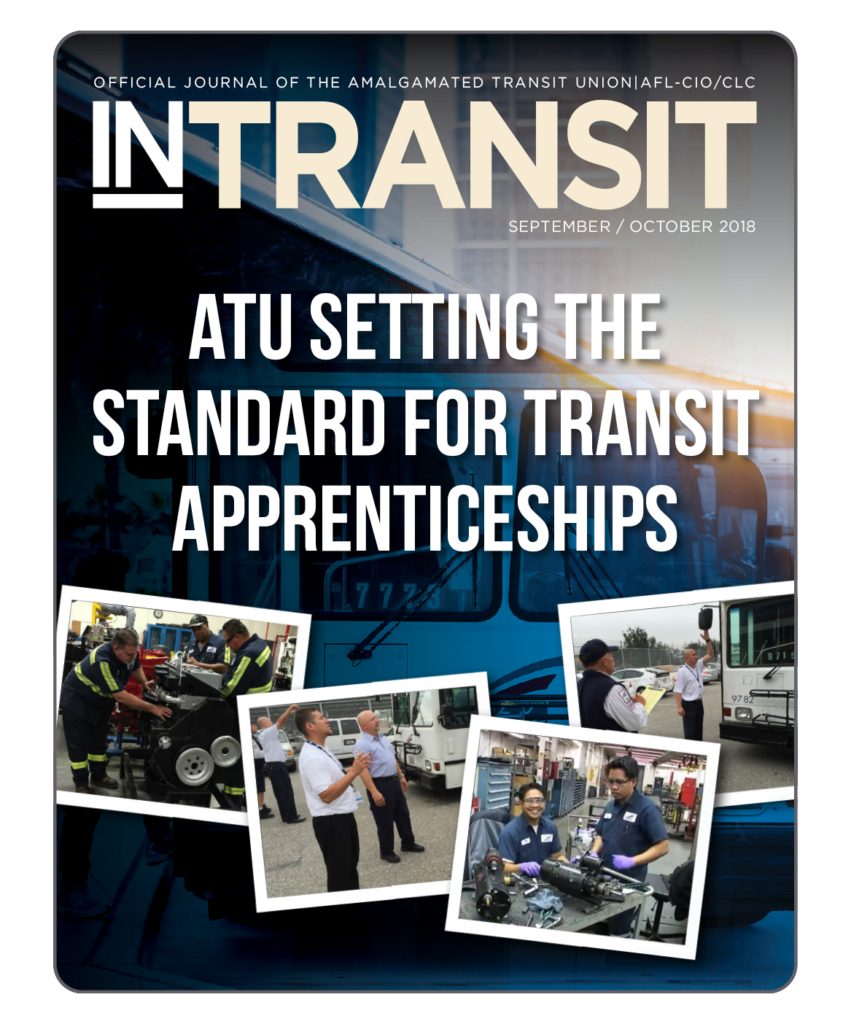
Setting the Standard for Transit Apprenticeships
This article in In Transit summarizes The Amalgamated Transit Union’s (ATU’s) and the International Transportation Learning Center’s (ITLC’s) efforts to promote apprenticeship program development. It discusses apprenticeship programs at several transit agencies and ATU locals, as well as the role of mentorship in a successful apprenticeship program.
Amalgamated Transit Union
September 2018
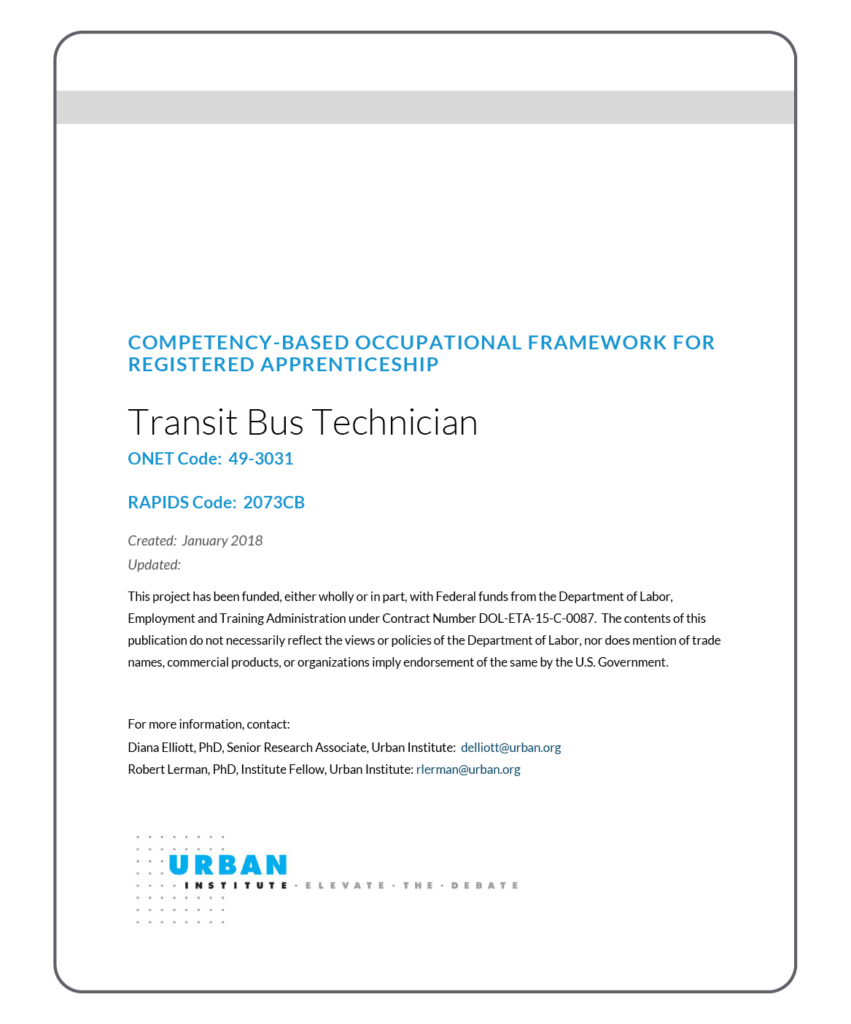
Bus Maintenance Apprenticeship Framework
The Bus Maintenance Apprenticeship Framework was developed by the National Bus Maintenance Apprenticeship Committee and approved by the U.S. DOL. It is a competency based framework that includes all of the tasks an apprentice should be able to demonstrate as a result of the training. Tasks are based on the ASE task list and APTA training standards. It is only a guide, locations can add or remove tasks to suit their individual operations.
The framework spreadsheet was developed by ITLC as a more in-depth and customizable version of the Bus Maintenance Apprenticeship Framework. Note the various tabs at the bottom for each Job Function.
International Transportation Learning Center; The Urban Institute
January 2018
TOPICS: Apprenticeship , Low-No , Training
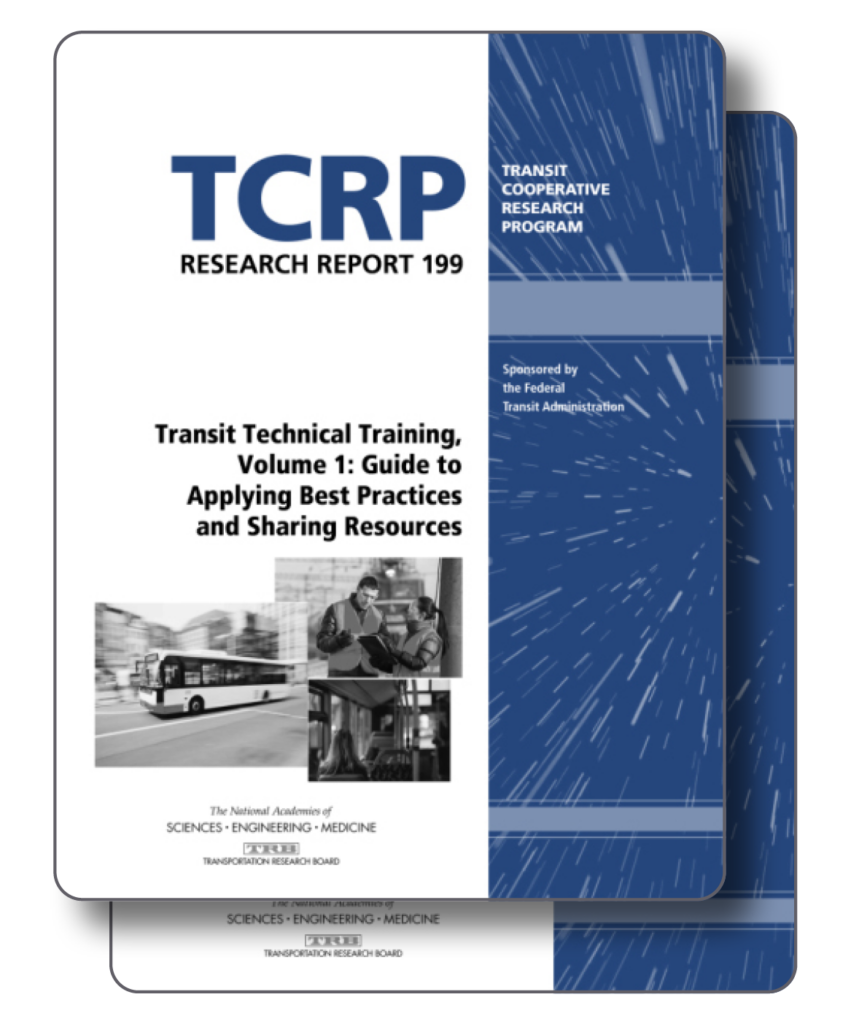
TCRP Research Report 199: Transit Technical Training (Volumes 1 & 2)
TCRP Research Report 199: Transit Technical Training is a two-volume set that presents guidance on technical training programs and the implementation of those for transportation agencies.
The report’s first volume, Guide to Applying Best Practices and Sharing Resources, documents the best models of technical training programs serving U.S. and international transportation agencies and related industries.
The second volume, Guide to Overcoming Barriers to Implementing Best and Innovative Training, provides public transportation agencies with best practices, strategies, and resources to assist with the implementation of effective and innovative training programs and techniques for frontline employees.
Transit Cooperative Research Program (TCRP)
January 2018
TOPICS: Apprenticeship , Safety and Health , Training
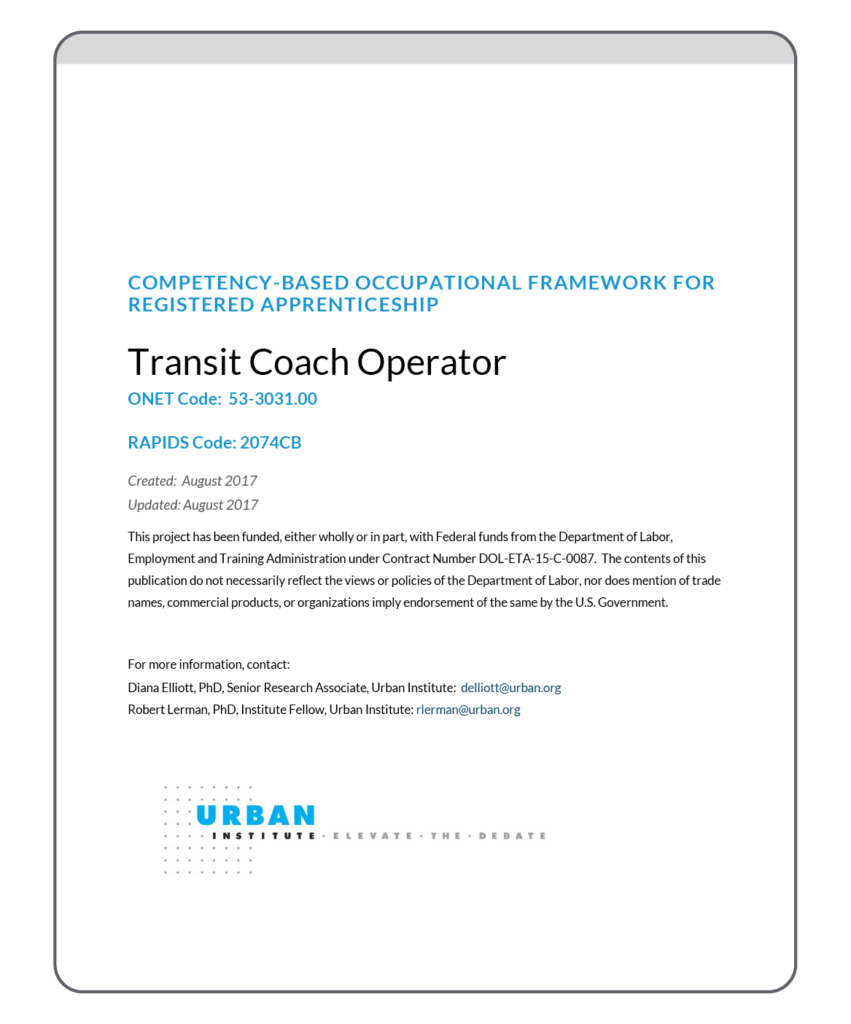
Transit Coach Operator Competency-Based Framework
This is the full Competency-Based Occupational Framework for Registered Apprenticeship for transit coach operator/bus operators.
The Urban Institute & International Transportation Learning Center
August 2017
TOPICS: Apprenticeship , Low-No , Training
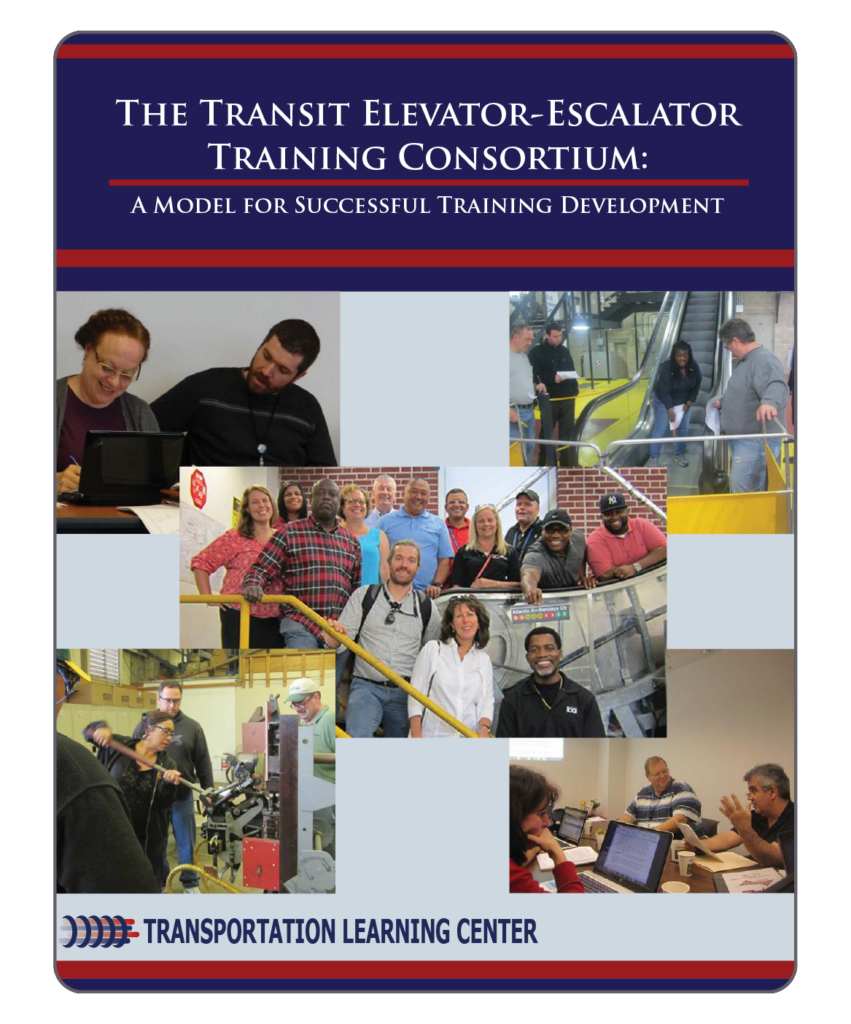
The Transit Elevator-Escalator Training Consortium: A Model for Successful Training Development
A report on the process, products and outcomes related to the first National consortium for development of training for public transportation maintenance employees. This joint labor-management effort set a proven model for multiple other similar consortia. Products include – instruction ready courseware, a nationally recognized apprenticeship program for transit maintenance elevator/escalator maintainers and train-the-trainer program.
International Transportation Learning Center
September 2016
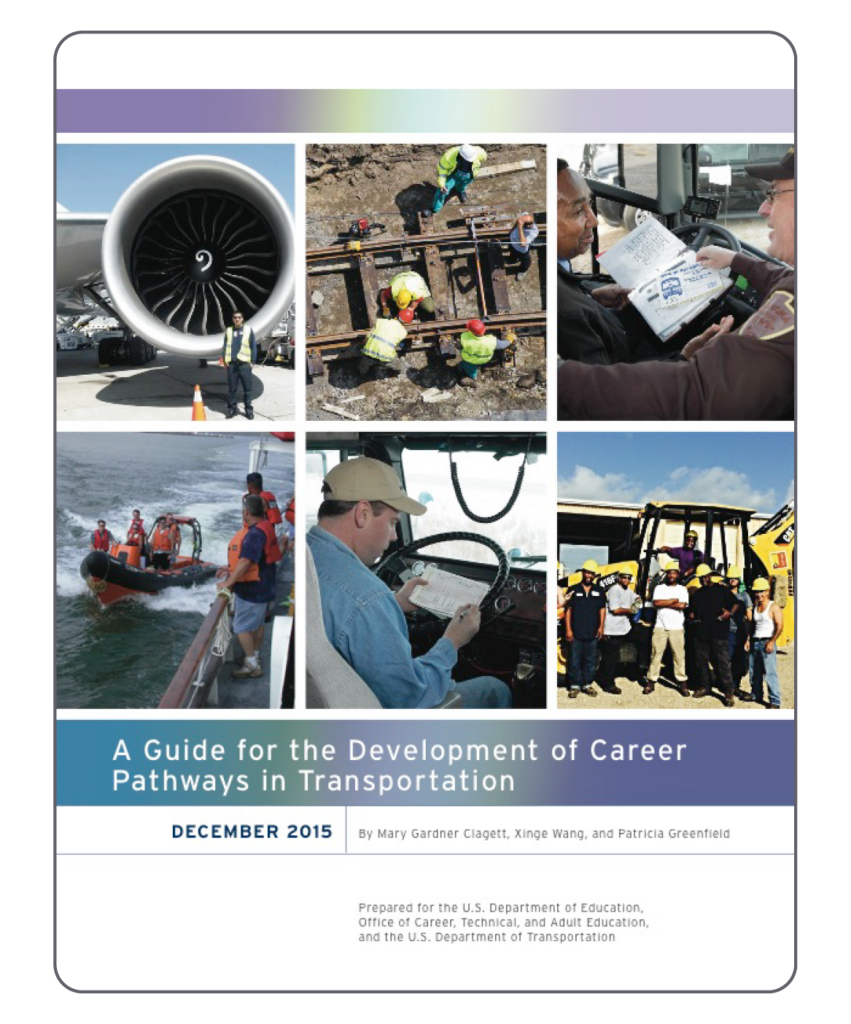
A Guide for the Development of Career Pathways in Transportation
This guide outlines the steps that transportation industry stakeholders can take to develop or expand Career Pathways to focus on the skills, competencies, and credentials needed for high-demand jobs in the transportation industry and its subsectors.
U.S. Department of Education; Jobs for the Future; International Transportation Learning Center
December 2015
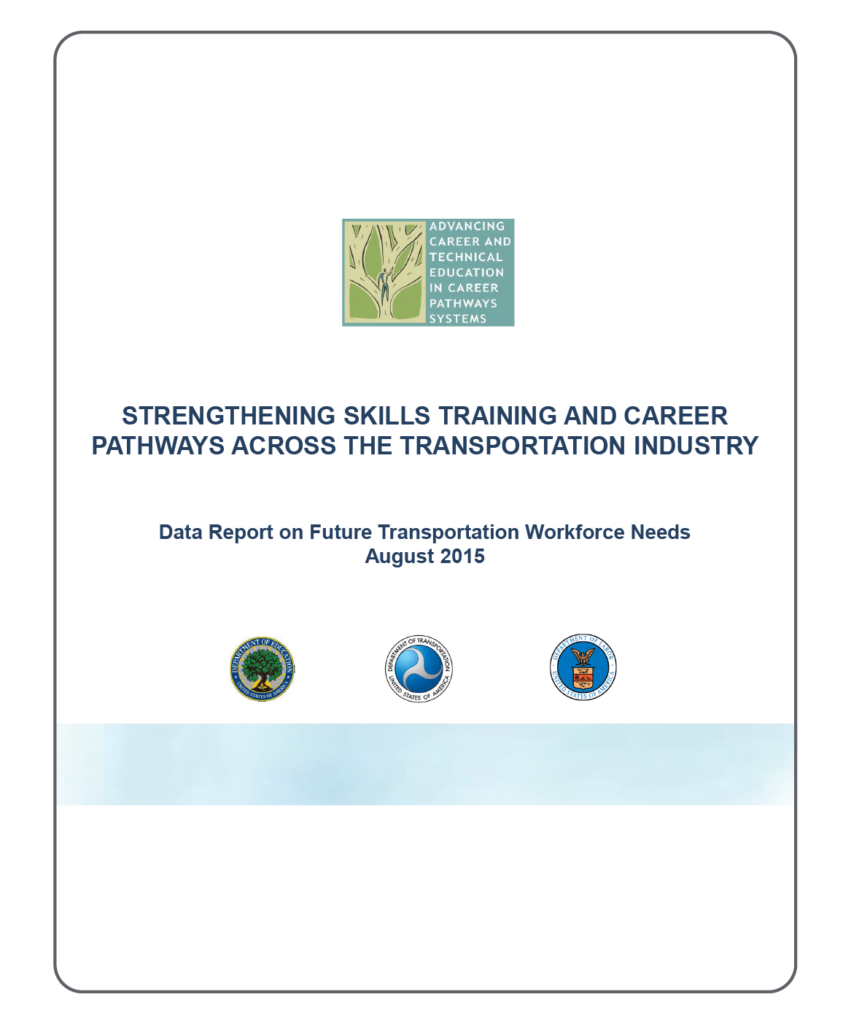
Strengthening Skills Training and Career Pathways Across the Transportation Industry
This report identifies high-demand jobs with good wages in transportation, discusses the role data plays in identifying future workforce skill needs, and analyzes the patterns in the education and work experience required for entry, as well as on-the-job training required for new entrants to gain full competency.
U.S. Department of Education, Office of Career, Technical, and Adult Education; U.S. Department of Transportation; U.S. Department of Labor
August 2015
TOPICS: Apprenticeship , Career Pathways , Hiring and Recruitment , Training
The Office of Career, Technical, and Adult Education (OCTAE) and the Department of Transportation acknowledge the important contributions to this report made by the following people: Xinge Wang, Deputy Director, and Jack Clark, Executive Director, Transportation Learning Center; and Mary Clagett, Director for Workforce Policy, Lois Joy, Senior Program Manager, and Dudney Sylla, Program Manager, Jobs for the Future, for their analysis and writing.
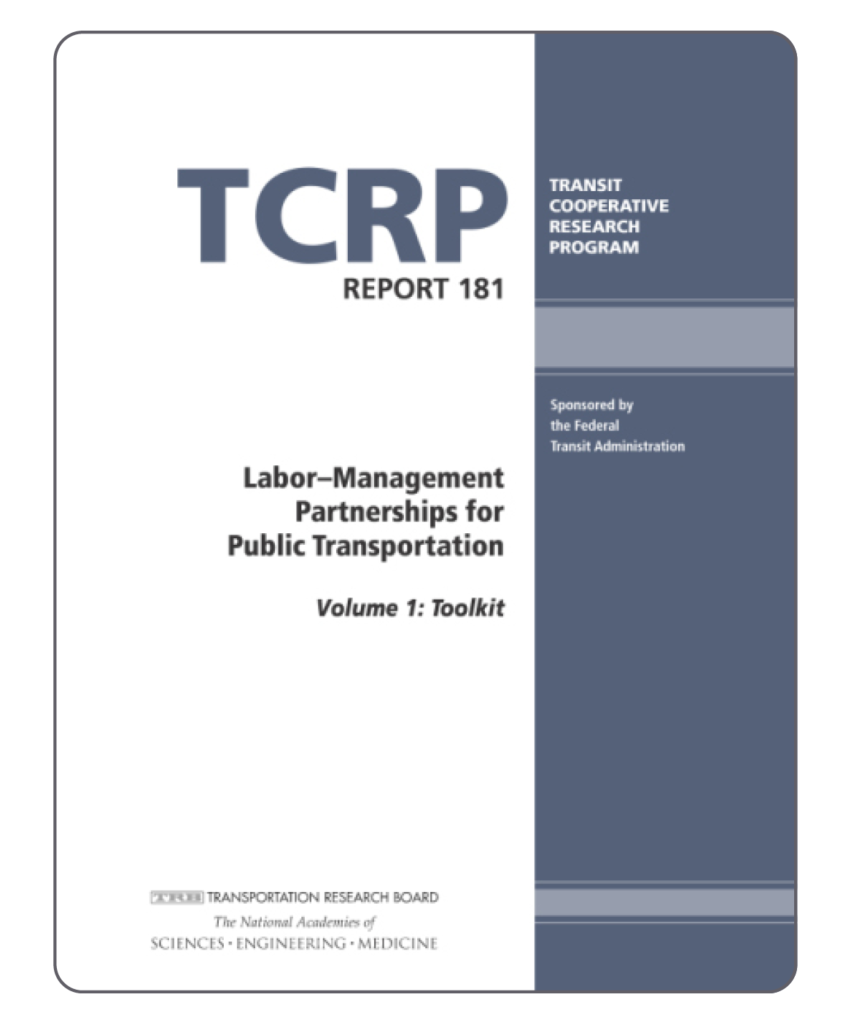
Labor-Management Partnerships for Public Transportation, Volume 1: Toolkit
This toolkit provides resources for public transportation management and labor union leaders to establish, manage, and improve labor-management partnerships. It includes a description of the development of a labor-management partnership charter, recommended actions for both management and labor union leaders, and a workshop framework to prepare management and union representatives with essential skills for establishing and managing labor-management partnerships.
Transit Cooperative Research Program
January 2015
TOPICS: Apprenticeship , Labor-Management Partnerships , Training
Volume 2 of this report provides background material that was used to develop this toolkit.
Contributor(s): National Academies of Sciences, Engineering, and Medicine; Transportation Research Board; Transit Cooperative Research Program; Scott Baker; Chuyuan (Viktor) Zhong; Douglas Taylor; William F. Scott; Richard Plante
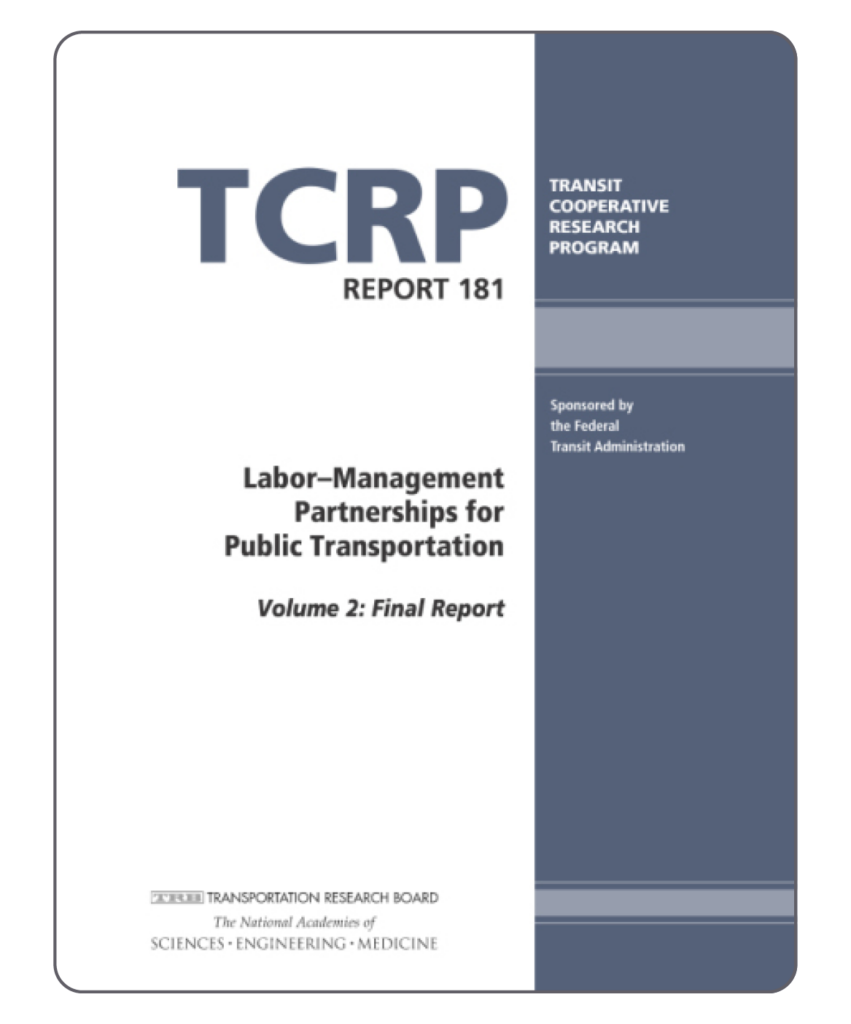
Labor-Management Partnerships for Public Transportation, Volume 2: Final Report
This TCRP report documents the materials used to develop the Volume 1: Toolkit, including an industry survey and case studies. Volume 1 provides resources for public transportation management and labor union leaders to establish, manage, and improve labor–management partnerships.
Transit Cooperative Research Program
January 2015
TOPICS: Apprenticeship , Labor-Management Partnerships , Training
Contributor(s): National Academies of Sciences, Engineering, and Medicine; Transportation Research Board; Transit Cooperative Research Program; Scott Baker; Chuyuan (Viktor) Zhong; Douglas Taylor; William F. Scott; Richard Plante
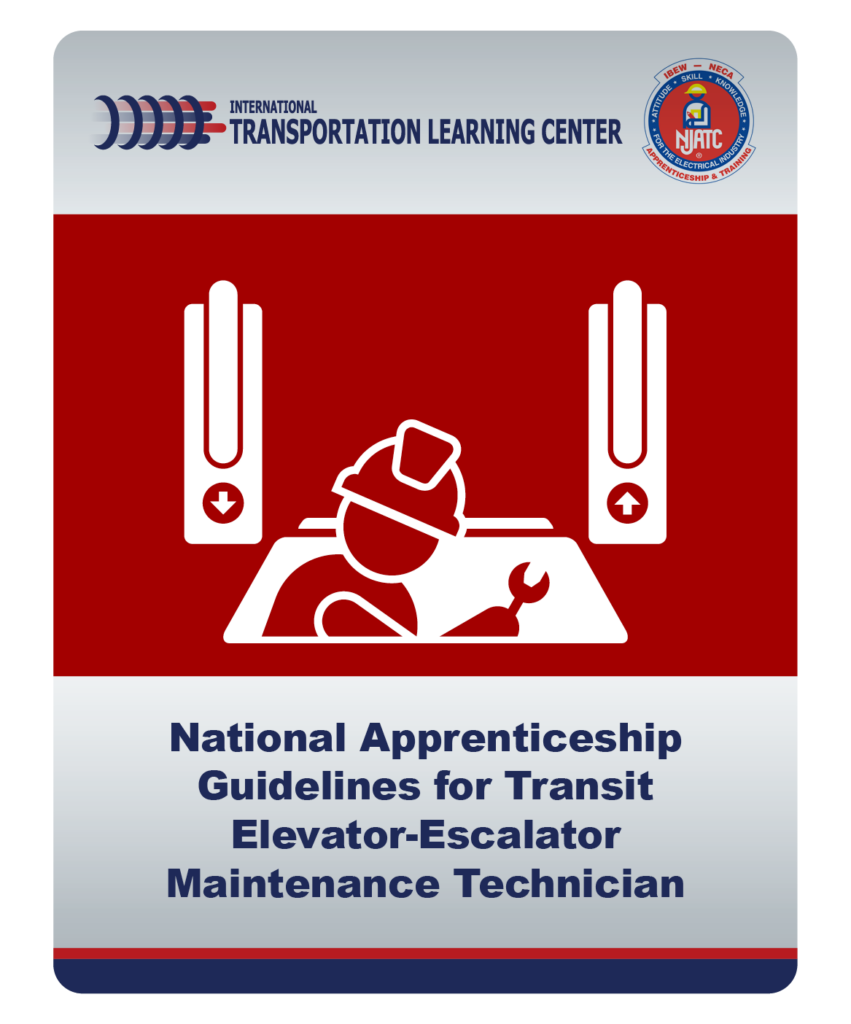
National Apprenticeship Guidelines for Transit Elevator-Escalator Maintenance Technician
The purpose of these National Guidelines for Apprenticeship Standards (National Guideline Standards) is to provide policy and guidance to local Sponsors in developing these Standards for Apprenticeship for local approval and registration. These National Guideline Standards developed by the Sponsor are certified by the U. S. Department of Labor, Office of Apprenticeship as substantially conforming to the requirements of Title 29, CFR parts 29 and 30. State Apprenticeship Agencies recognized by the Office of Apprenticeship to register local programs, and/or local laws and regulations, may impose additional requirements that must be addressed in the local apprenticeship standards.
International Transportation Learning Center & National Joint Apprenticeship and Training Committee (NJATC)
January 2014
TOPICS: Apprenticeship , Policy and Planning , Training
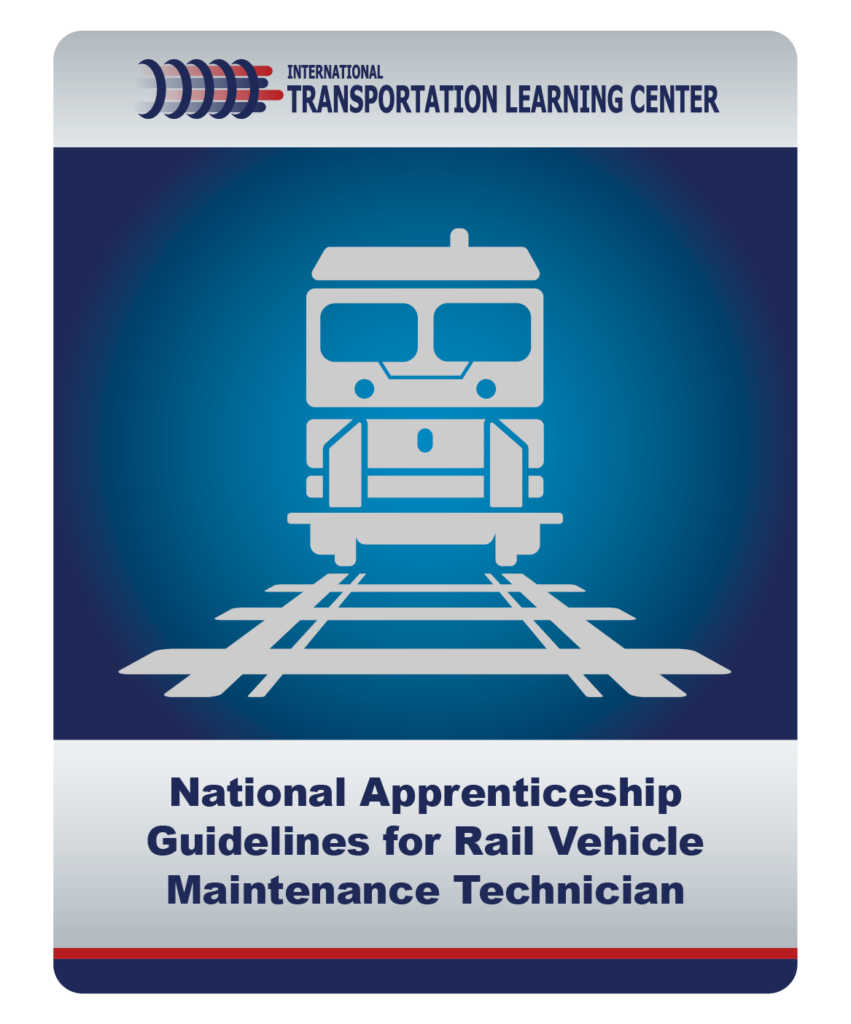
National Apprenticeship Guidelines for Rail Vehicle Maintenance Technicians
The purpose of these National Guidelines for Apprenticeship Standards (National Guideline Standards) is to provide policy and guidance to local Sponsors in developing Standards for Apprenticeship for local approval and registration. These National Guideline Standards developed by the Sponsor are certified by the U. S. Department of Labor, Office of Apprenticeship as substantially conforming to the requirements of Title 29, CFR parts 29 and 30. State Apprenticeship Agencies recognized by the Office of Apprenticeship to register local programs, and/or local laws and regulations, may impose additional requirements that must be addressed in the local apprenticeship standards.
International Transportation Learning Center; National Rail Car Training Committee
June 2013
TOPICS: Apprenticeship , Training
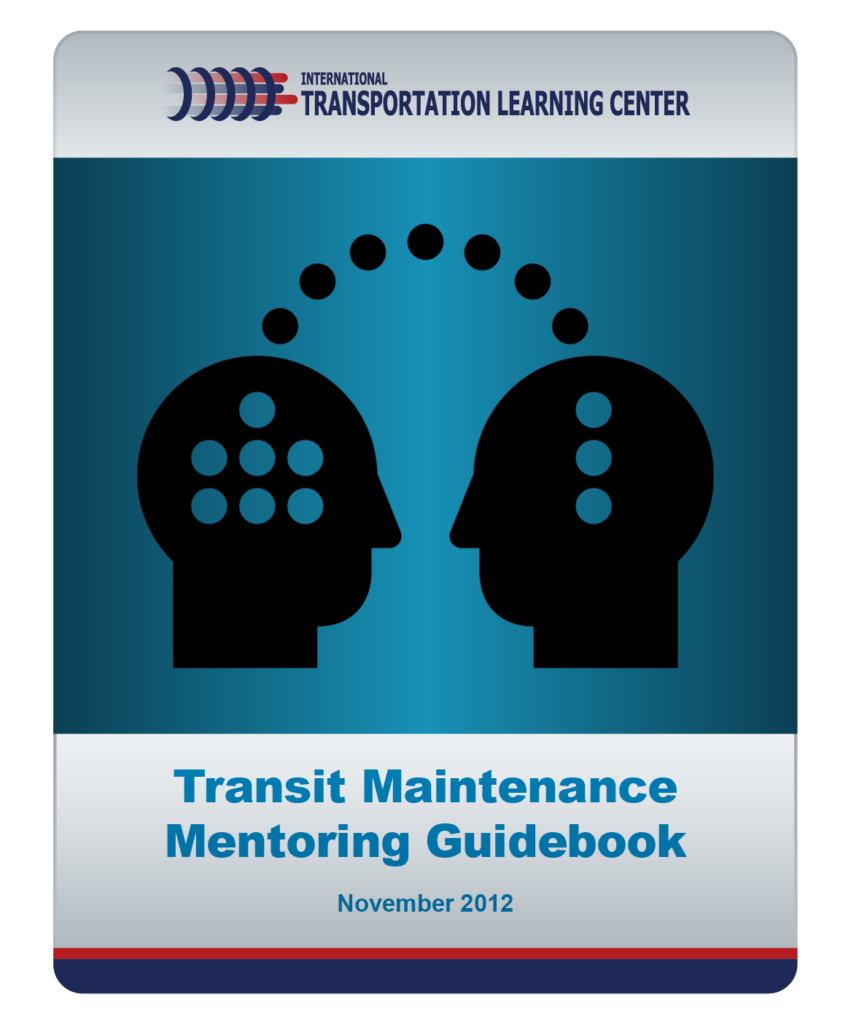
Transit Maintenance Mentoring Guidebook
The purpose of this report is to serve as a guidebook, offering information that transit agencies can use to establish mentoring as a training method with guidance, suggestions, and examples to implement or expand upon existing mentoring programs. It is based on a generic mentoring guidebook developed by the USDOT, modified and enhanced to reflect transit maintenance applications.
International Transportation Learning Center
November 2012
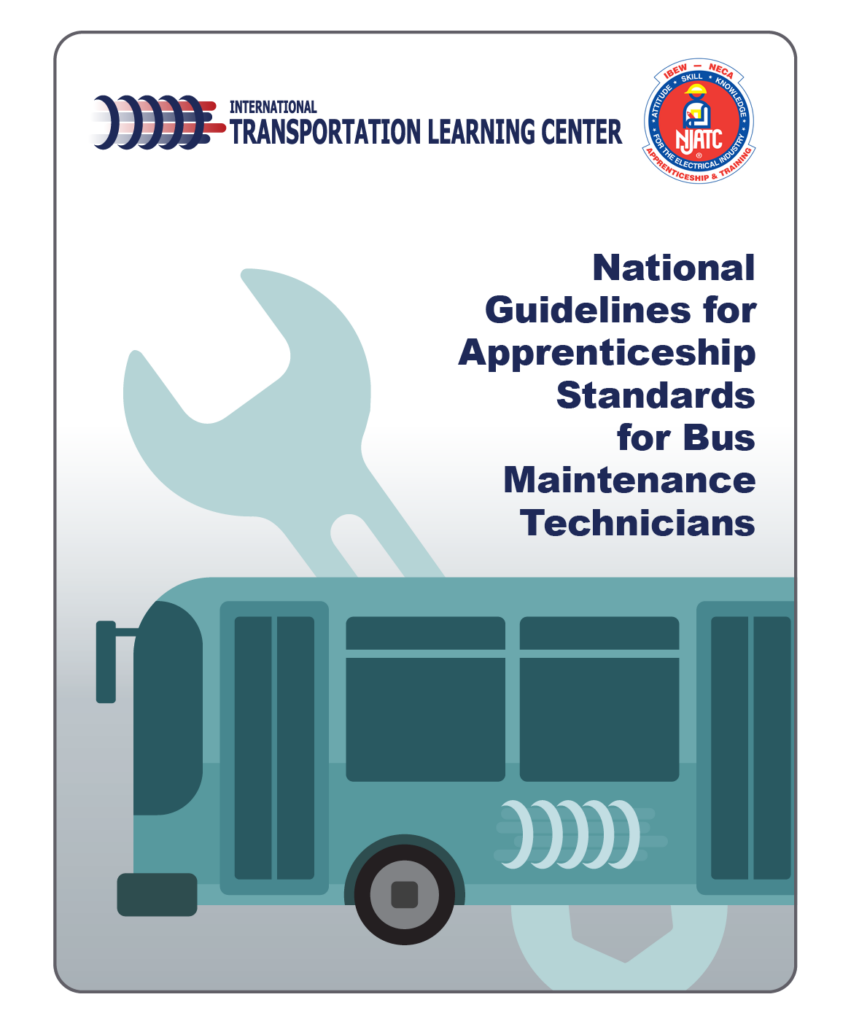
National Guidelines for Apprenticeship Standards for Bus Maintenance Technicians
These National Joint Apprenticeship and Training Committee (NJATC) Apprenticeship Standards have as their objective the training of Bus Maintenance Technicians skilled in all phases of bus maintenance. The NJATC and its affiliated Local Joint Apprenticeship and Training Committees recognize that in order to accomplish this, there must be well-developed on-the-job learning combined with related instruction. This recognition has resulted in the development of these Apprenticeship Standards.
Developed by the Intl. Transportation Learning Center and National Joint Apprenticeship and Training Committee (NJATC) in cooperation with the U.S. Department of Labor, Office of Apprenticeship.
Approved and certified by the U.S. Department of Labor, Office of Apprenticeship on 8/25/2010.
International Transportation Learning Center & National Joint Apprenticeship and Training Committee (NJATC)
August 2010
TOPICS: Apprenticeship , Labor-Management Partnerships , Low-No , Training
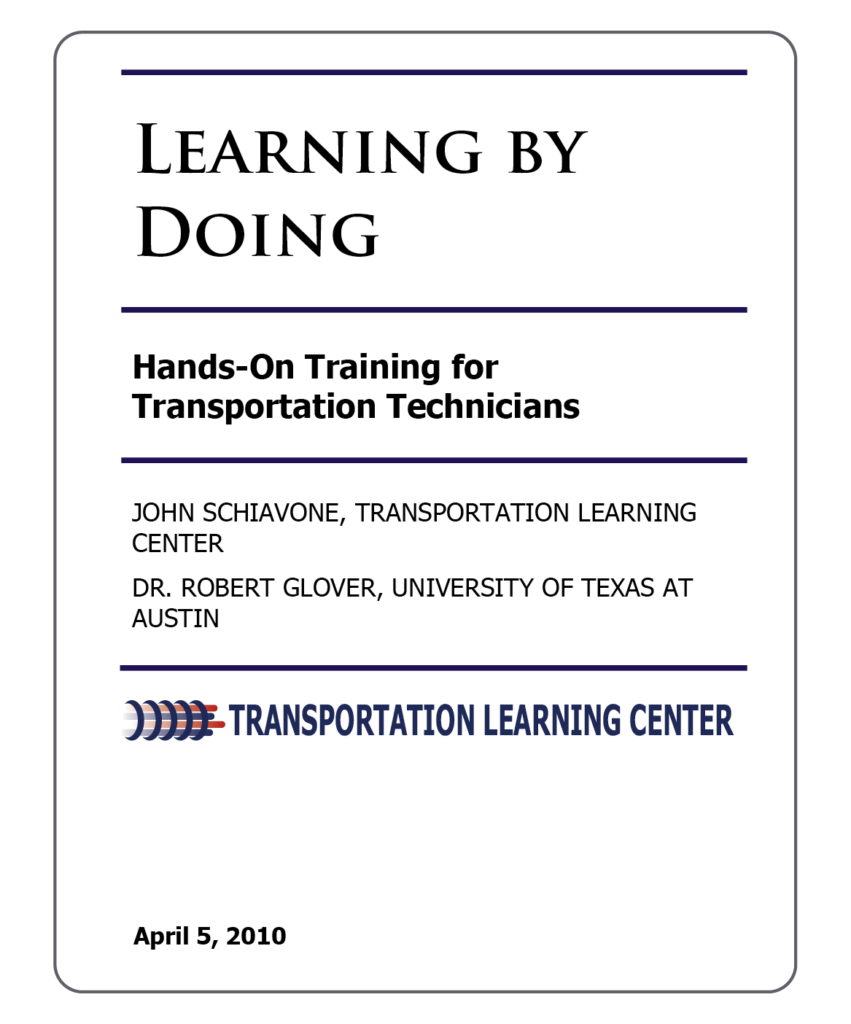
Learning by Doing: Hands-On Training for Transportation Technicians
Today, formal training is absolutely essential to produce technicians capable of providing safe, efficient and cost-effective transport services. The consequences of jeopardizing passenger and public safety are just too great to turn inexperienced workers loose on advanced transit vehicles without proper training, hoping they will learn “as they go.” The question becomes how best to construct an effective training program.
This paper, from the International Transportation Learning Center, examines the subject of technical training and advocates “learning by doing” as an essential element to acquiring needed technical knowledge and skills. It stands to reason that someone attracted to becoming a technician is interested in working with their hands. Training, therefore, should make use of that natural inclination and engage students in hands-on activities throughout the entire learning process.
International Transportation Learning Center
April 2010
TOPICS: Apprenticeship , Training
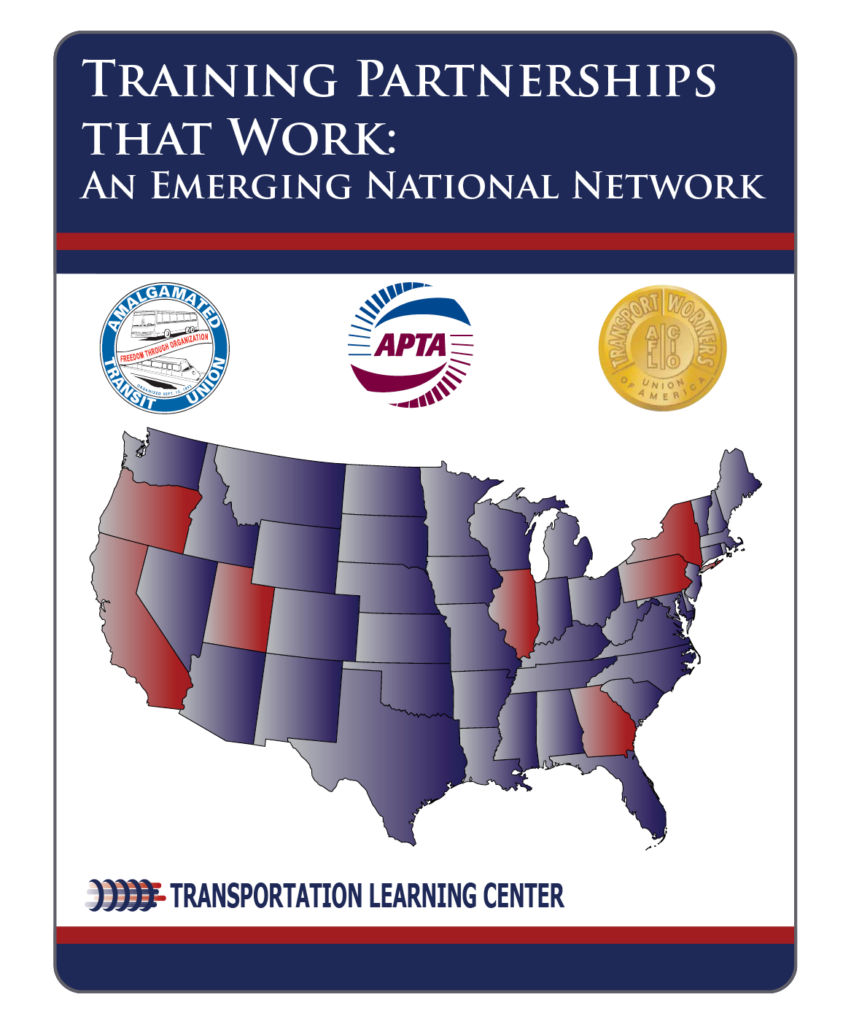
Training Partnerships That Work: An Emerging National Network
Training Partnerships That Work provides vivid summaries of successful labor-management training partnerships at sites across the country. The cases included here represent unique training partnerships. Most importantly, they illustrate how labor and management can work together successfully on issues of training, and provide valuable lessons for other industries facing the problem of retiring baby boomers and inadequate capacity to train replacement workers.
International Transportation Learning Center
February 2010
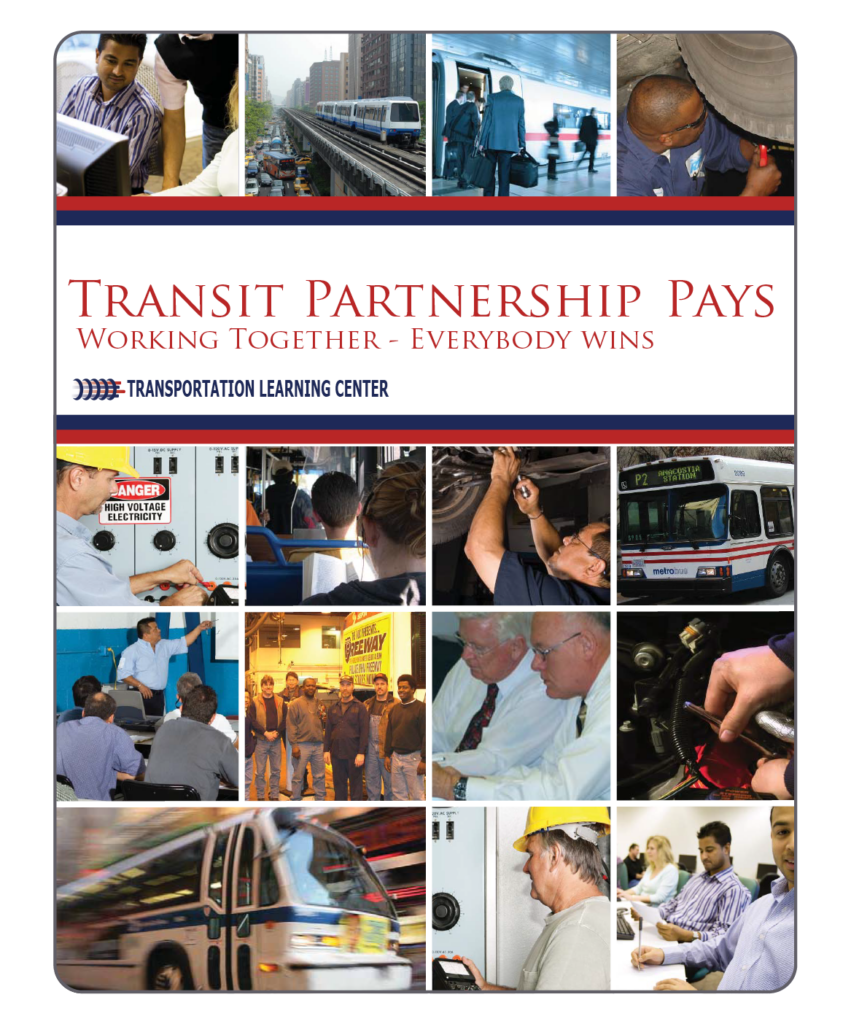
Transit Partnership Pays: Working Together – Everybody Wins
This report highlights the evidence that the most successful, cost efficient and durable training systems come from industry based labor-management partnerships.
International Transportation Learning Center
September 2009
TOPICS: Apprenticeship , Labor-Management Partnerships
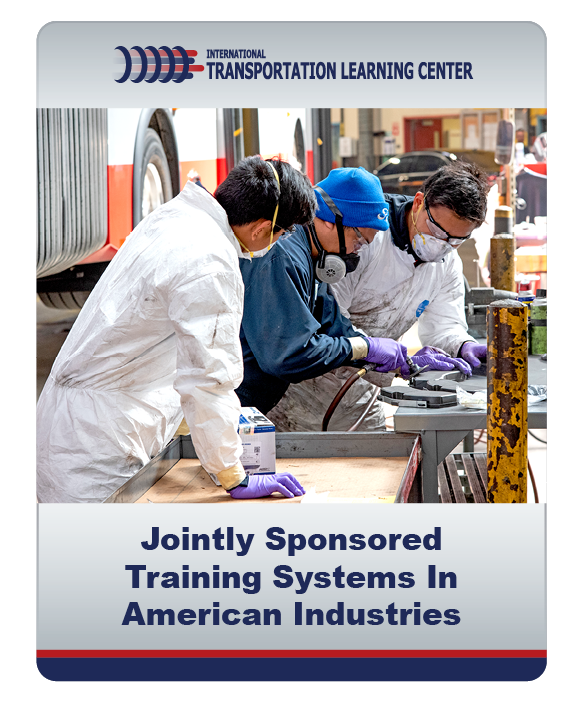
Jointly Sponsored Training Systems In American Industries
This paper examines recent developments in credentialing in jointly sponsored training and qualifications systems across the United States. This paper builds on previous work on building trades joint apprenticeship and training programs, describes their structure and activities, and documents their superior performance.
Written in collaboration with Robert W. Glover, the University of Texas at Austin.
International Transportation Learning Center
February 2009
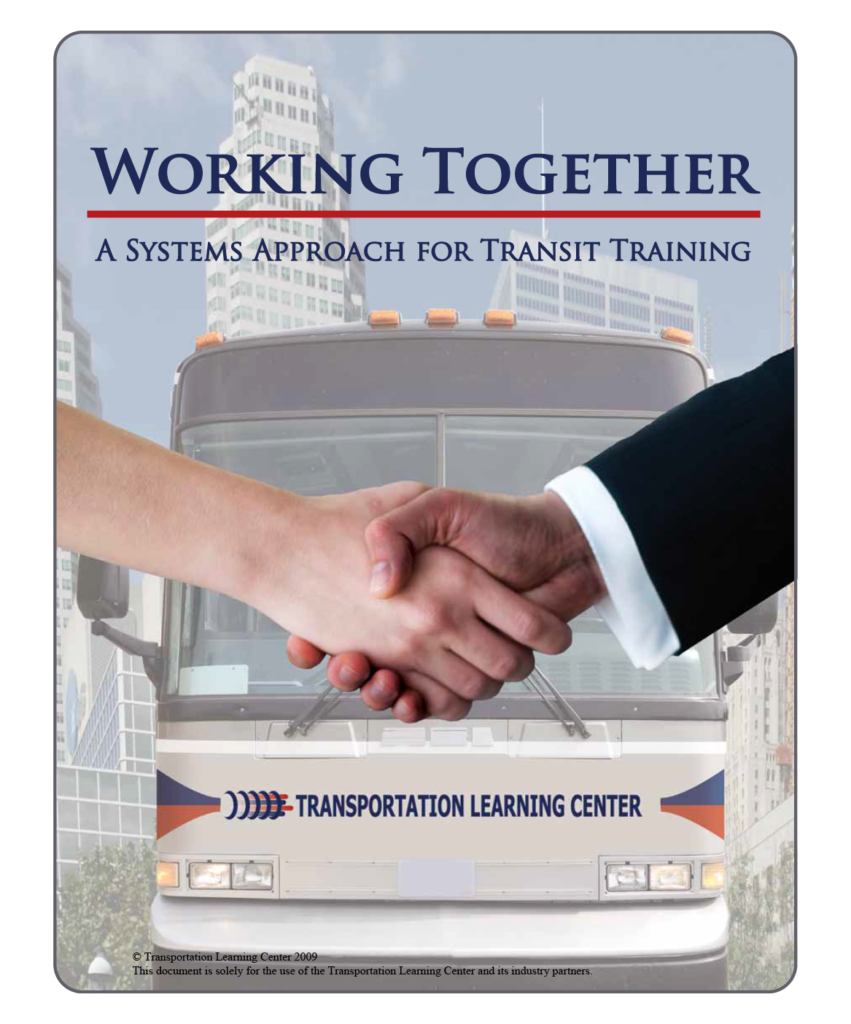
Working Together: A Systems Approach for Transit Training
Transit faces a critical skills challenge driven by changing technologies, shifting workforce demographics and record-breaking growth in ridership. Working Together: A Systems Approach for Transit Training outlines how constructive training partnerships provide the most effective way for the transit industry to address its skill challenges.
International Transportation Learning Center
January 2009
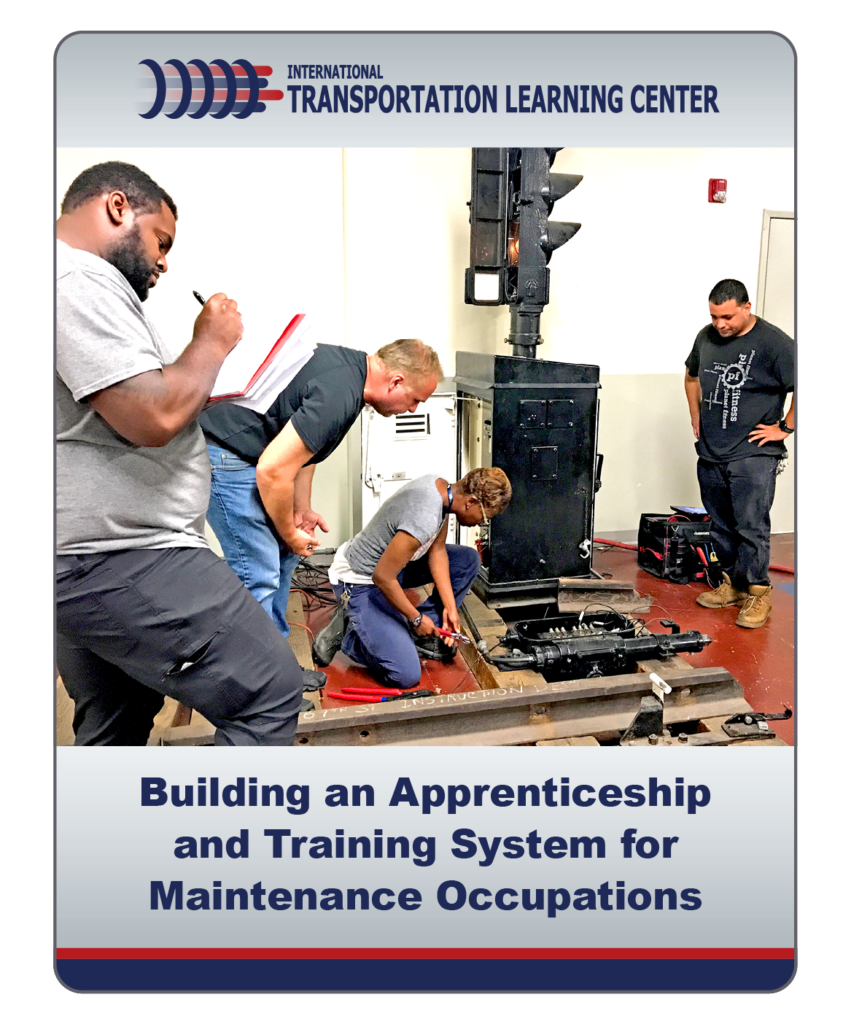
Building an Apprenticeship and Training System for Maintenance Occupations
This article discusses the joint training and apprenticeship system emerging in maintenance occupations in the American transit industry, as well as related challenges and strategies to overcome them. The article reports on early results, including efforts to develop a consensus national framework for apprenticeship and training in transit maintenance.
Written with Robert W. Glover, the University of Texas at Austin.
International Transportation Learning Center
January 2009
TOPICS: Apprenticeship , Career Pathways , Training
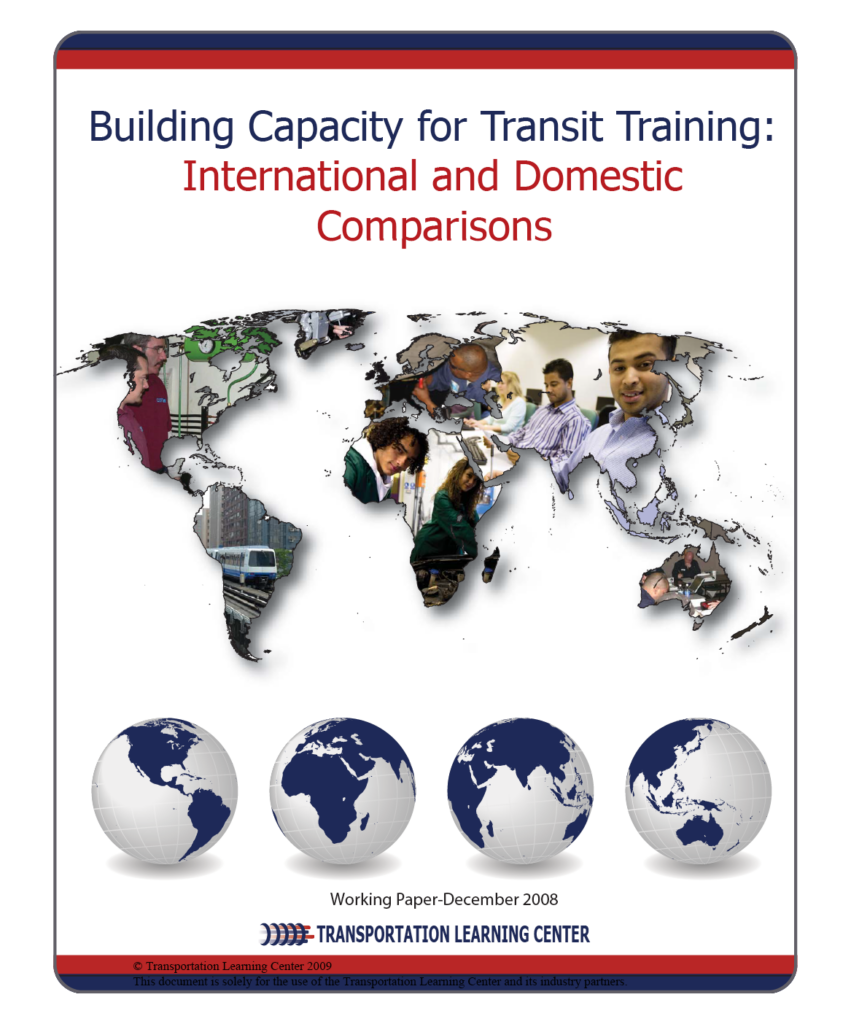
Building Capacity for Transit Training: International and Domestic Comparisons
This working paper provides an overview of the findings from research on strong industry-wide workforce development systems in six other countries and in several US industries. It identifies key features that could be adapted for use to create more effective US transit training.
International Transportation Learning Center
December 2008
TOPICS: Apprenticeship , Program Evaluation and ROI , Training
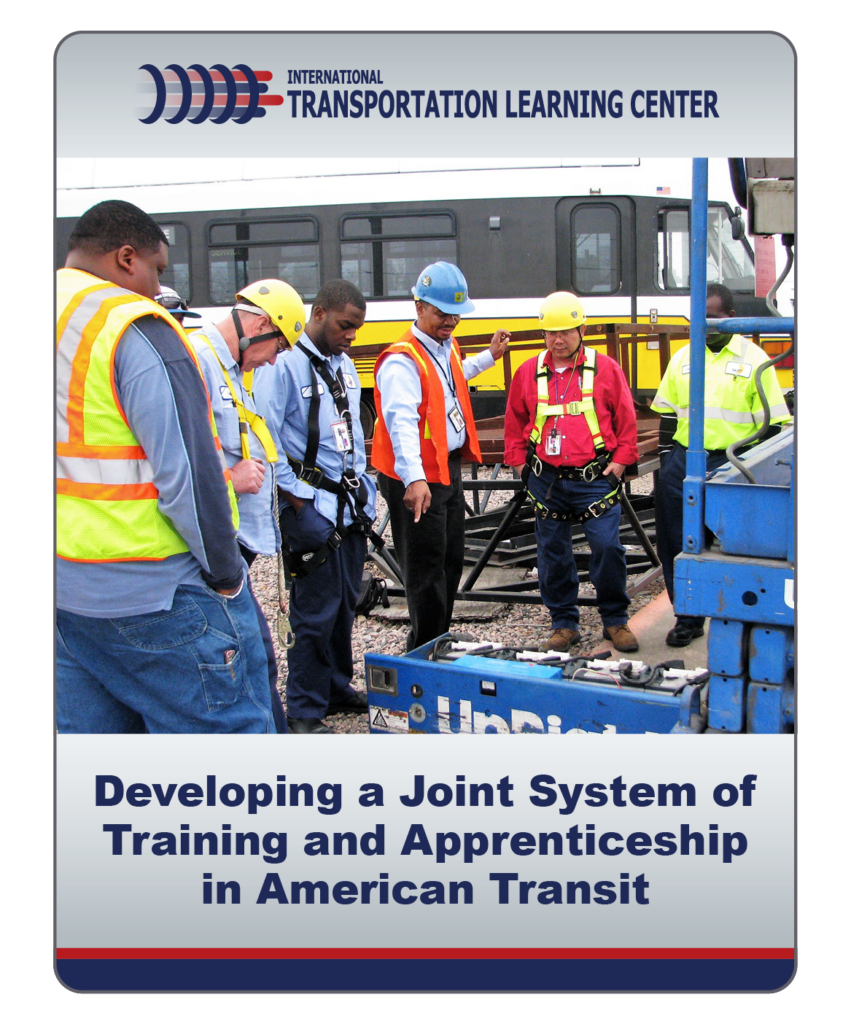
Developing a Joint System of Training and Apprenticeship in American Transit
This paper reviews training innovations and lessons that may be applicable to the transit industry from practices used in other industries. It draws on a rich body of experience of joint apprenticeship and training programs, as well as employer-sponsored training.
Prepared with Robert W. Glover, the University of Texas at Austin.
International Transportation Learning Center
September 2007
TOPICS: Apprenticeship , Policy and Planning , Training
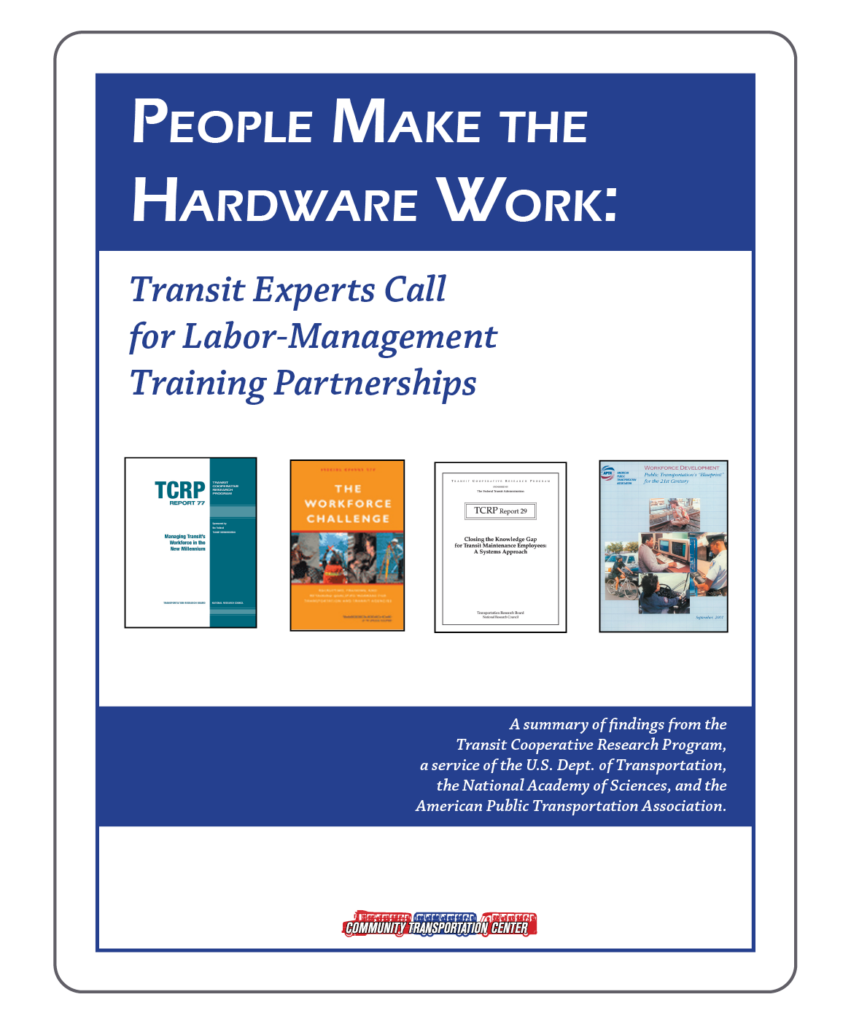
People Make the Hardware Work: Transit Experts Call for Labor-Management Training Partnerships
This short toolkit outlines five tools for success in labor-management training partnerships:
- Unions as Partners
- A Joint Training Strategy
- Empowering the Workforce
- Cultivating a Learning Organization
- Reaching High Performance
International Transportation Learning Center; Transit Cooperative Research Program
March 2007
TOPICS: Apprenticeship , Labor-Management Partnerships , Training
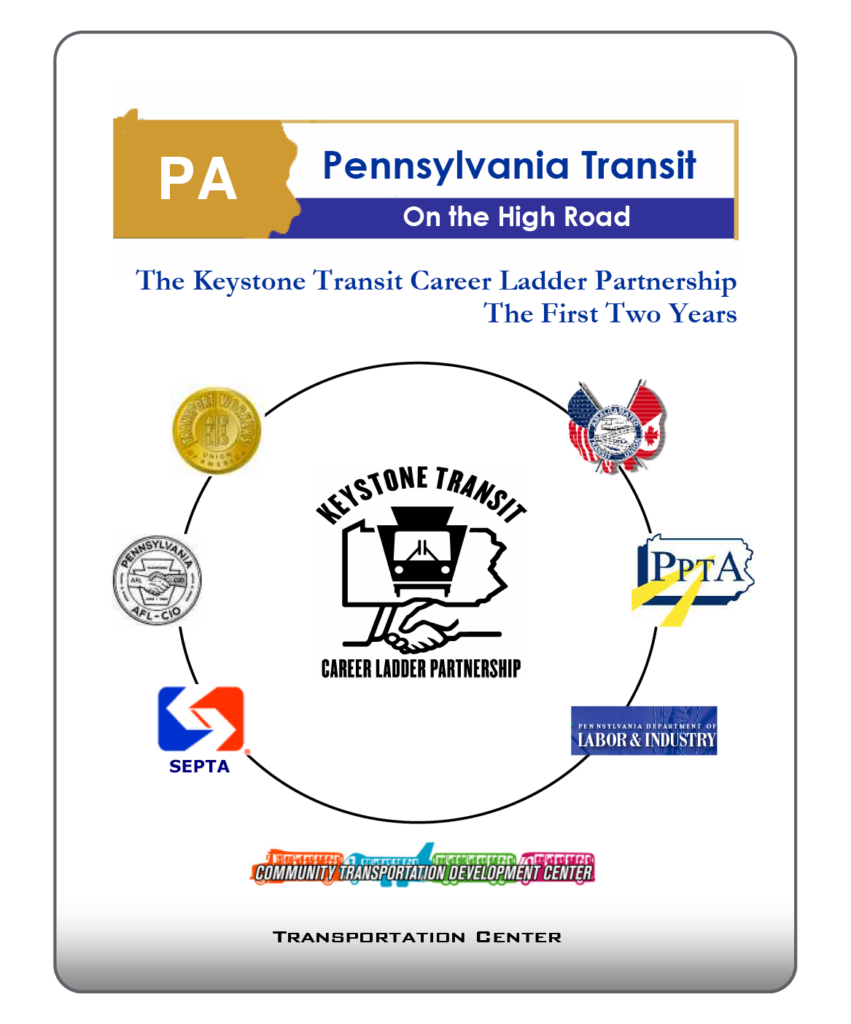
Pennsylvania Transit on the High Road
This report is part of a larger case study that chronicles the development of the Keystone Transit Career Ladder Partnership, including the process of job task/work task analysis, skills gap analysis, and data-driven training development.
International Transportation Learning Center
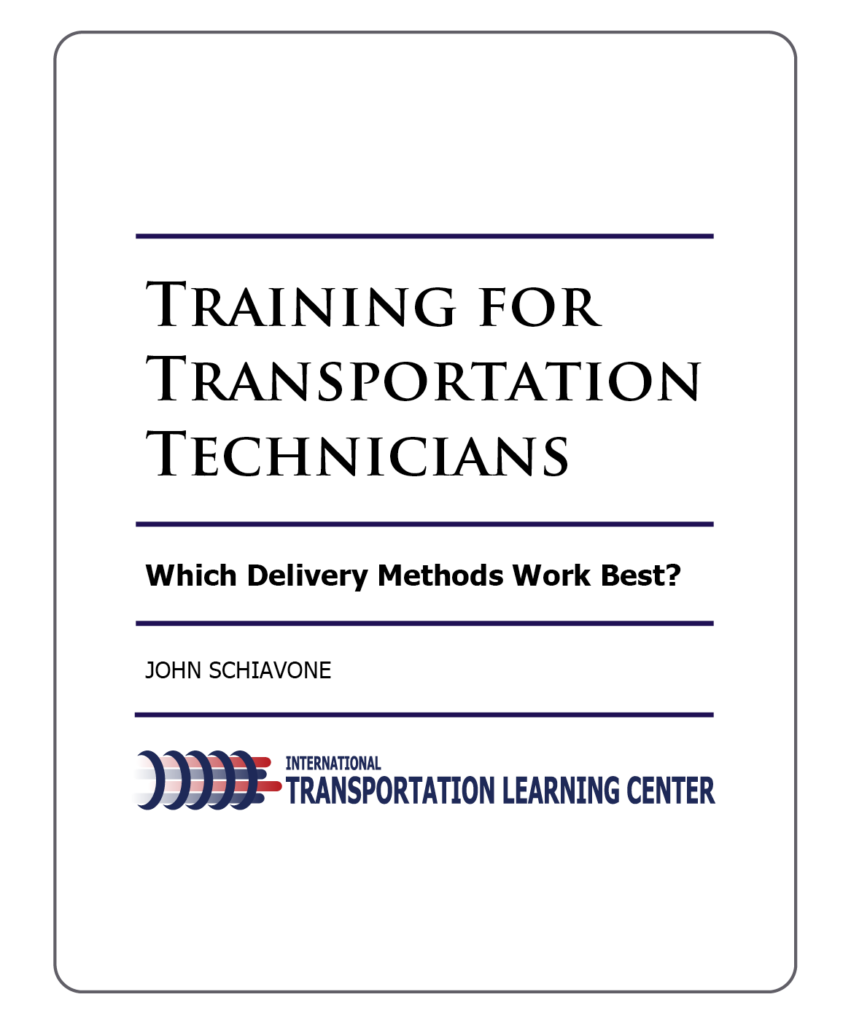
Training for Transportation Technicians: Which Delivery Methods Work Best?
This paper explores what is the most effective way to train transportation technicians. It proposes a blended approach combining classroom time with interactive hands-on demonstrations, followed by structured on-the-job training (OJT) and mentoring.
International Transportation Learning Center
TOPICS: Apprenticeship , Career Pathways , Mentorship , Training
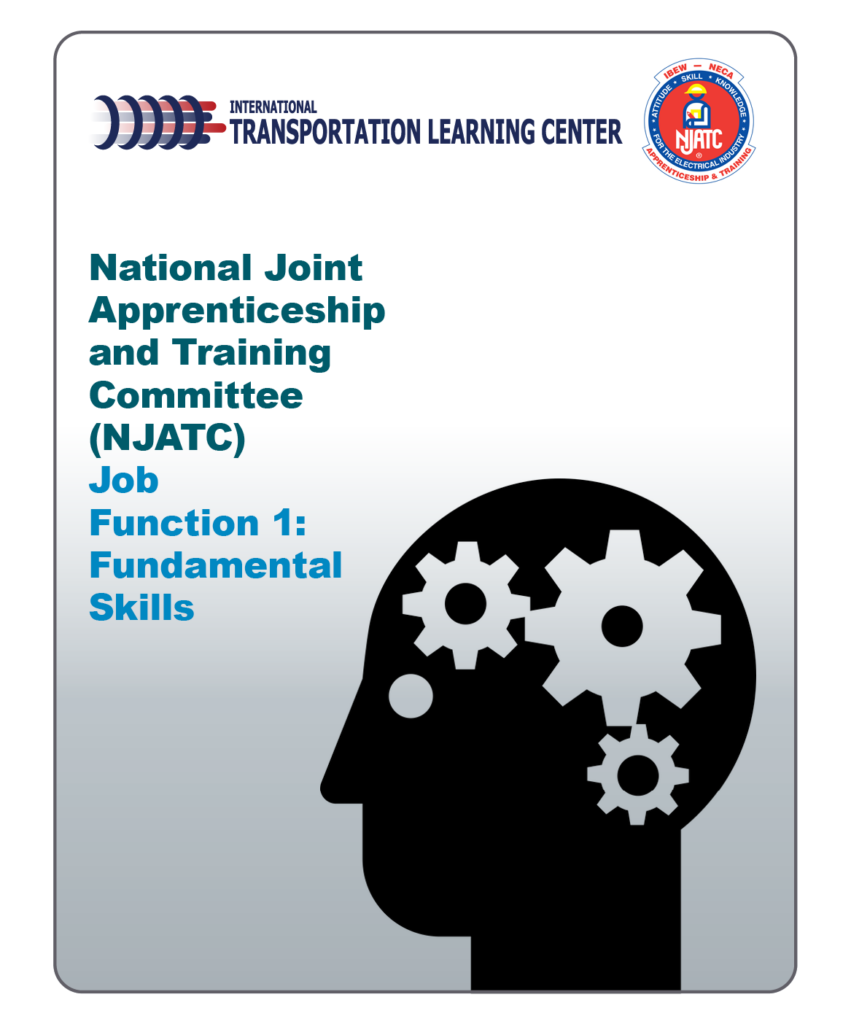
Matrix of Training Materials for Fundamental Bus Maintenance Skills
This matrix of training materials describes resources available to members of the National Joint Apprenticeship and Training Committee (NJATC) through other Committee members and from third-party resources. This document refers to JOB FUNCTION 1: FUNDAMENTAL SKILLS of the Department of Labor Apprenticeship Framework for Bus Maintenance (developed by the ITLC).
Interested parties should contact the provider of each resource directly. Some resources may not currently be available.
National Joint Apprenticeship and Training Committee; International Transportation Learning Center
TOPICS: Apprenticeship , Training
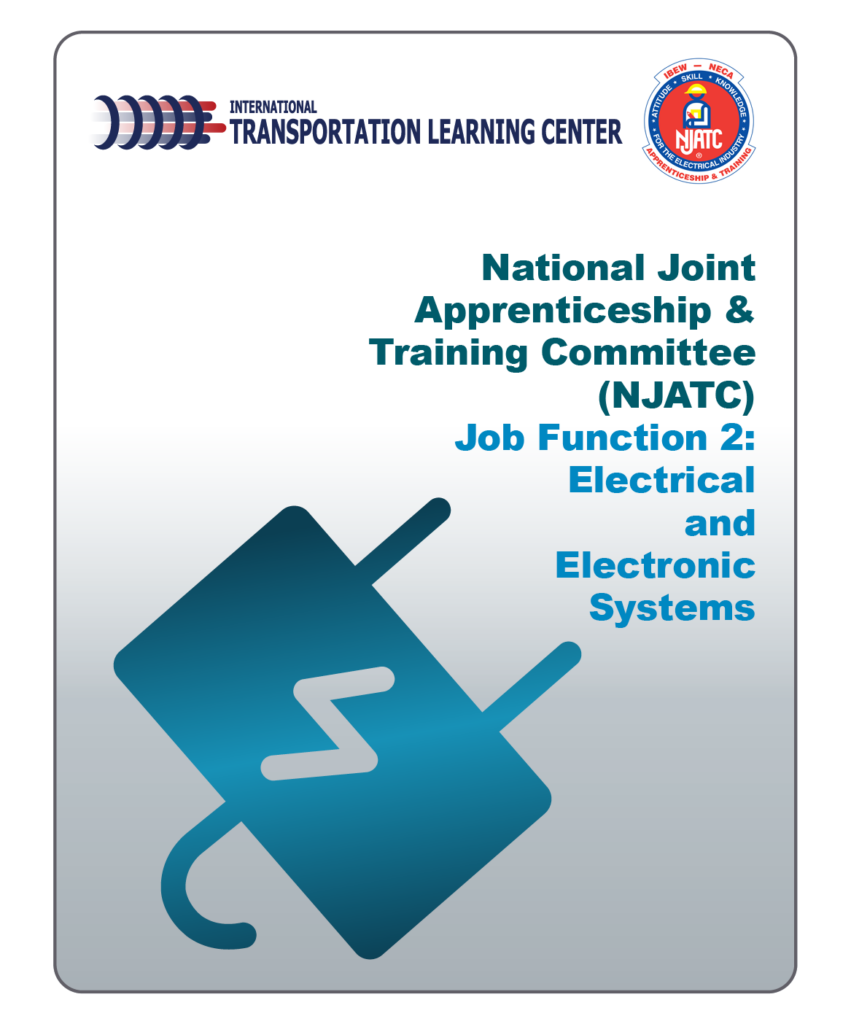
Matrix of Training Materials for Fundamental Electrical/ Electronic Systems Skills
This matrix of training materials describes resources available to members of the National Joint Apprenticeship and Training Committee (NJATC) through other Committee members and from third-party resources. This document refers to JOB FUNCTION 2: Electrical and Electronic Systems of the Department of Labor Apprenticeship Framework for Bus Maintenance (developed by the ITLC).
Interested parties should contact the provider of each resource directly. Some resources may not currently be available.
National Joint Apprenticeship and Training Committee; International Transportation Learning Center
TOPICS: Apprenticeship , Training
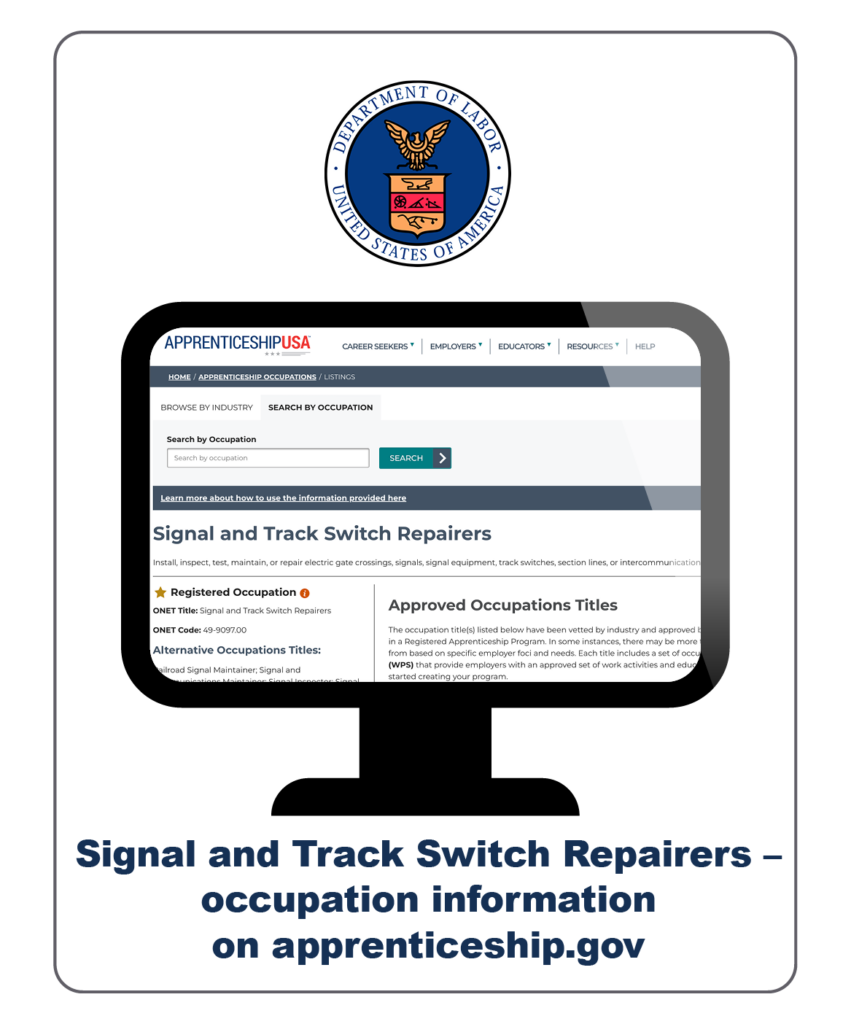
Signal and Track Switch Repairers
This search page on Apprenticeship.gov provides results for approved occupation titles under Signal and Track Switch Repairers, as well as work activities, education, and related occupations.
US Department of Labor
TOPICS: Apprenticeship , Career Pathways








